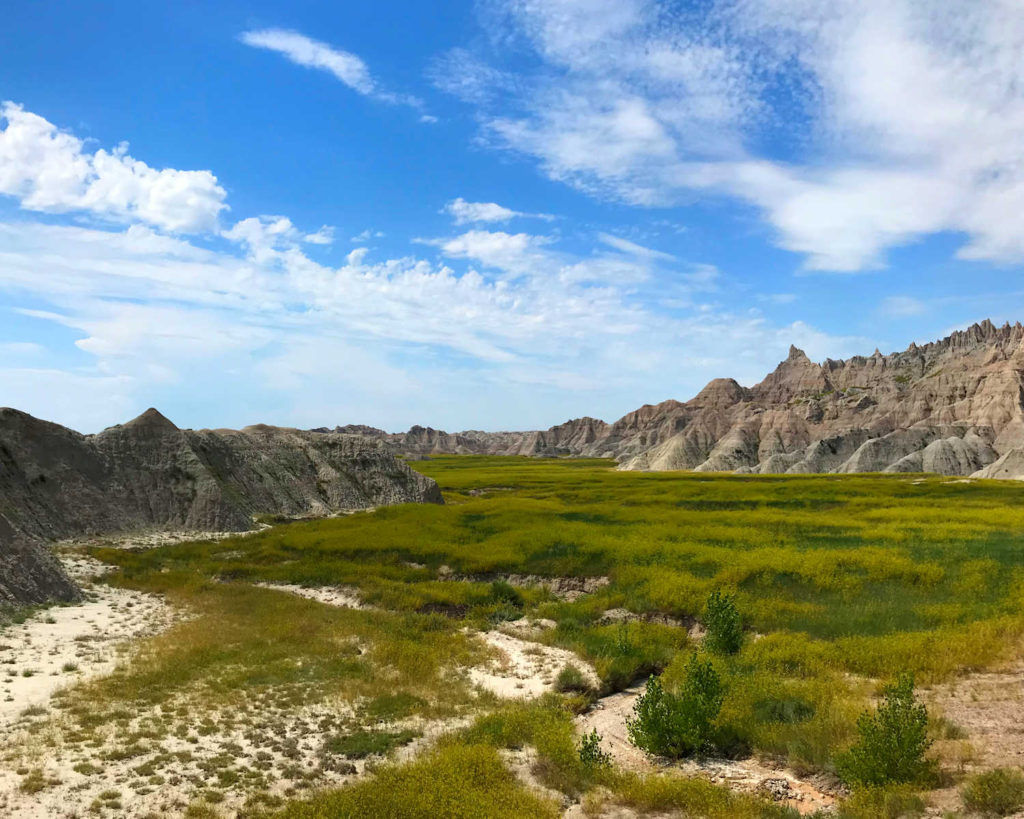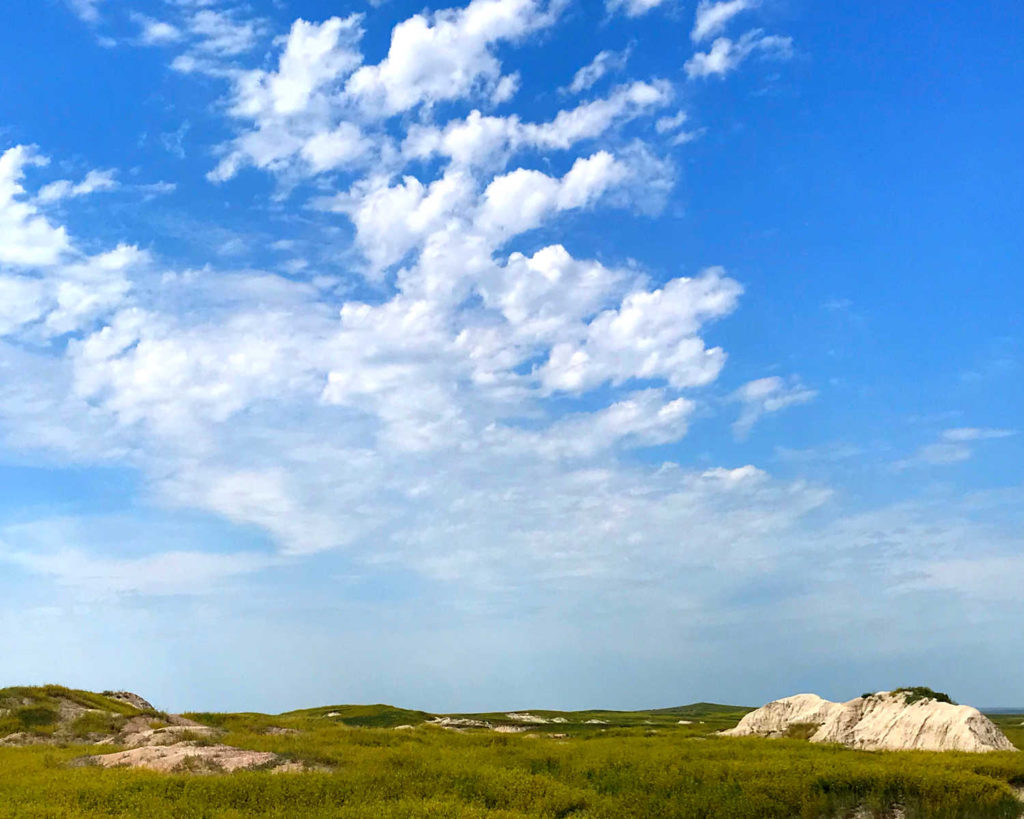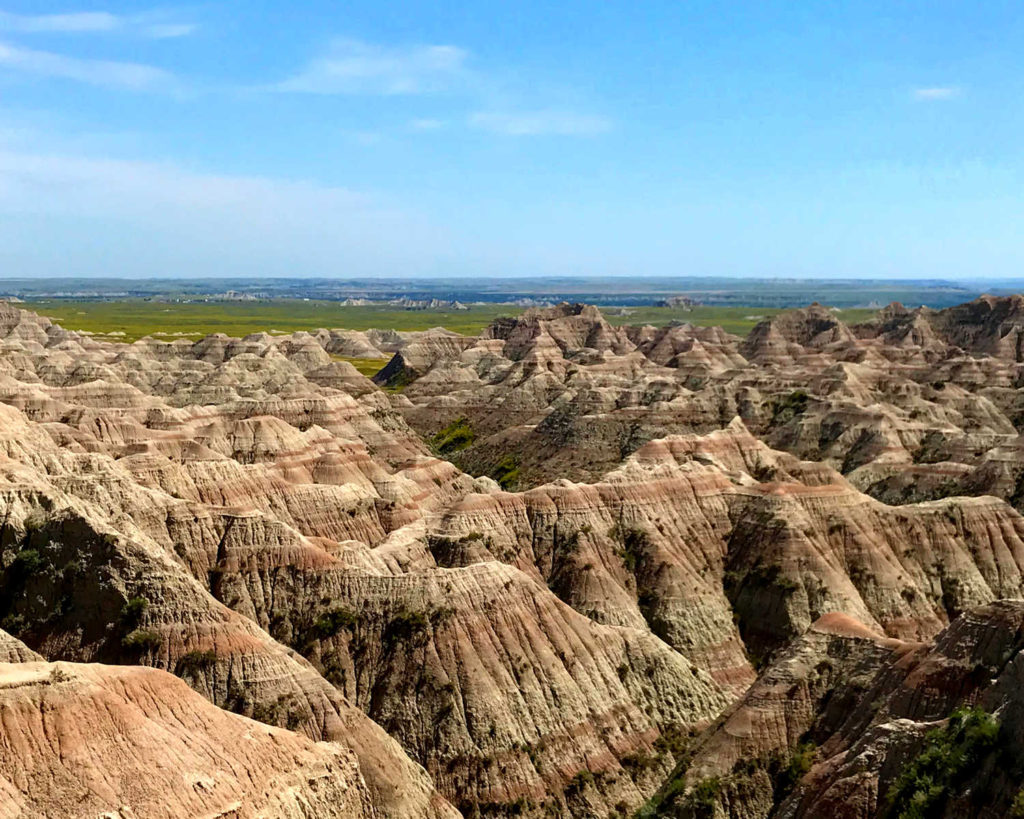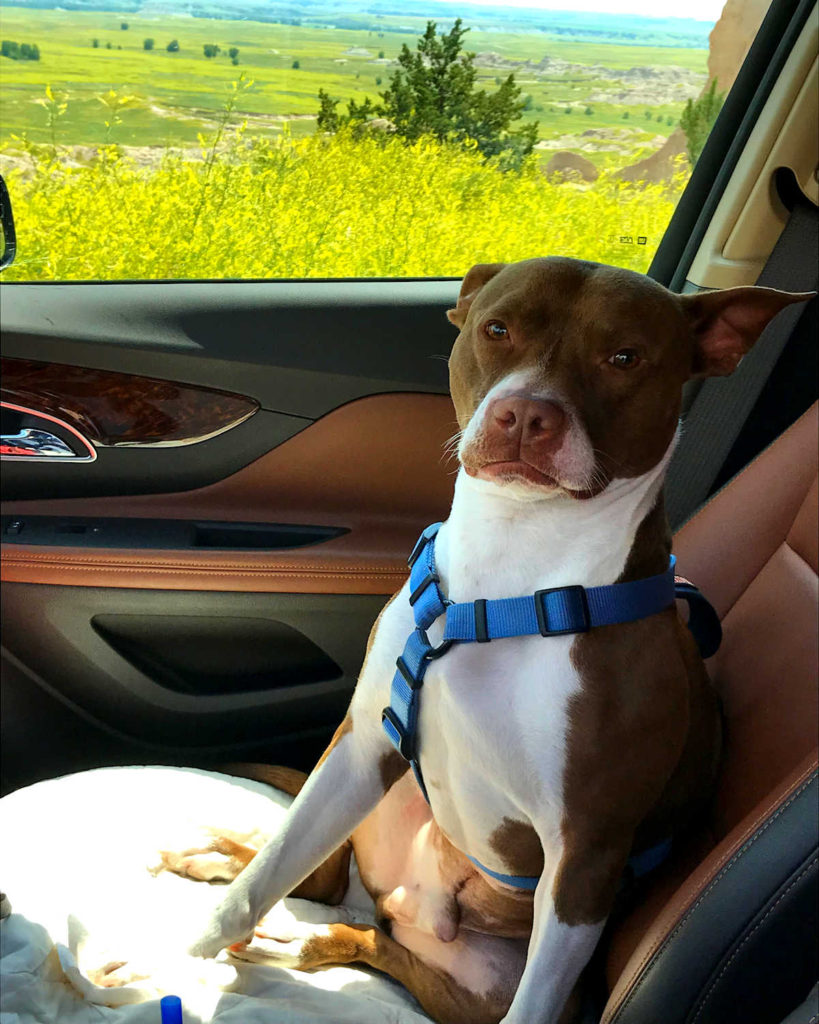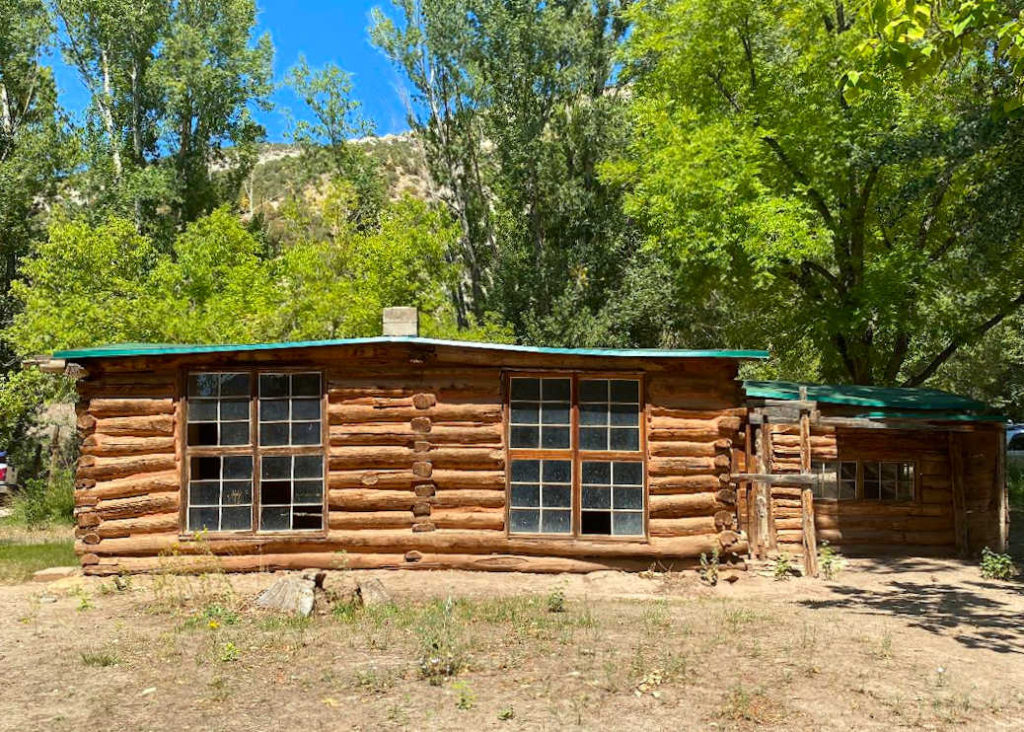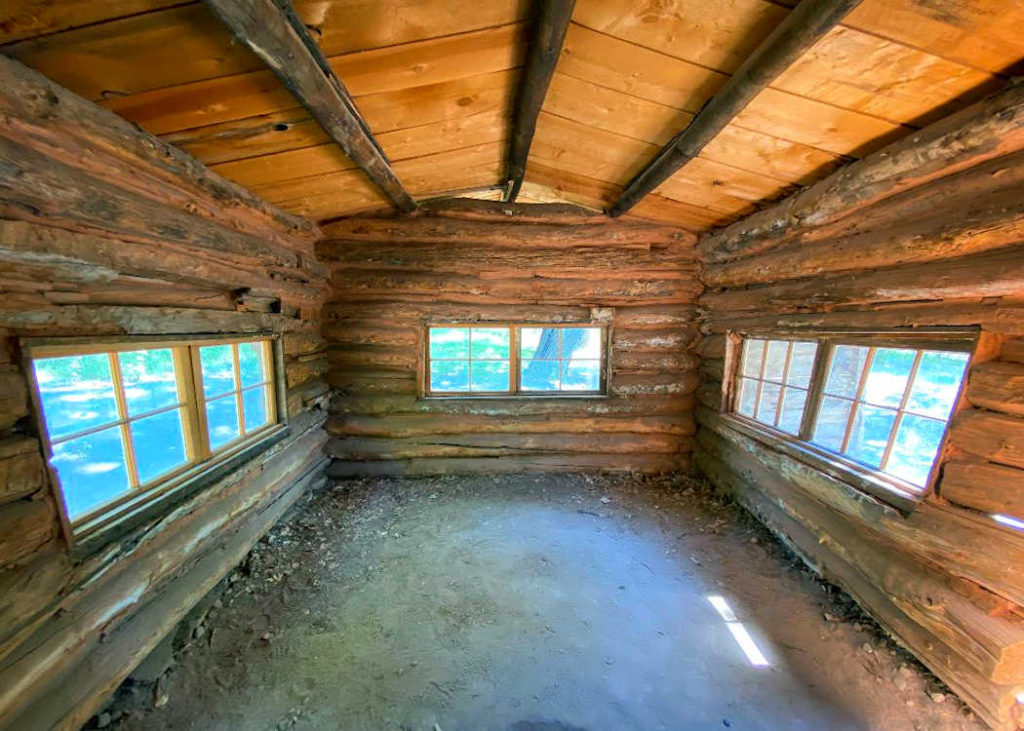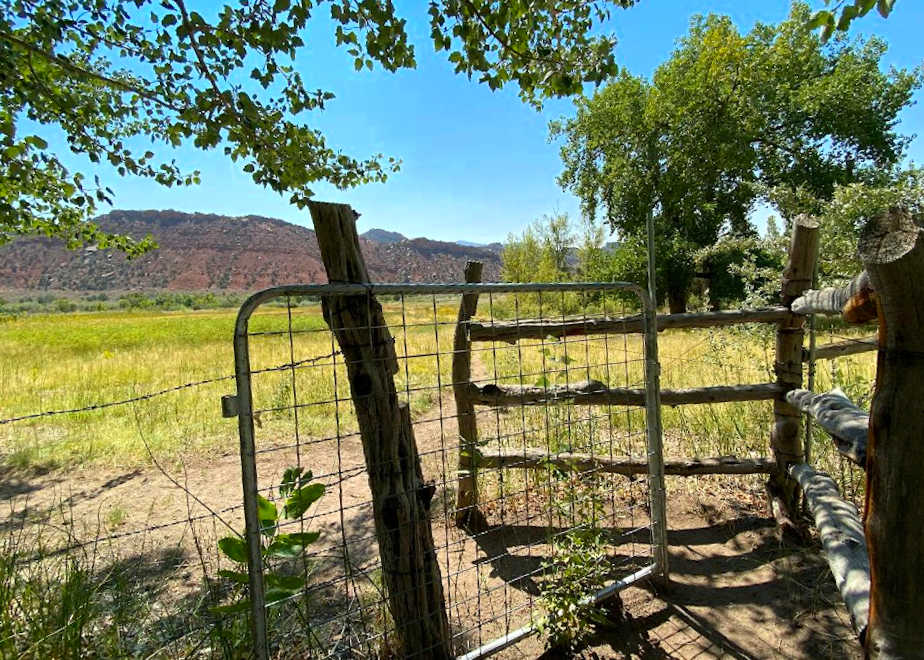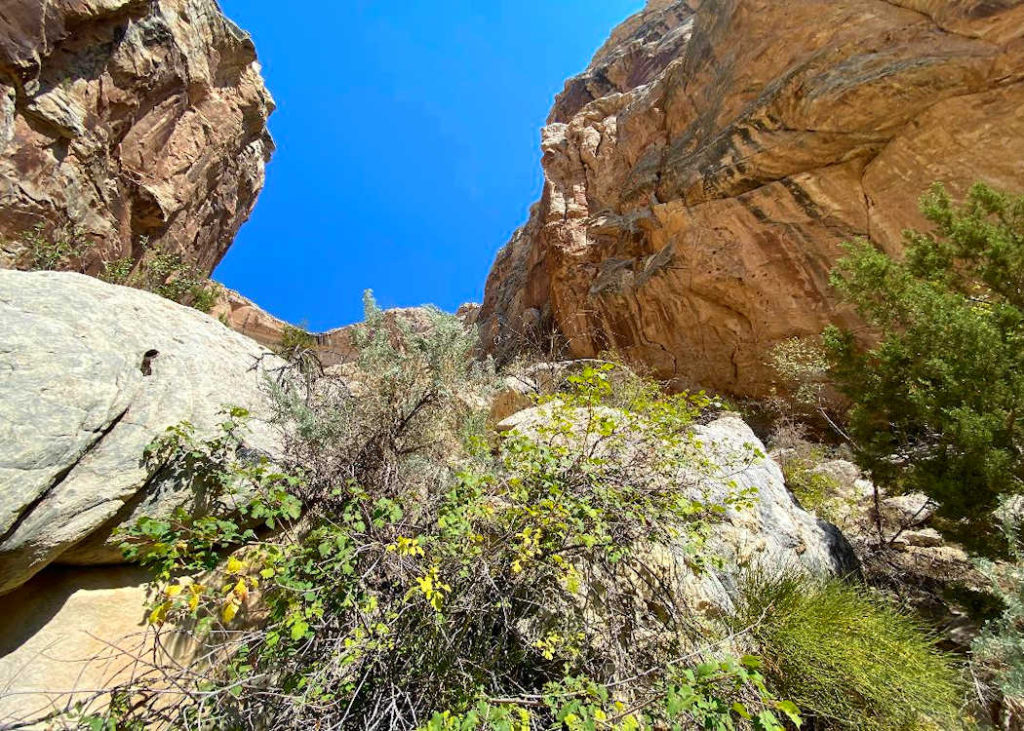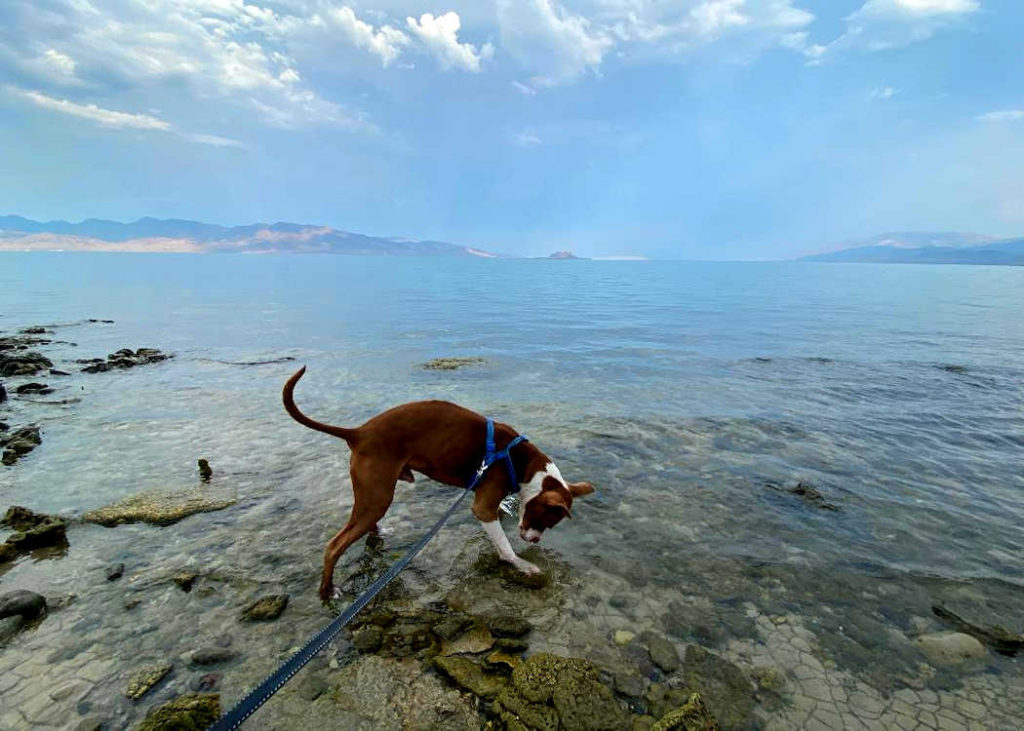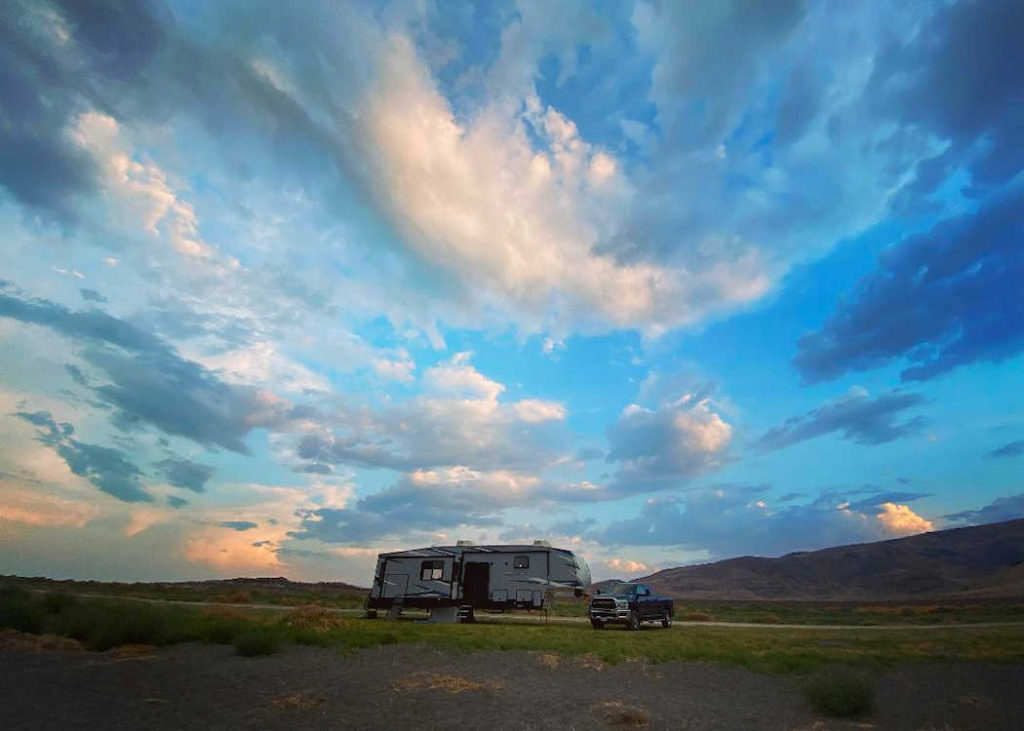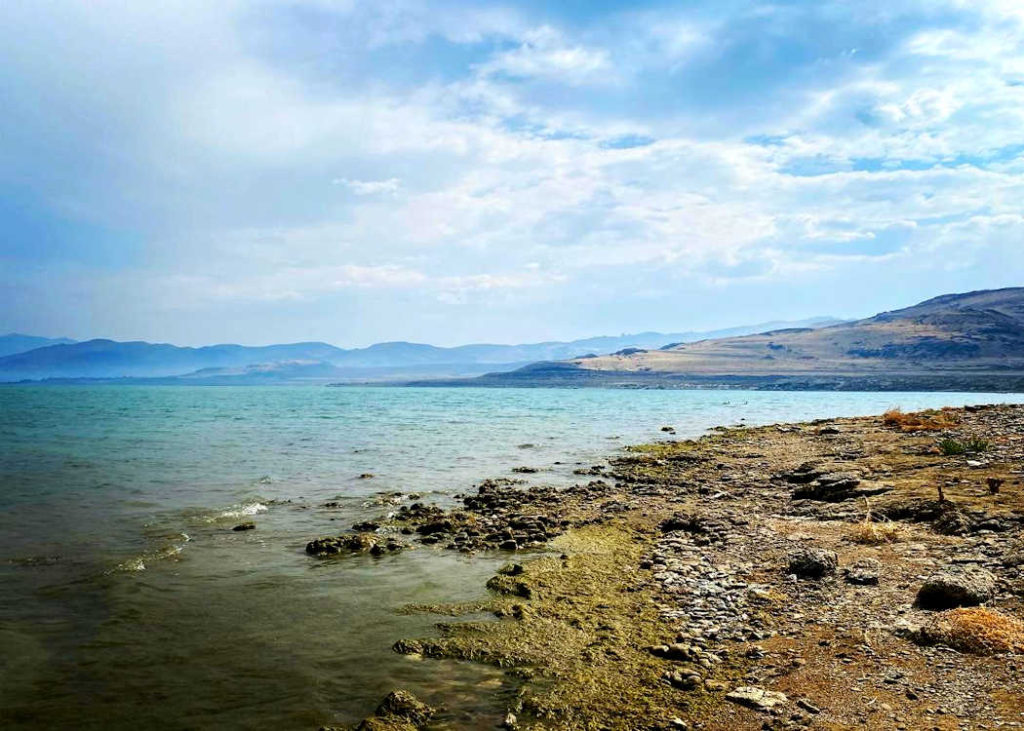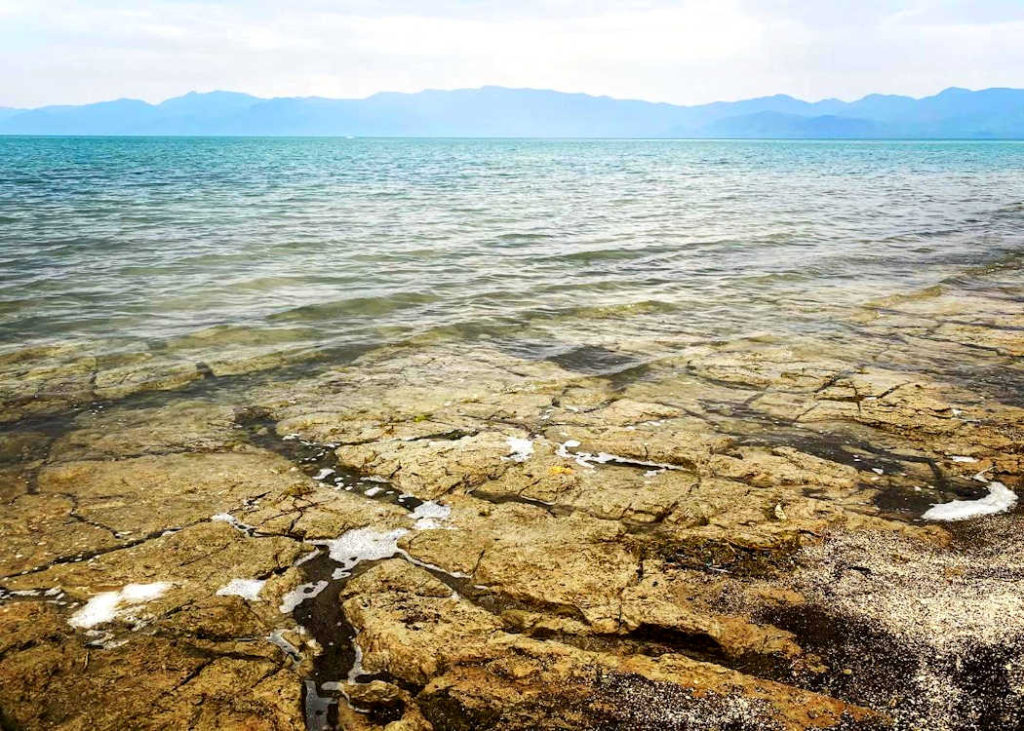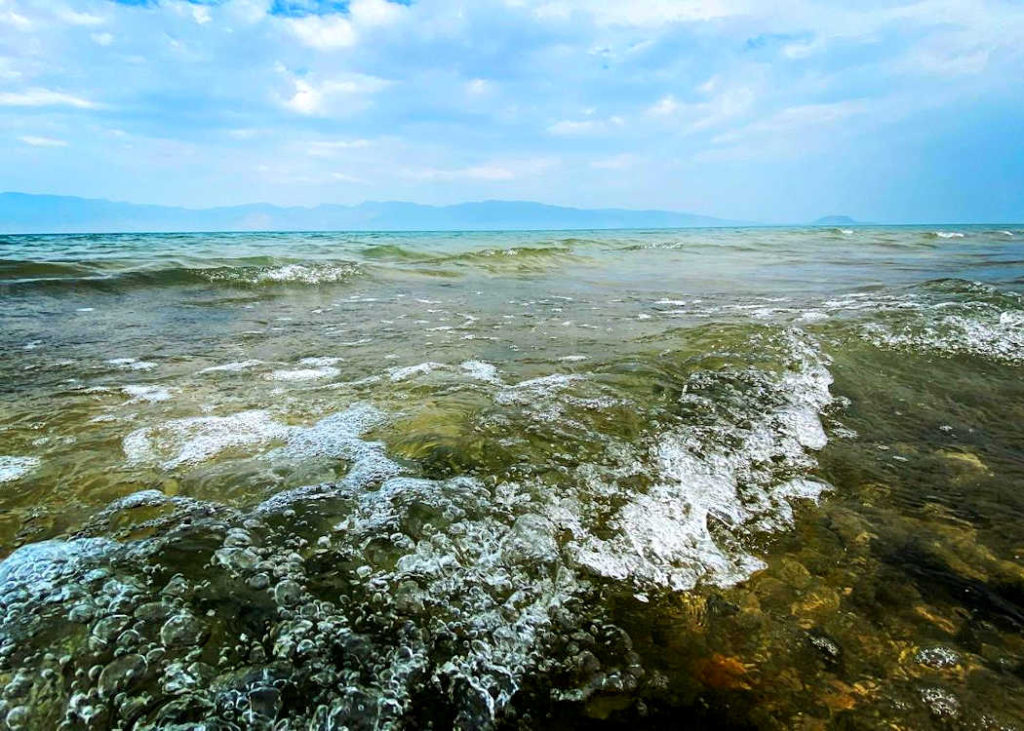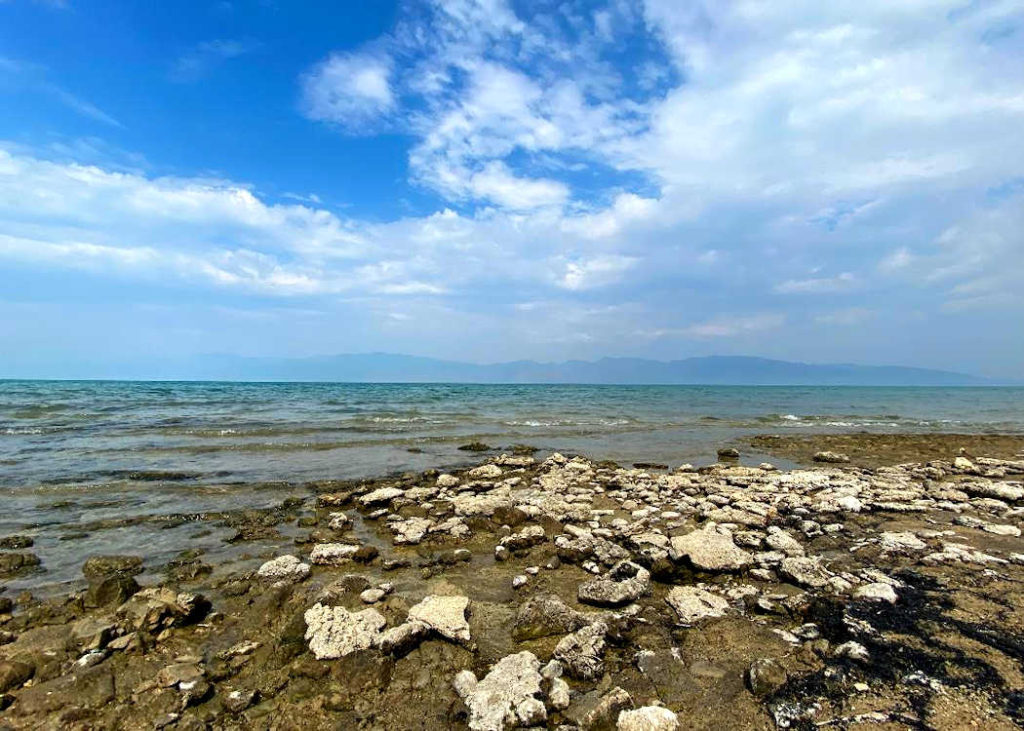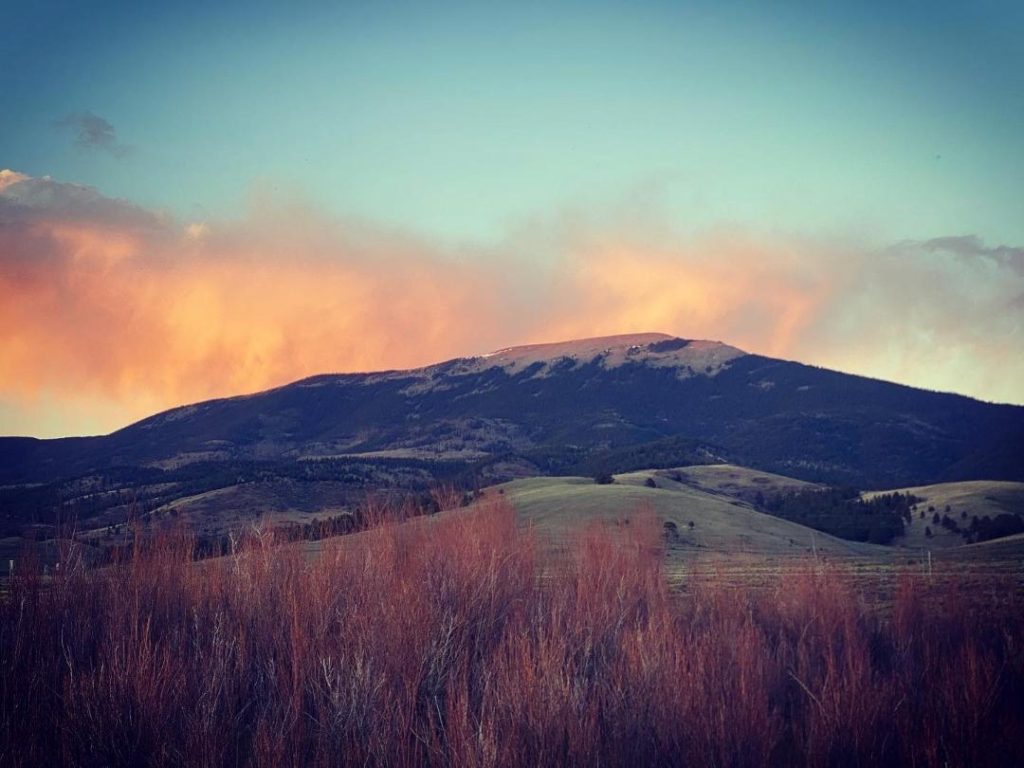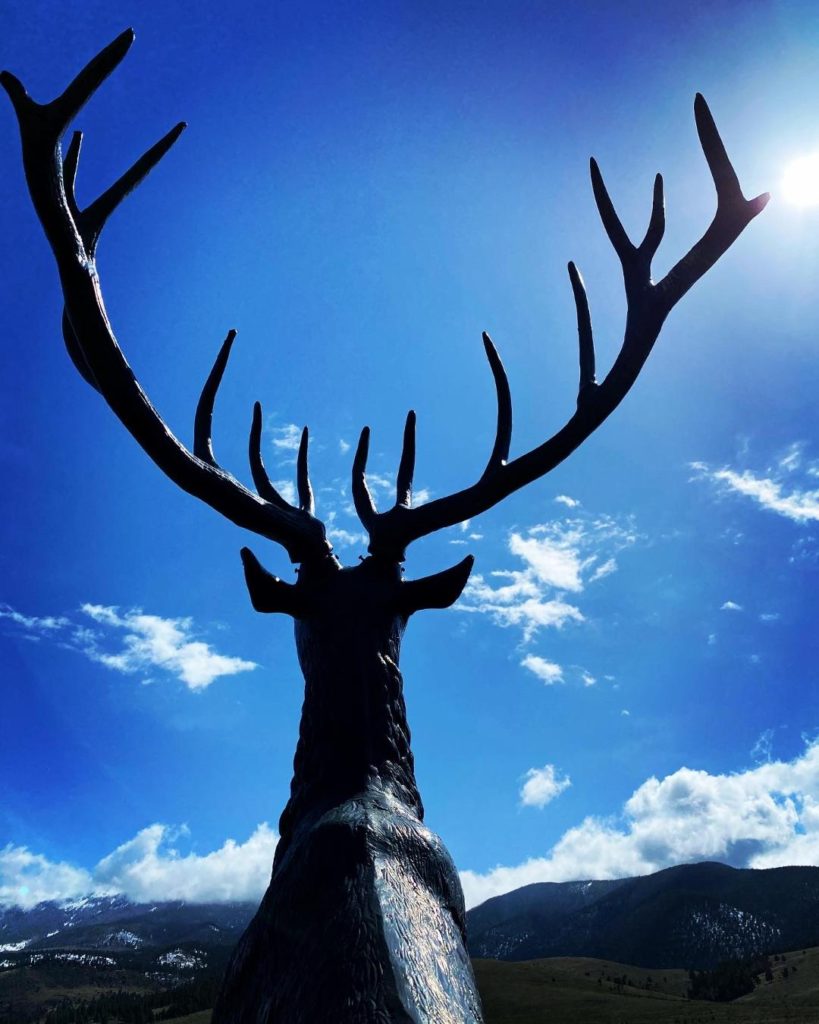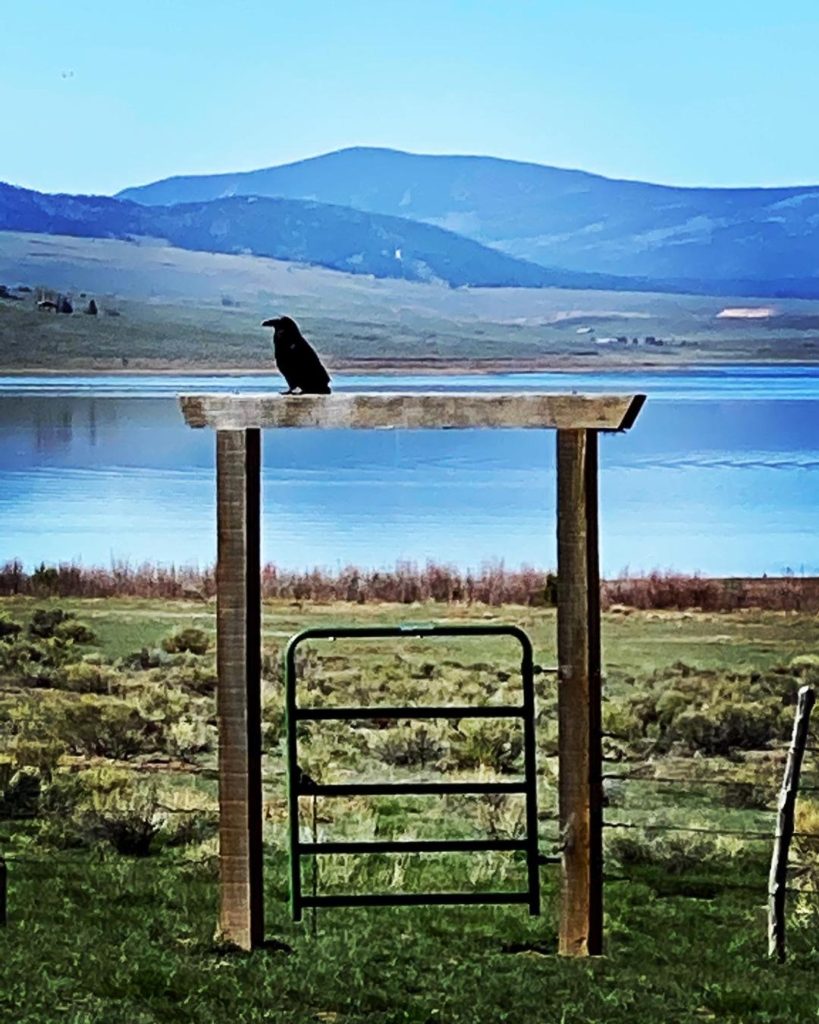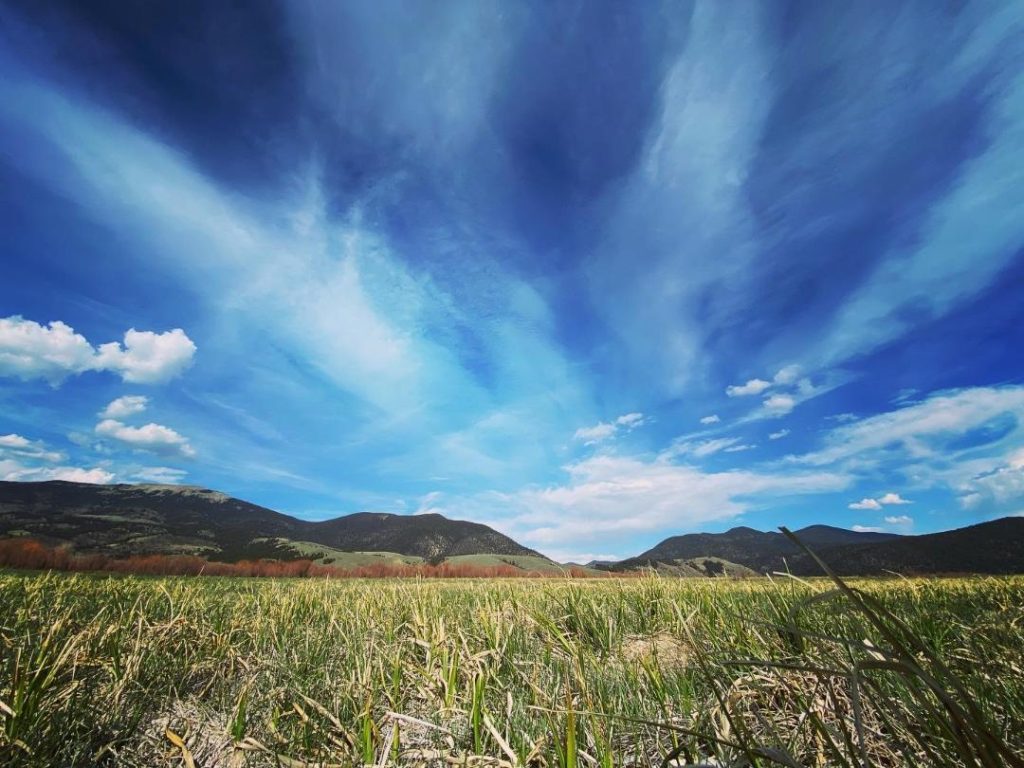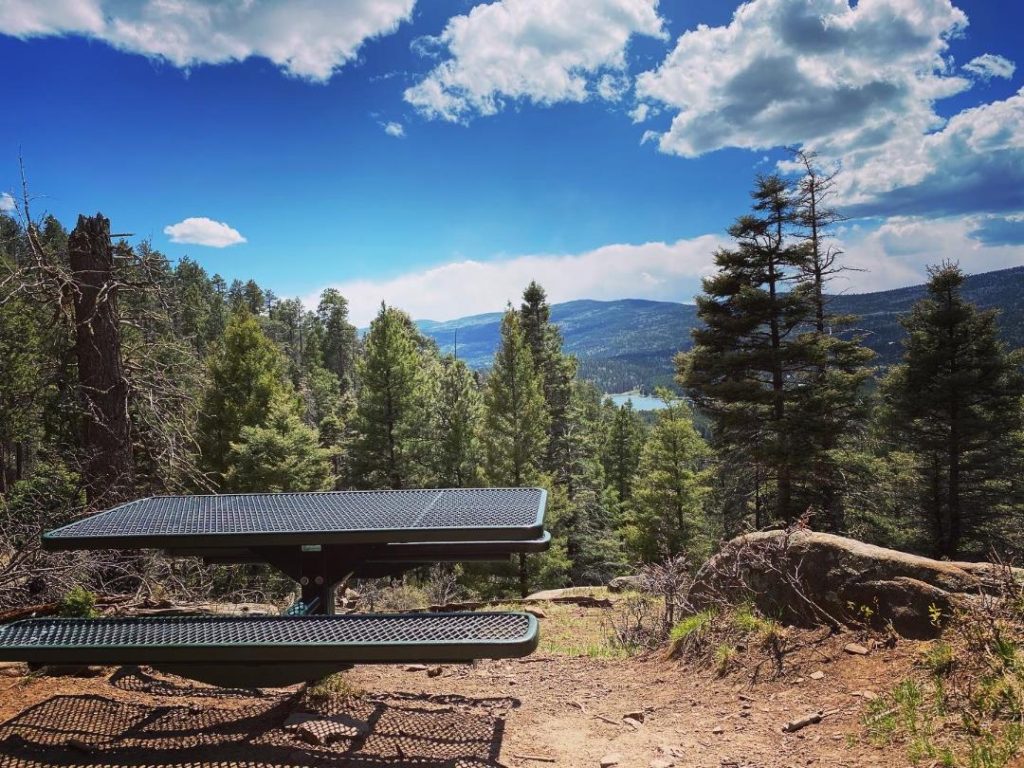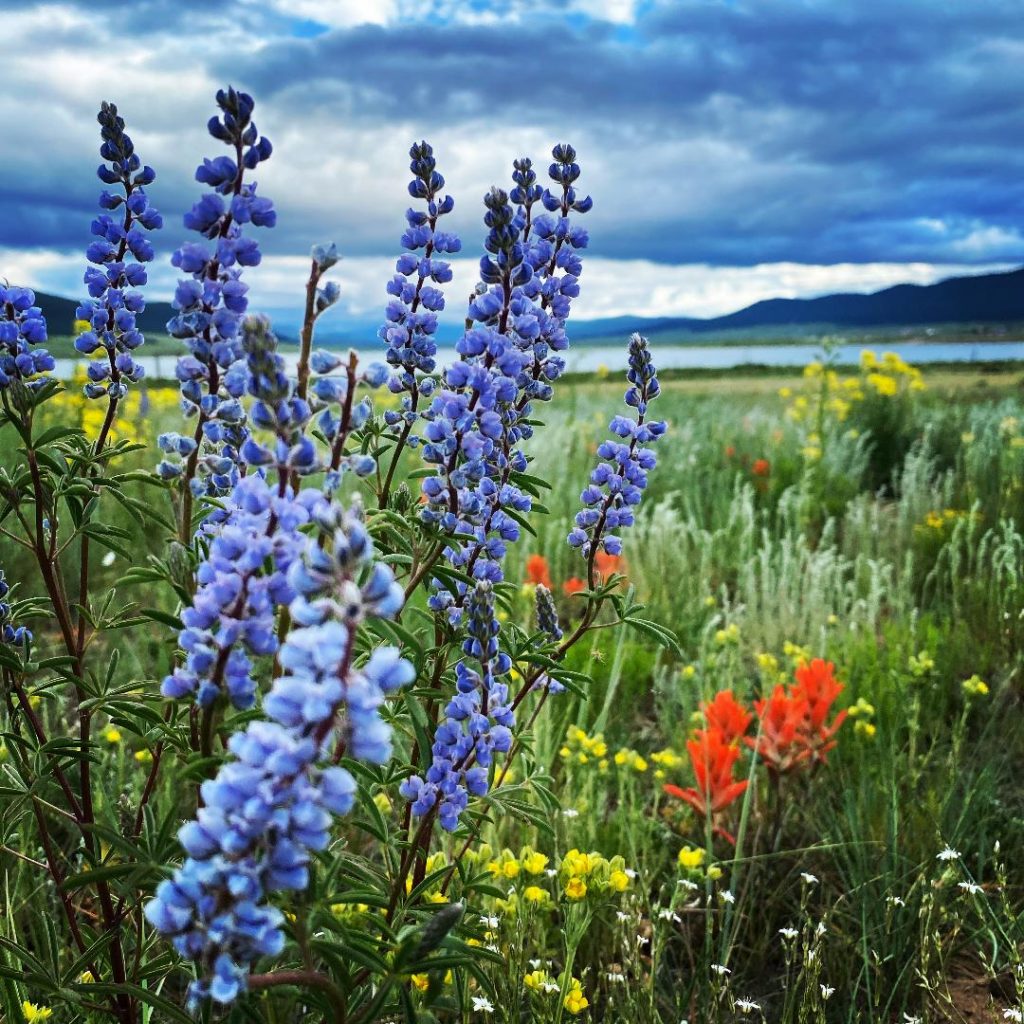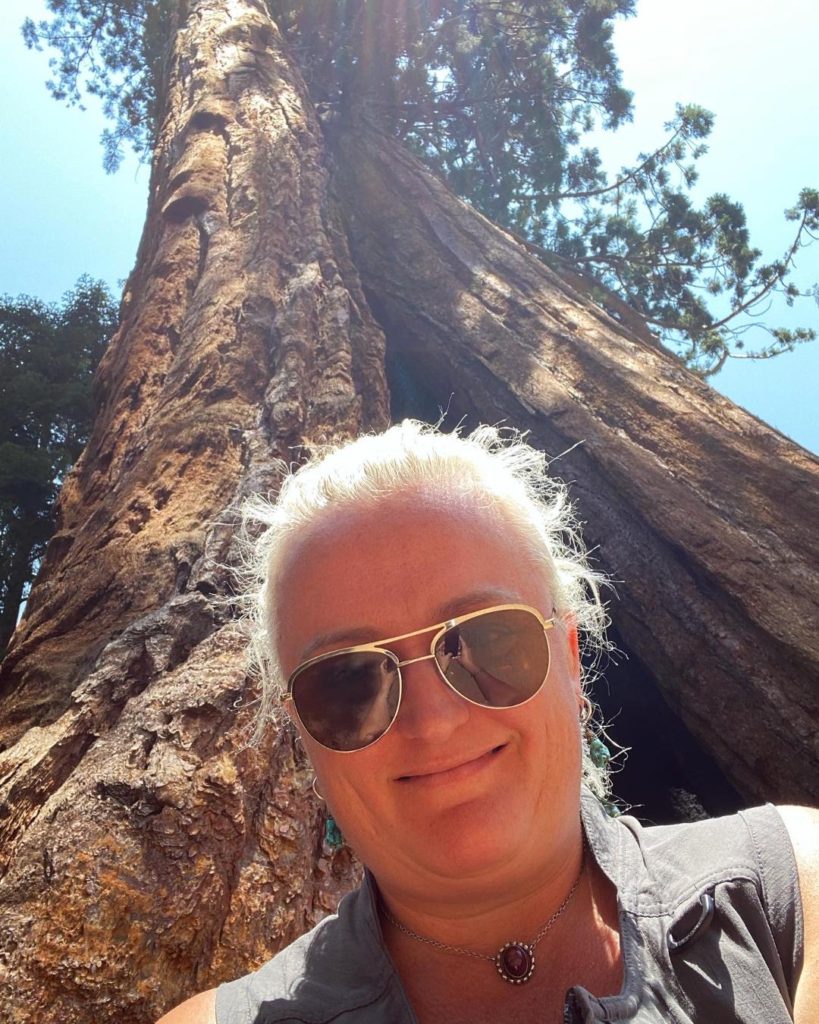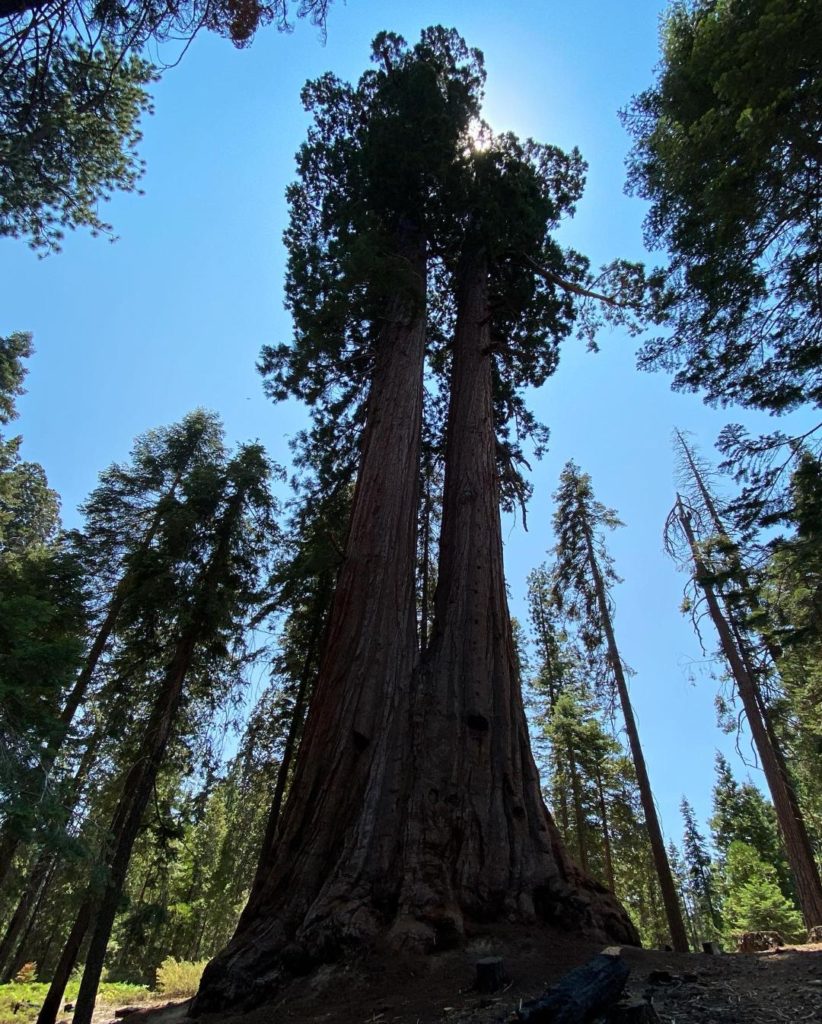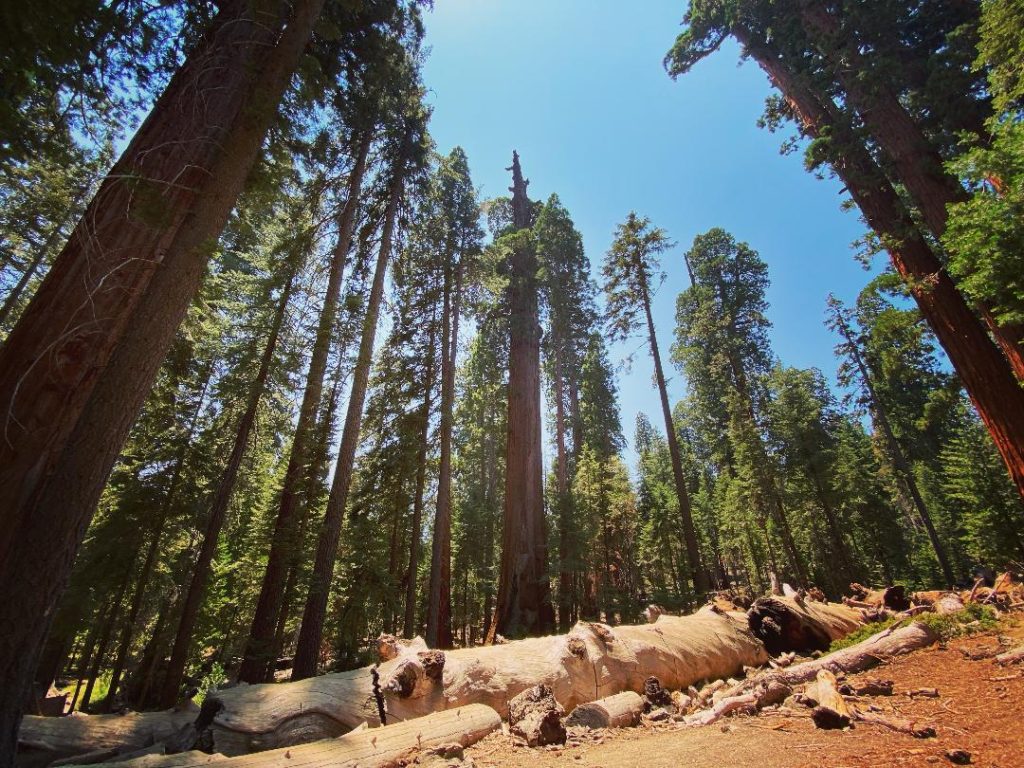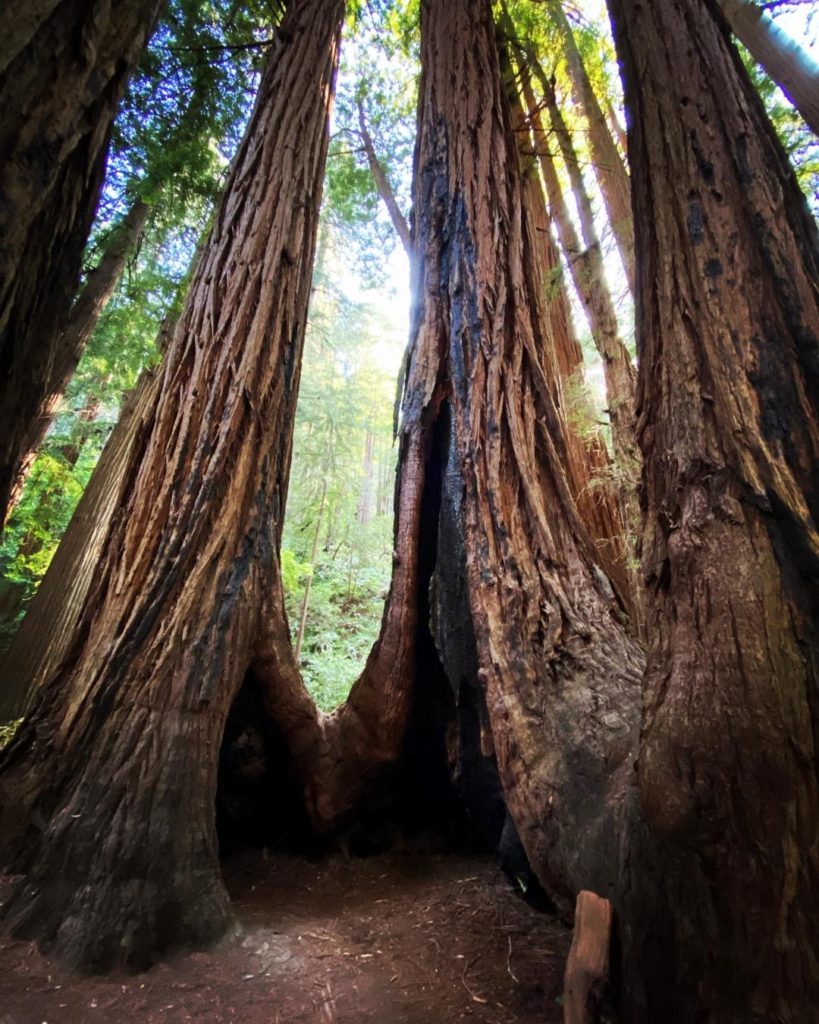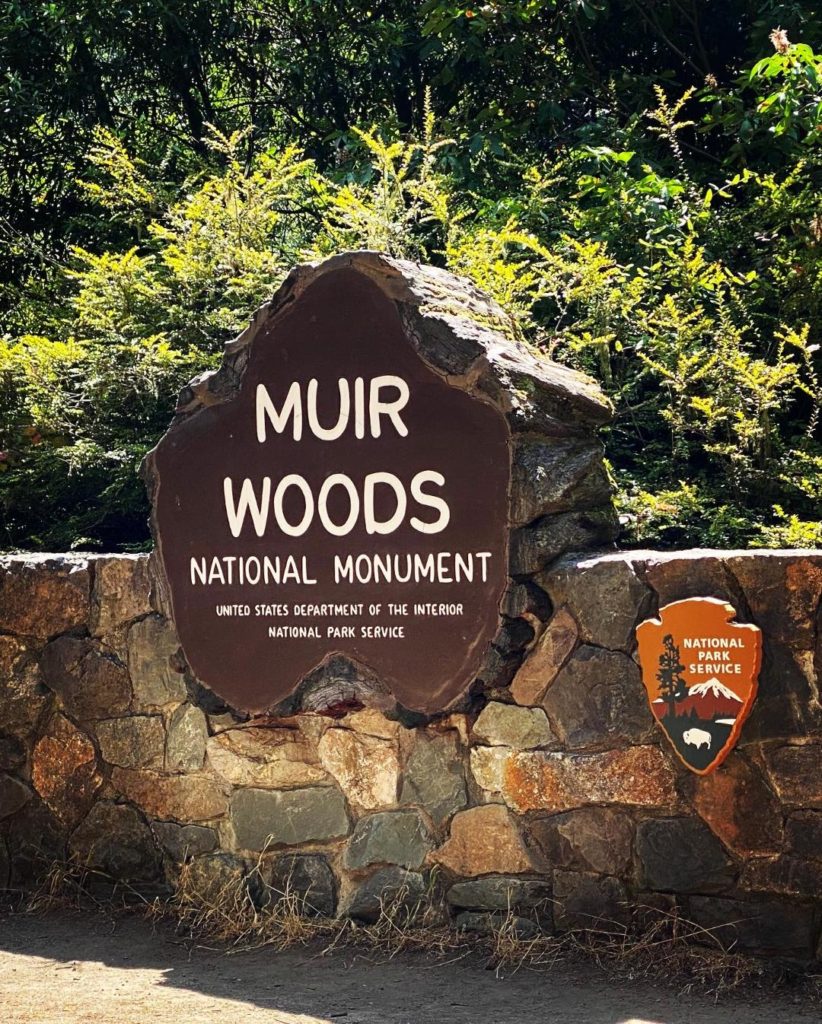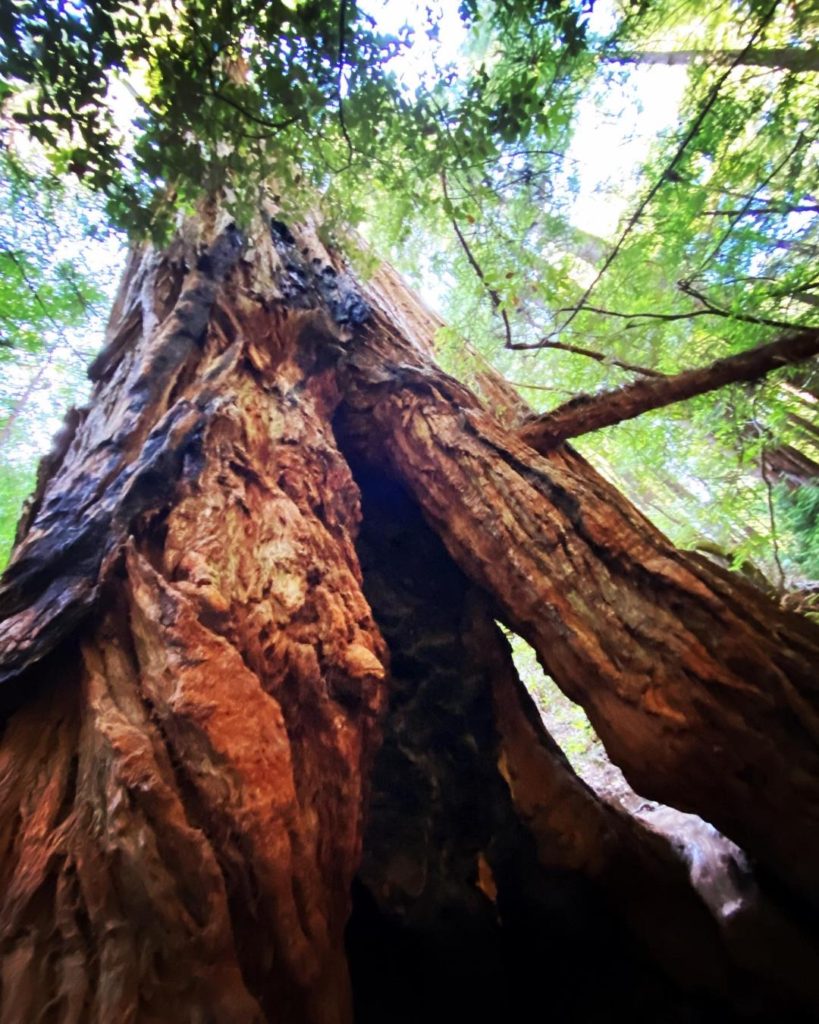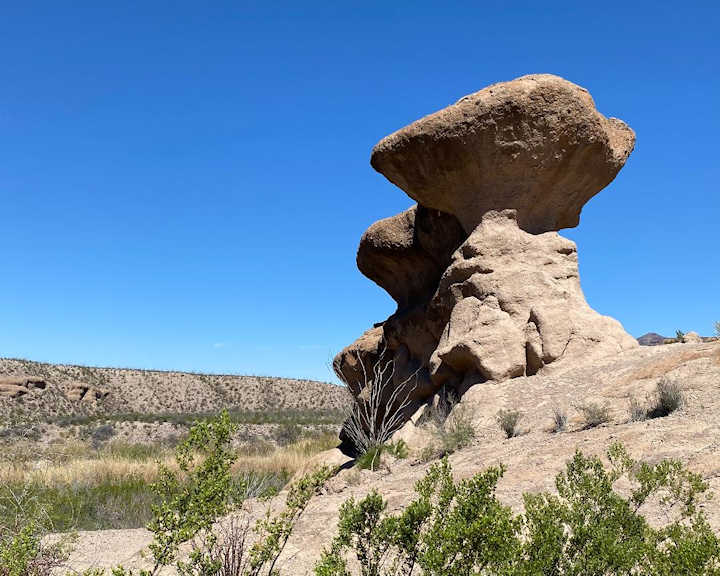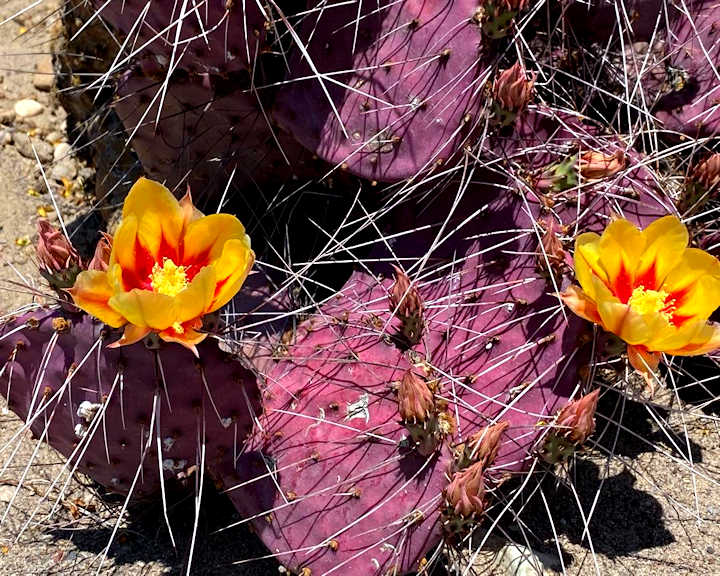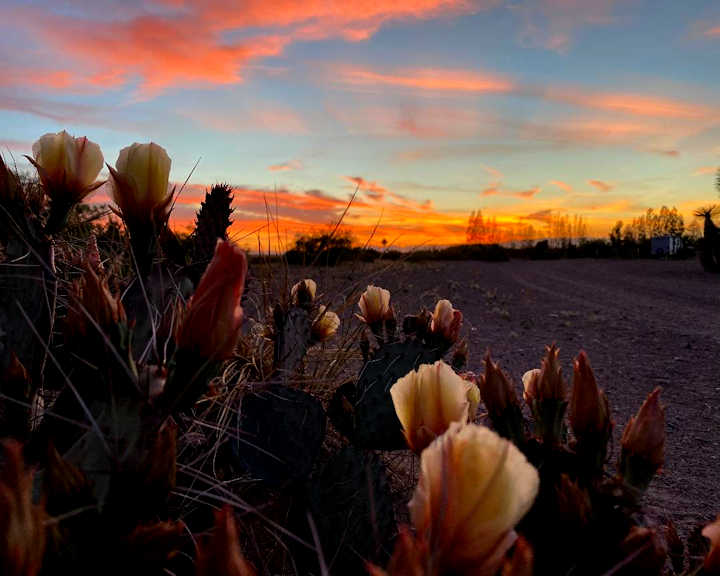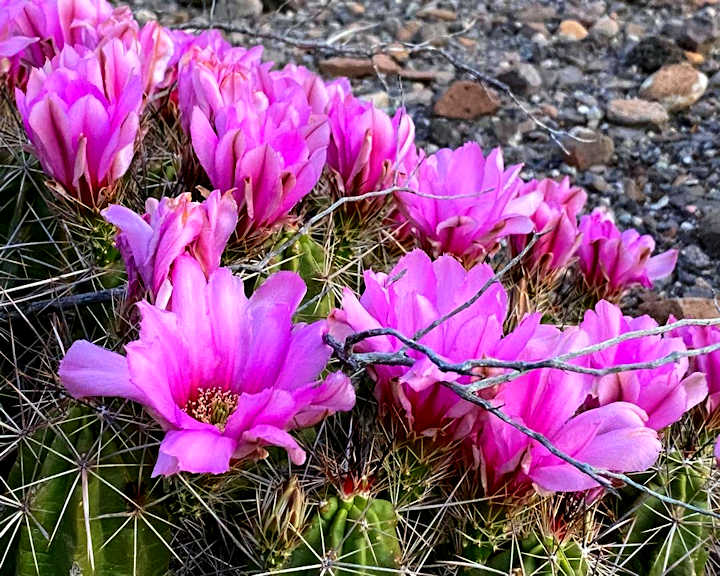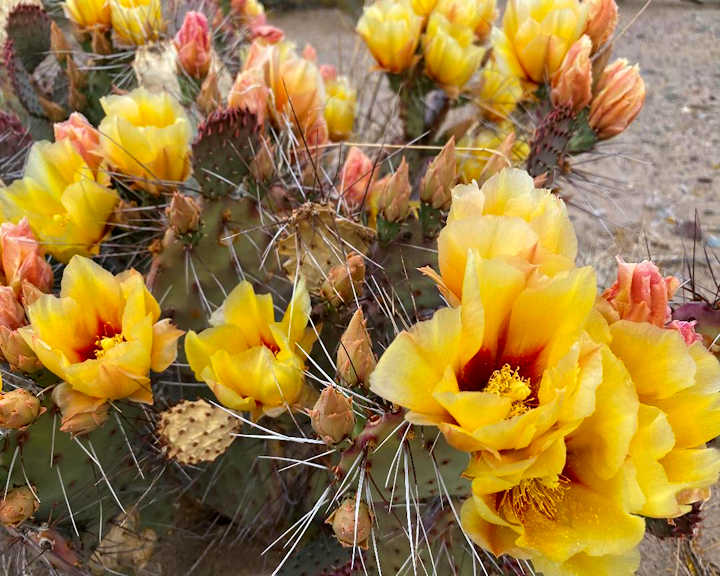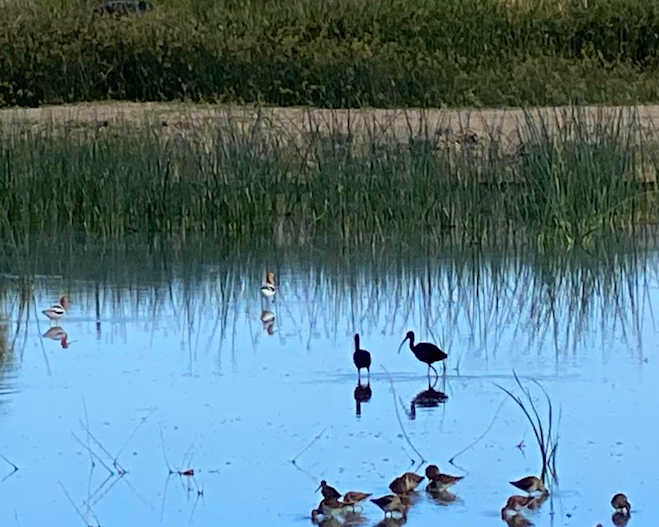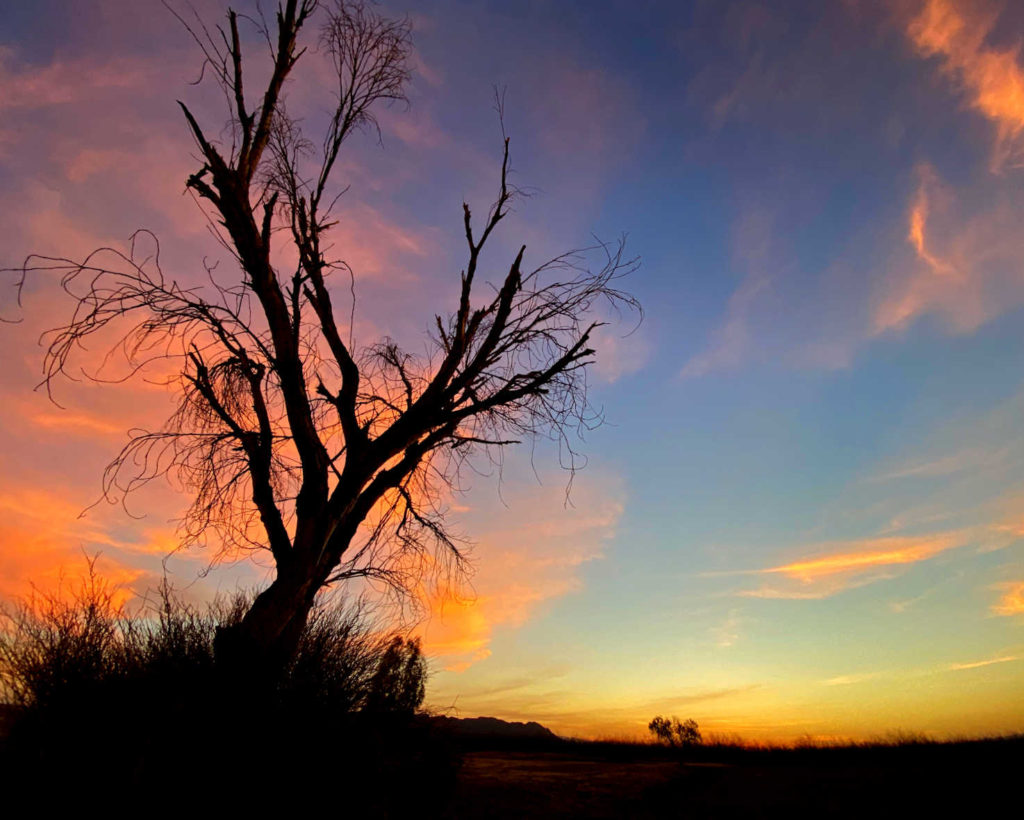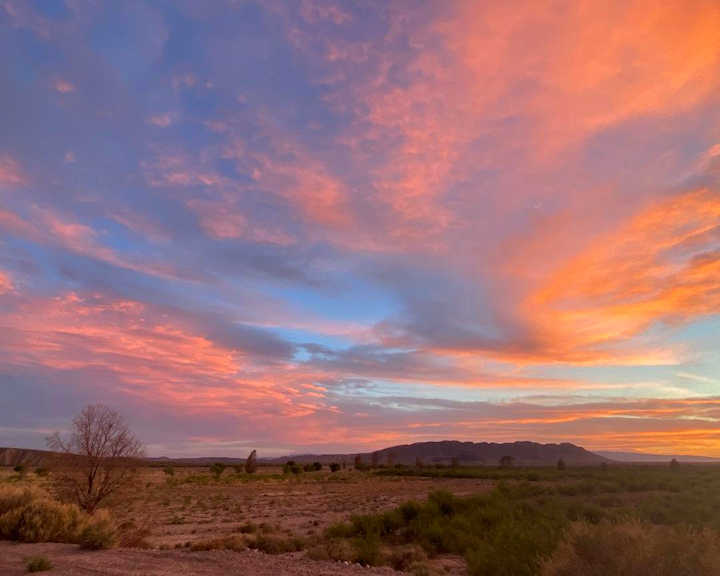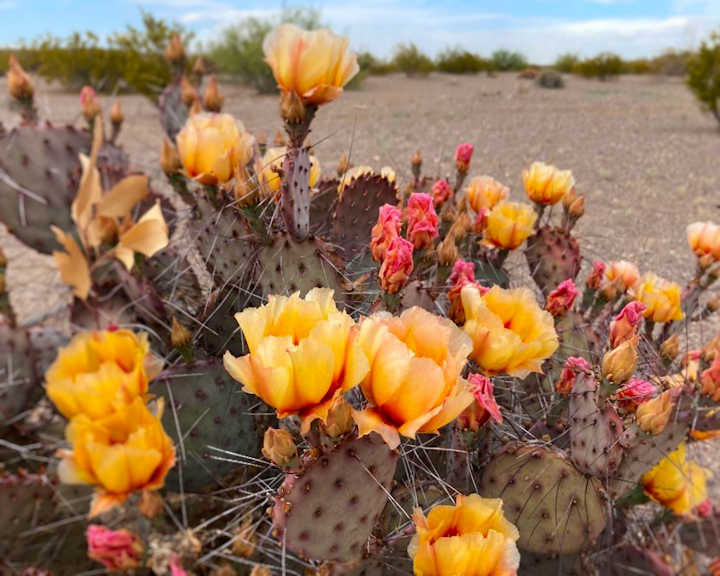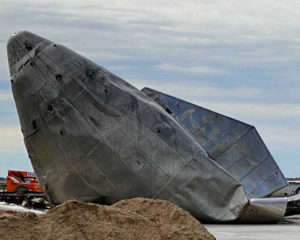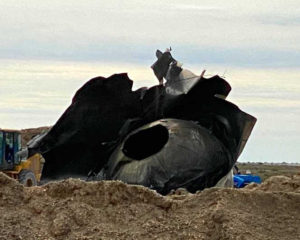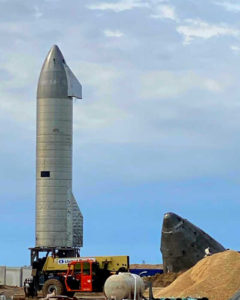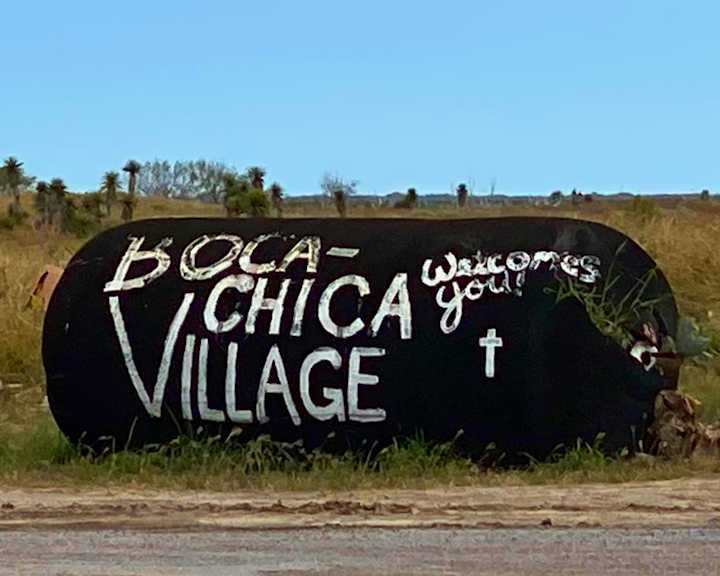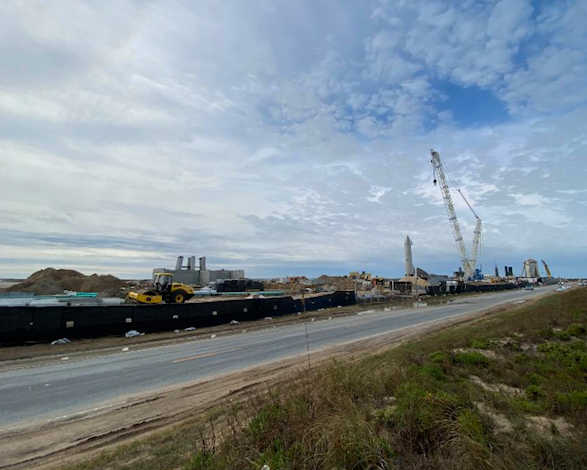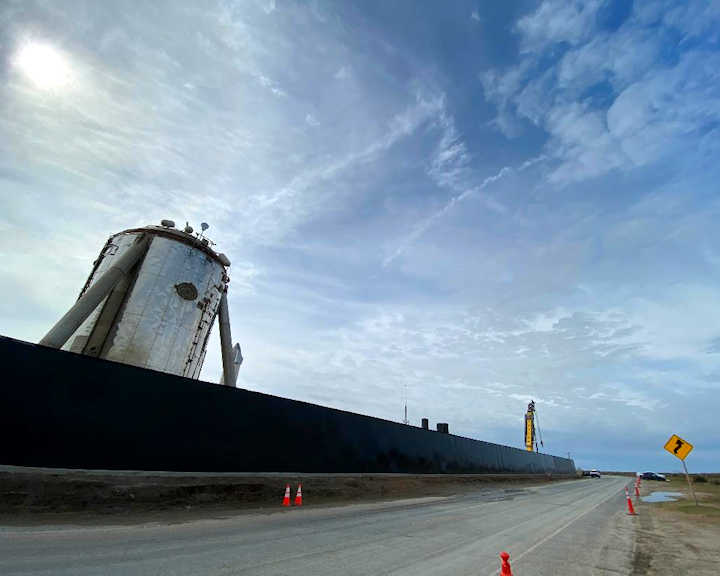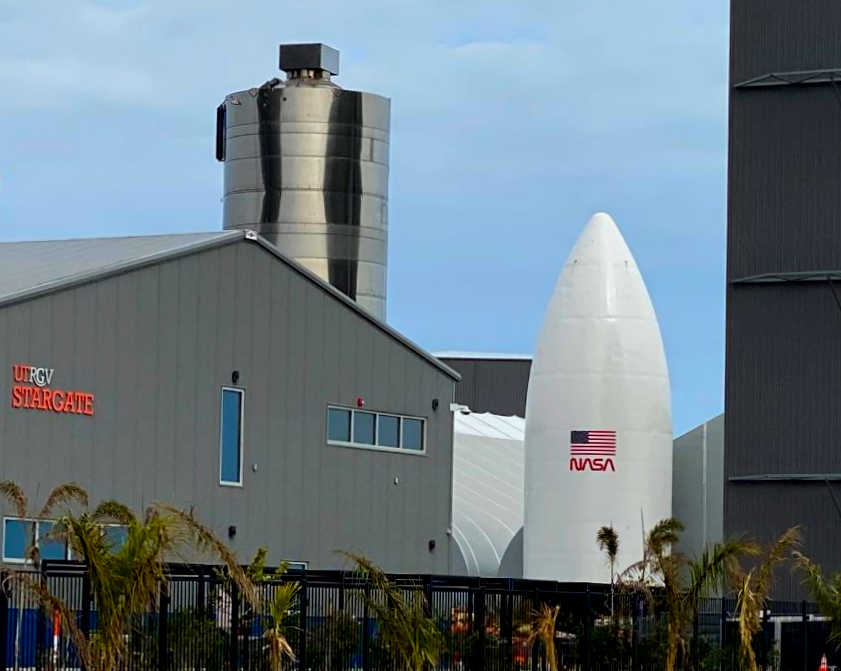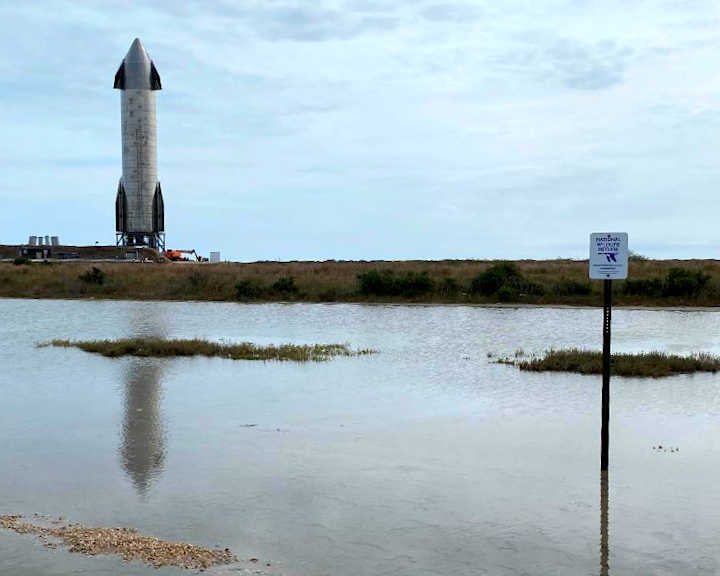-
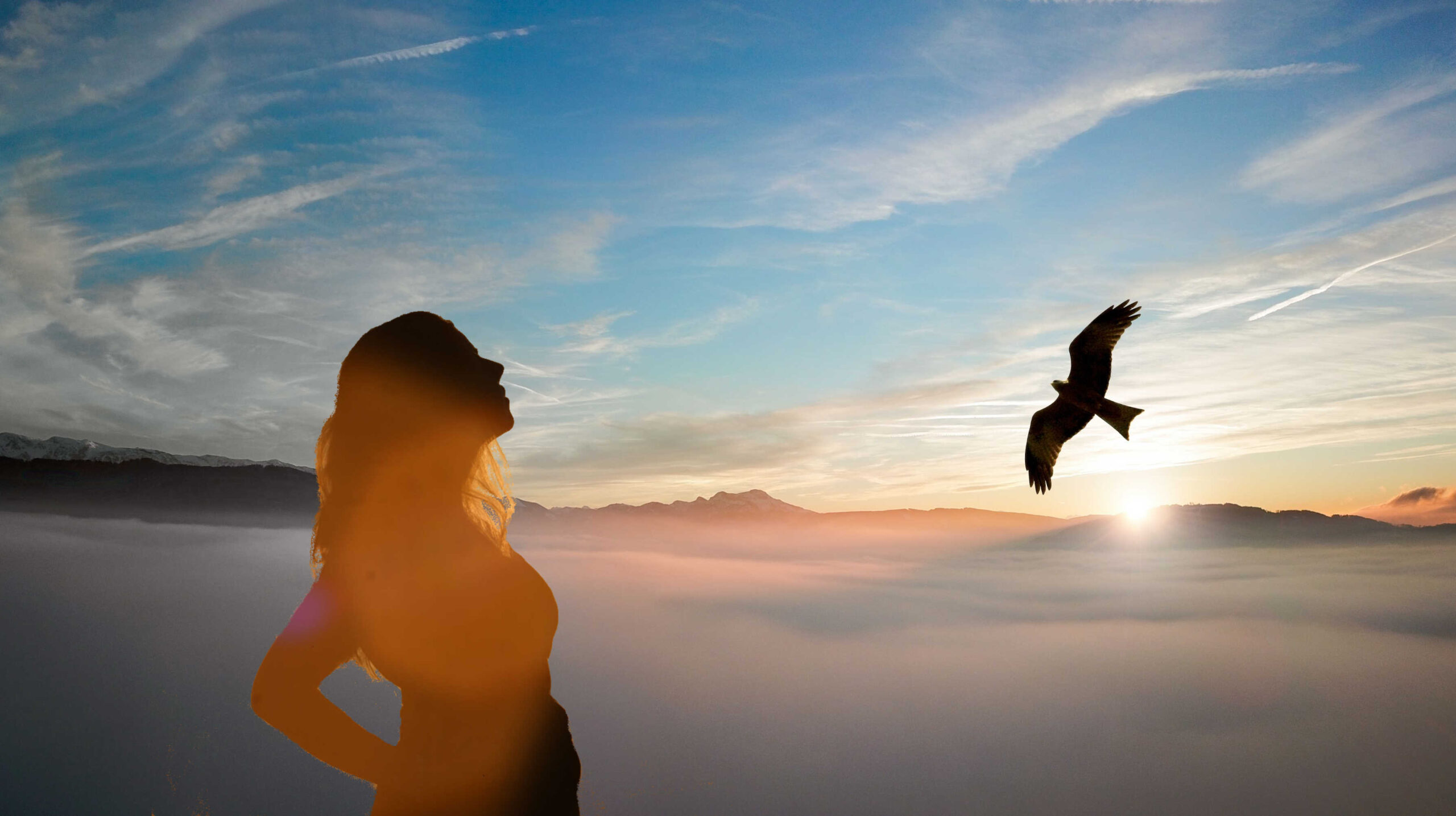 October 2, 2022
October 2, 2022The Last Woman: Legends and Folklore
Hello, friends. Have you missed me? Are you wondering where I’ve been and what I’ve been doing? If you think I’ve been off adventuring again, you are correct. But it hasn’t been a sunshine-and-rainbows kind of adventure, at least not yet. It’s the kind of adventure that unfolds in the dark, washed in a cloudy ocean of memory and feeling that drowns me in churning waves. Does it sound dramatic? Maybe it is. Or, maybe it’s not.
The truth is, I could tell you a beautiful, wonderful story about the past few months, or I could tell you a devastating one that would break your heart. It’s the same story, and I haven’t decided how to best tell it yet. So, let’s not start there. Let’s start with a different story, an old Lakota tale that’s been on my mind a lot recently. Beautifully told by Joseph Marshall III, it’s called the Story of the Eagle, but it’s not just about an eagle–there’s a woman involved.
The woman is young and beautiful and the last of her kind, but it wasn’t always this way. Just before the story begins, she was living the life she expected to live, with a family who loved her in a village full of people. But then one day, a great flood swept across the land. All of the people were washed away, except for her. She awoke on top of a hill, where she was completely alone.
She waited for the water to recede, and when it became possible, she ventured out each day to search for survivors. At first, she was hopeful. But after many days, she realized that no one remained. She was not only the last woman, but the last human, completely alone. The weight of this truth was unbearable, and after shedding many tears and thinking many thoughts, the woman did the only thing that made sense to her. She laid down on top of the hill and waited to die.
This is where the eagle comes in. You see, he was nearby doing what he loved best–flying. He’d watched everything transpire from above–the storm, the young woman washed upon the hill. He’d watched her search for others, her grief, and then her stillness. He circled overhead as she lay there, watching and waiting for her to move. But she didn’t, not for days. She only stared blankly ahead, with no apparent concern for herself or the world around her. The strangeness of it bothered the eagle tremendously, so he landed on the hilltop to speak to the woman.
“Why do you lie so still?” he asked.
“I am waiting to die,” she said.
“Why do you wish to die?” he asked.
“I am the last of my kind,” she said. “My life has no purpose.”
“Yes, you are the last,” he replied. “Don’t you see how special that makes you? The world would be less without you in it, and so you must live.”
“Why should I live when I am completely alone?” she asked.
“You are not alone,” he said. “You are surrounded by many brothers and sisters who fly, crawl, and swim. We are all here with you, and so you must live. You are too special to die.”
“The world is full of life,” she said. “My kind won’t be missed.”
“But there are no others like you,” the eagle persisted. “You fill a place no one else can fill, and so you must go on.”
“I cannot survive alone,” she said. “It’s impossible.”
“What do you need to survive?” he asked.
“I need food,” she said, “but I do not know how to hunt or fish.” The eagle studied her with sharp eyes for a long moment, then took off on mighty wings. He returned later that day, dropping a fish at her feet.
“The world would be less without you,” he said. “Eat, and live.”
“But I must cook the fish,” she said. “I need wood for a fire.”
The eagle flew away again, returning with a bundle of sticks that he dropped at her feet.
“Cook the fish, so you can eat,” he said. “What else do you need?”
The young woman looked at him with appraising eyes. “I need someone to talk to,” she said. “Will you stay and share this meal with me?”
After due consideration, the eagle perched upon a large rock, and the woman made a fire and cooked the fish. Conversation was awkward at first, but soon enough, they fell into an easy rhythm. The eagle told the woman glorious stories of everything he witnessed while doing his favorite thing–flying–and he couldn’t help but admire the way her face lit up every time she laughed.
When the meal was eaten, the eagle took off on mighty wings. But each day he came back, bringing fish and rabbits, and wood for the fire. While she prepared the food, he perched on the rock and told stories of things he’d seen while soaring through the sky. In this way, they became friends.
But soon enough, the days grew shorter, and the eagle could see the woman’s worry return. Winter was coming, and she needed a warm house and warm clothes to survive. The eagle assured her that he would fly far and wide to find everything she needed, and he would bring it to her.
“I appreciate your friendship, eagle,” she said gently, “but do not waste your effort on me. It’s time for me to die.”
“But you are the last of your kind,” he protested. “No one else can fill your place. The world would be less without you in it.”
“Perhaps,” she said, “but I am lonely. No matter where I go or what I do, I will eventually die, and my kind will be no more. Winter is hard, and why should I suffer and struggle when I cannot change the way it will end?”
The eagle might have protested further. But when he looked into her eyes, he saw a sadness deeper than he’d ever seen, and he realized that she needed something he couldn’t give her. He flew away with a heavy heart that night, unable to bear the thought of a world without the young woman in it. He decided that if he couldn’t help her, he would find someone who could. So, he flew and flew, all through the night and the next day. He flew farther than he’d ever flown, all the way to the house of the Grandfather, creator of all that is.
“Grandfather,” he began, “please help the young woman. She is the last of her kind, precious and rare. The world would be less without her, but she is lonely. Surely there is something you can do, someone you can send to help her.”
The eagle waited for Grandfather’s reply, but none came. So, he persisted, telling of the young woman’s beauty, of her kindness. He spoke of their conversations, the way her face lit up every time she laughed. He told the creator of her worthiness. But no matter what he said, Grandfather only looked at him in silence, and the eagle became angry.
“You must do something!” he demanded. “She is waiting to die, and no one else can fill her place in the world. Send someone to help her!”
Finally, Grandfather spoke, “Eagle, I did send someone to help her. I sent you. And now you tell me that the world would be less without this woman, that she is precious and rare. You speak of her beauty, of her kindness, of your belief that she must continue. Now you must decide–how deeply do you believe the words you speak? Help her if you find her worthy, but you must choose to do so.”
The eagle listened as the creator explained, and his heart grew heavier with every word. He knew he had much to consider as he left Grandfather’s house, flying through the night and the next day as he thought about what to do. He had never been faced with a more difficult choice.
What happened next? Well, the young woman never saw the eagle again. But something interesting happened a few days after he flew away to Grandfather’s house. Someone appeared–a young man. He walked up the hill, dropping a large fish and a bundle of sticks at her feet. As she built a fire and cooked the fish for them to eat, he sat upon the large rock, and they began to talk. The next morning, they left the hilltop together, for a place by a lake the young man had seen, where they could build a warm house and live together. They lived there many years and had many children, and the story of the eagle’s sacrifice was handed down from old to young, always with reverence and gratitude.
Don’t you think it’s a beautiful story? Of course, it’s easy to admire the eagle’s decision, to judge in retrospect–and from a safe distance–that he did the right thing in choosing the woman. But, I wonder–did he ever regret his decision? How many times did the man’s sharp eyes turn with longing toward the sky? And how did he choose? Which thought pushed him from indecision to decision? Was it love? A sense of responsibility? I imagine the eagle must have felt very alone, considering which set of consequences to bear. The world can be a lonely place that way–so full of advice and spectators and judgment, and yet also so empty.
We all face choices, and each one is a doorway, refining the path of our lives. We step across the threshold, forsaking other paths as the door closes behind us. We move forward, on to the next set of doors, again and again. At least, that’s what I hear. But I wonder more and more, is it truly impossible to go back? I’m not suggesting we can turn back time, but perhaps it’s never too late to choose something different. Perhaps we can still choose to fly.
I’ve been retracing my own path, reopening doors and kicking a few down as I revisit where I’ve been in life and where I’m going. Does it sound brave, or nostalgic? Mostly, it leaves me feeling hollow. The farther back I go, the more clearly I see a girl, trying to be a woman, who gave parts of herself away every time she walked through another door. Can I still make other choices? Can I still choose to fly? I hope so. I guess we’ll see.
The adventure continues to unfold, mostly in the dark. I’m still drowning in churning waves of memory and feeling, and the whole process has left me with little energy to write the conclusion of Evolving Elizah. But I am thinking of you, dear readers, as I once more attempt to pick up the pen and go about the work of being a writer. I hope you will keep me in your thoughts as well as I unfurl my wings and give it my best.
-
 May 15, 2022
May 15, 2022Breaking News: Moon Maiden thwarts Hermes’ attempt to hijack release of much-anticipated SciFi sequel
FOR IMMEDIATE RELEASE
In what appears to be a fit of jealous rage, Hermes (a.k.a Mercury, herald of the gods and protector of travelers, thieves, and orators) attempted to hijack today’s release of C.J. Hall’s new book, Aeturnum: Evolving Elizah Book 2. The much-anticipated sequel to Evolving Elizah: Initiatum was set to launch today in both electronic and print format, until Hermes’ attack on the workflow database of publisher, IngramSpark, relegated the files for the printed books to the lowest circle of electronic hell.
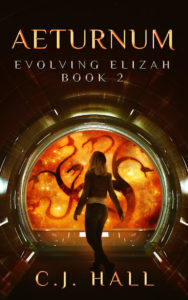
Readers have been eager for the next installment of the trilogy, and editorial reviews suggest that they won’t be disappointed. BookLife said, “Hall proves adept at action, tension, and suggestion, offering enticing alien mysteries that suggest there may something more terrifying in the cosmos than human betrayal and terrorism … The suspense (and the answers) prove so engaging that they may appeal even to readers outside the science fiction fold.” BlueInk Review added, “The story is well-told … The characters are well-developed, and the plot has more twists than a John Le Carré novel.”
Aeturnum continues the story of Elizah “Liz” Goeff, a fierce young woman raised in the aftermath of extinction-level natural disasters on Earth. The story takes place on the Green Grow 3, a space farm that isn’t just Liz’s home but also a refuge from the terrorist organization known as the New Generation, an organization led by Liz’s brother, Jackson.
The Green Grow 3 is hurtling toward deep space, catapulted out of Earth’s orbit by a malfunctioning propulsion drive, and Jackson claims he knows how to get the ship back to Earth. But can Liz trust him? When he mysteriously arrives on the ship, claiming to know how to fold the space-time continuum, Liz realizes she is out of time to discover what Jackson really wants. Why did he come, and what did he unleash when he opened the wormhole that brought him to the ship?
Apparently, Hermes does not want readers to find out. Although his reasons for undermining the release remain unclear, it’s no secret that he has trouble sharing the spotlight. Pundits speculate that he may have felt threatened by the release, which coincides with the god’s own iconic journey. A source close to Mount Olympus commented, “It should be no surprise that Mercury’s retrograde is undermining human attempts to spread joy and excitement.”
The book launch might have been lost altogether, except the Moon Maiden caught wind of Hermes’ plan and secreted the ebook files for Kindle and Nook under her veil of darkness until it was time for them to go live on the World Wide Web. When asked what message she has for the god, the Moon Maiden offered this statement, “I will shine my light tonight as scheduled, with full force and perfect feeling. There is no hiding place I cannot illuminate. The print files will be recovered, and Hermes will be dealt with.” The Moon Maiden declined further comment when asked about her plans for Hermes, stating only that “a lady never tells.”
Indie author C.J. Hall had little to add, saying only that she is disappointed that the release isn’t going as planned but hopes readers find the story to be worth the wait. And the publishing house, IngramSpark, had this to say: “Thank you for contacting IngramSpark. Your request has been received and is being reviewed by our support staff. We look forward to helping you and, in the meantime, we recommend checking out our help center for the answer to your question.”
Track the story as it develops on CJ-Hall.com
-
 February 28, 2022
February 28, 2022Scent of the Badlands: Walkabouts and Wanderlust
Many blogs ago, I promised to tell you about South Dakota. I haven’t forgotten. It’s only that other ideas came up, ideas that seemed more urgent and timely than my adventure in the Mount Rushmore state. Now it’s been nearly two and half years since I was there, but the memories are fresh. One memory in particular has stayed with me, rooted as deeply in my heart today as the day I made it. It’s a memory I often retreat to, when I need to hide away and find peace. That’s the memory I’d like to tell you about.
Why did I want to go to South Dakota? The simplest reason is that I’d never been. I wanted to see the Black Hills and the Badlands. I wanted to know if the place would feel magical to me. I wanted to be somewhere beautiful, wild and remote, somewhere that might inspire me to think differently about myself and my life. The optimistic part of me hoped that perhaps a dramatic change in scenery might change me too. Maybe the magic of the place would open a door that I could step through, a threshold that would transport me from anguish to exaltation.
It was July of 2019, and I’d just resigned from my 21-year federal career. I told you before that my heart was a sea of pandemonium, ragged with the chaos of too many battling emotions. It was. I’d walked away from more than a job. I’d walked away from the only security I’d ever known, and every standard of success I’d ever created for myself. I felt like a failure. I felt like I’d lost a game I was sure I could win. I felt like I was letting people down—the people who reported to me and the people I supported.
And yet, I left because I knew that staying would make me feel far worse. I couldn’t bear the toxicity anymore. A key project was failing, and I was the scapegoat. After nearly two years of fending off attacks, accusations, gaslighting, and blame, I was sinking under the weight of it. I was in therapy for post-traumatic stress syndrome, partly because the work environment traumatized me and partly because it triggered prior trauma I hadn’t dealt with, but the therapy didn’t make my situation better. It had become unbearable.
One particularly terrible meeting triggered an anxiety attack so bad that I thought I might have to be carried out by paramedics. I’m certain that when I was dismissed from the room, it was my pride and stubbornness that carried me, moving one foot in front of the other. I can still remember gasping for breath, my chest constricted and my vision shrinking to a pinpoint-sized tunnel on the verge of blacking out altogether. I can still remember my walk of shame through the building, endless hallways and elevators filled with people I’d known for years looking at me curiously as I wheezed and cried, holding onto the wall as I made my way on weak knees back to the privacy of my office. When I got there, I collapsed into my chair, resting my head between my knees and sobbing.
Indeed, I couldn’t stay there any longer, and I believe that my desire for magical relief from the dark night of my soul was a perfectly human desire, a desire I chased all the way to South Dakota as I ran away from the pain in my life and toward something I hoped would be happier.
The day that I drove through the Badlands, I was headed toward a campsite I’d reserved southwest of Rapid City, close to Three Forks. We passed through the gate of the national park, and I was struck by the beauty of the striated rock formations, filling the landscape with a flow of shape and color. You can see it in the pictures—the perfect blue skies dotted with fluffy white clouds, the brilliant colors of the landscape. You can see how the land goes on and on under a vast sky.
In a place so vast, some people look out and see nothing—just an empty space that leaves them feeling alone. Other people look out and see everything—a humbling landscape, teeming with grace and life. I’m one of those people. I find the vastness comforting, a sign that I’m part of something bigger. The landscape gives me hope, for if I am so small in such a big world, surely my fears and worries are just as small.
I drove from scenic lookout to scenic lookout, standing in front of my cute egg-shaped Buick Encore as Crash Tailthumper waited for me in the air-conditioned shotgun seat. Remember, this was 2019—before my big truck and RV, and before the West caught on fire, the reservoirs ran dry, and rivers withered to shallow trickles over slippery rocks. In 2019, the weather was glorious, the land opulent and lush. But, as was typical in the Badlands, it was hot—too hot for my pup’s paws. So, I didn’t stray far from my running car, but I didn’t have to. I could stand a few feet in front of the hood and look out. I could feel the sun on my face, the earth beneath my feet. I could hear the flap of wings as a raven flew overhead.
I imprinted all of this on my memory, bundling it together and sealing it with the most amazing part of the whole experience—the smell. It was a light and fresh smell, intoxicatingly sweet but clean. It was the smell of flowers, sweet yellow clover that covered the ground profusely, swaying on tall stalks in the warm, dry breeze that slid across my skin like satin.
It was the smell that elevated my experience of the Badlands to perfection, which is why I was surprised to learn that the sweet yellow clover is considered an invasive species, an interloper that doesn’t belong. The bison and other prairie animals won’t eat it, and the tall stalks choke out native grasses. It also changes the chemistry of the soil, elevating nitrogen levels and further inhibiting the growth of several native grasses.
How could something so beautiful be so objectionable? While I stood there deeply breathing the intoxicating smell, forging the memory that defines how I remember the Badlands, other people were devising ways to contain the flowers, or perhaps destroy them altogether. Undoubtedly, they had their reasons—good reasons. But the idea of this pierced me deeply, hitting much too close to home. It made no difference that the stalks of intoxicating yellow flowers existed with no malice. It made no difference that they were merely seeking to thrive in a place far from home, a place where they grew simply because someone else brought them. It made no difference, just as my own qualities and motivations made no difference to those seeking to persecute me in my federal job. In the end, I caved, and perhaps one day the sweet yellow clover will too.
When I need to go somewhere nice in my mind, I call up memories of the Badlands—the bright colors before me, the heat of the sun bearing down on me, the wind on my face as I look out on a field of yellow flowers, gently swaying in a warm, dry breeze. The smell of sweet perfection fills my nostrils, and I smile. I don’t know what it all means, only that it comforts me.
Crash and I spent several hours driving through the national park, and then we continued on. I expected to end the day in our tent, camped outside Three Forks, but things don’t always unfold the way we expect, do they? We ended up in Hill City, but that’s a story for a different time. I’ll make a point not to wait another two years to tell you.
The Badlands, Crash, and sweet yellow clover Don’t forget to check out my books, or support my work on Patreon
-
 December 27, 2021
December 27, 2021The Flute Maker: Legends and Folklore
The Native American flute has a distinctive sound—beautiful, ethereal, soothing, and always a little sad. Stories vary as to how the flute came to exist, but as I navigate this holiday season, one particular version of this story has been on my mind. I’d like to share it with you, although it’s better told by Joseph Marshall III, an amazing Lakota storyteller.
The story of the flute maker begins with a boy and a girl who lived in neighboring villages. Even as children, they knew that they completed each other, and they promised to spend their lives together. In this way, the boy and the girl grew into a young man and a young woman.
When they were old enough to marry, the young man went to the young woman’s village. But when he got there, the villagers told him that she had agreed to marry someone else. He couldn’t believe this was true, so he went to her and asked if she’d forgotten their promise.
“No,” the young woman replied, “I didn’t forget, but we were children then. What is the promise of two children compared to the difficulties of life? I need a good provider and a good husband.”
The young man was filled with profound sadness, and he ran away from the young woman’s village, far into the woods until his legs would carry him no further. He collapsed upon the ground, and there he remained, oblivious to the earth and the ants and the birds and everything else that surrounded him. He felt no cold, no hunger, no thirst. He felt nothing but grief, until a sound registered in his ears—a song as melancholy as his heart.
He rose to search for the voice of his grief, surprised to discover that it wasn’t a person singing. It was the wind echoing through a dead, hollow branch of a cedar tree that had been drilled through by woodpeckers. He cut the branch from the tree and spent the rest of the night and the following day fashioning a flute.
The young man found glimpses of peace as he learned to play his own sad song on the flute. He wandered the forest for days, the emptiness of his heart flowing with each melancholy note he played. He couldn’t eat or drink or rest, for as soon as he stopped playing, he was overwhelmed with grief. Eventually, weak and weary, he emerged from the woods onto a familiar river bank. He had wandered back to his village.
All the women from his village stood on the far bank of the river, entranced by the music he played on the flute. Then he noticed someone else among the women. It was the young woman he wanted to marry, the one from the neighboring village. She crossed the river to speak to him.
“I knew a young man who made my heart fly,” she said. “But now he plays a sad, sad song.”
“The flute is the voice of my pain, since the woman in my heart has married another.”
“Can your flute sing a song of joy?” she asked.
“No. Its voice comes from me, and I have no joy to give it.”
“But I feel joy,” she said, “because you have returned. I realized that my life without you would be lonely, so I have married no one. I will take no husband, unless it is you.”
The young man’s sorrow was transformed into joy, and he began to play the flute once more. This time it sang a song of hope and celebration, a song that danced on the breeze and drifted across the water.
As you might expect, the couple was married and lived happily ever after. The young man went on to make many flutes, and he taught many to play. With each lesson, he would explain that no matter how joyful the song, the flute will always sing with an echo of sadness. The chance of love always comes with the chance of a broken heart. Sweet but sad. Beautiful but haunting.
The story reminds me that a balanced life isn’t a flat line. Rather, we soar and then we sink. Highs offset by lows. I’ve been thinking about my own highs and lows, writing about them as I work on a memoir and await editorial feedback on the sequel to Evolving Elizah: Initiatum.
It’s no easy task to look back on a life lived and see it with clearer eyes, to relive all the love found then lost, people and places who came and went. It’s not easy to see how often the valleys dominate the peaks, to wonder if there’s a better way, to wonder if the future will be better.
It’s not easy to look back on the holidays I spent alone, or even worse, ones spent with hateful, angry people. I hoped and tried to be happy, but now it feels like time and energy misspent, the pain of it all magnified by misplaced optimism that “this year will be better.” Why did I think the holidays contained enough magic to transform bad into good? When did I start believing in Christmas miracles and New Year’s resolutions?
This year, I managed to let go of my holiday expectations. Does that seem sad to you? It didn’t feel sad. It felt free. It was enough to walk in bare feet on wet sand, cool surf swirling around my ankles. It was enough to share a meal with my sister and brother-in-law and watch a movie together, even though none of our children were present. It was enough to call a friend, skipping cheery formality and instead greeting her with a heartfelt question—”how are you faring today?”
As the New Year approaches, I stand strong on feet planted in sorrow, and my hands reach high toward joyful peaks. Perhaps in this way, I can span the highs and lows and find balance. Love with a chance of heartbreak. Joy with an echo of sadness. Perhaps in this way, I can appreciate the fullness of life.
-
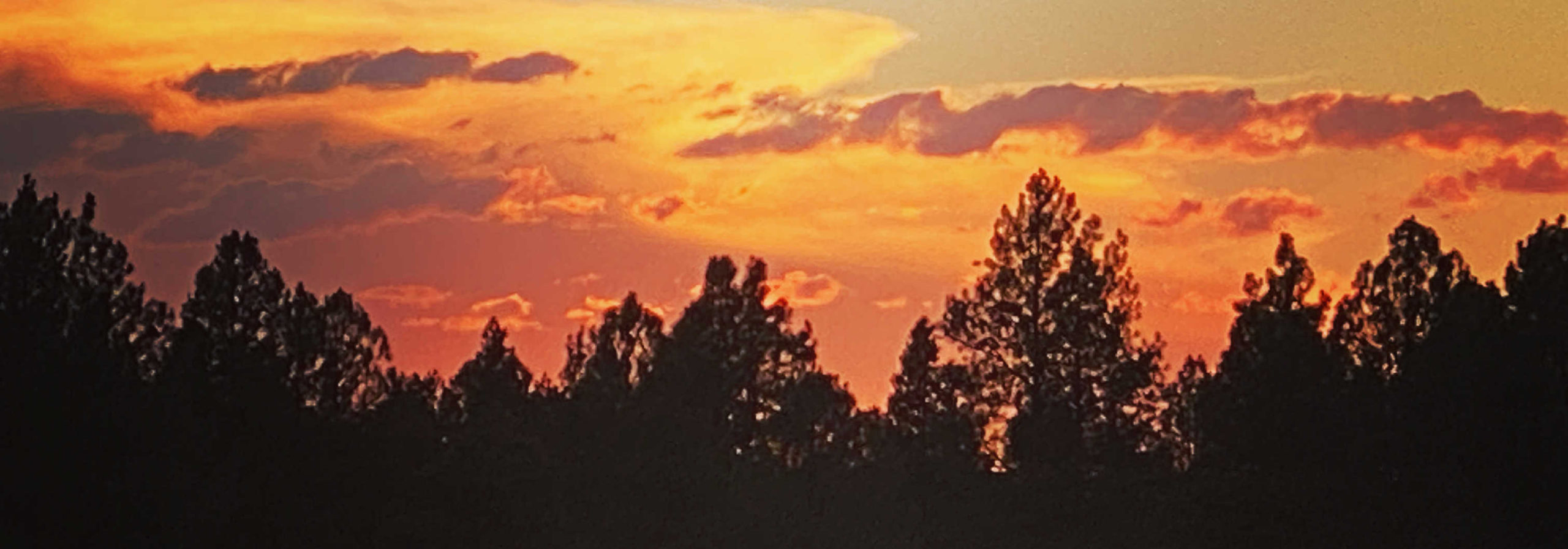 November 19, 2021
November 19, 2021Through the Navajo Nation to Flagstaff: Walkabouts and Wanderlust
“What am I going to do now?” This is the question I asked myself as I stood alongside Arizona state highway 160, just east of the township of Kayenta. My nerves were shot, and I was in a fix.
It was early September, and I’d woken up that day in the Ashley National Forest, in southeastern Utah near Flaming Gorge. I was camping off grid, and it was cold. Outside temperatures were close to freezing, and it wasn’t much warmer inside. My heater shut off about midnight when the RV battery died, so it was a frigid 46 degrees when I woke.
I was ready to move south. My enthusiasm for seeing sights and exploring natural wonders had evaporated days before, somewhere south of Idaho Falls. My only remaining desire was to get to my next campsite, over 500 miles away in the Coconino National Forest outside Flagstaff, Arizona.
Perhaps if I hadn’t been so weary that morning, I would have realized I was trying to cover too much distance in too little time. Perhaps if I had consulted my paper atlas, I would have realized I was going through Douglas Pass, a nail-biting Colorado highway that cuts through the mountains with hairpin switchbacks on steep grades.
The drive wasn’t pleasant, but I made steady progress. I navigated the steep roads and switchbacks carefully through the mountains. And much to the chagrin of the people behind me, I drove down the rough washboard highways slowly. Finally, I hit the Arizona state line. The roads didn’t get any better, but it was comforting to know that I’d made it to the proper state. All that remained was getting to the proper city. I still had a chance of arriving at the forest before dark, which was important because I needed to find a place to park in an untamed meadow filled with boulders.
Then my trailer tire exploded. It made a popping noise, like the world’s largest biscuits in a can, and the right side of my trailer flew up off the ground. I could feel it pulling the truck, straining against the hitch, but fortunately everything stayed upright. I immediately took my foot off the accelerator, letting the big diesel engine slow the truck and trailer to a crawl. In my side mirror, I could see shreds of tread and ribbons of steel belts flying out from under my camper, in every direction.
I turned on my hazard lights and pulled off the highway. The line of cars behind me continued on as I got out and stood alone, assessing the situation and asking myself the question–“What am I going to do now?” Luckily, only one tire exploded on the right side, the rear one. I had the equipment I needed to fix this—one spare tire, a hydraulic jack, and the appropriate sockets and wrenches.
My head was spinning, processing a multitude of scenarios for changing the tire. I’d never changed a camper tire before, and I was parked on a slope. I wanted to lower the leveling jacks to raise the right side, but the camper’s computer locked the system, saying that the camper was sitting at too dangerous an angle to use the jacks.
My mind was frazzled, and I struggled to stay focused. I noticed that I had two bars of service on my cell phone, so I decided to call upon of my three RV roadside service packages. I wondered how long I’d have to wait for roadside service and if it was still possible to make Flagstaff before dark. I didn’t have to wonder long. The roadside service provider informed me that none of the tow truck drivers in the area were willing to come to my location to change the tire.
It took me some time to comprehend my situation, and in fact, I didn’t piece it together until a local family stopped to help me. They pulled off the road in an old Chevy pickup, towing a trailer with an even older car on it. The father peeked his head around the corner of my camper as I stood holding my phone in one hand, my head in the other. His son and son-in-law stood behind him, while his wife, daughter, and grandchildren waited in the truck.
“Would you like us to help you?” he asked me as I stared at him. “If you have a spare, we can change the tire for you.”
“I would truly appreciate your help,” I told him, still dazed and rattled. The men set to work as my head continued to spin. I tried to engage in conversation and express the gratitude I felt, but meaningful words escaped me.
“Do you know where you are?” the father asked. “You’re in the Navajo Nation. Kayenta is a few miles down the road, but no one will come to help you. Not here.”
The man explained that he and his family lived a few miles down the highway. They moved in together—the father, mother, son, daughter, son-in-law, and grandchildren—because his place still had running water. Much of the Navajo Nation has no running water. The infrastructure is poor, and years of uranium mining wreaked havoc on the land, water, and people.
“Our trailer is too small for so many people,” the father said, “but it’s what we have.” I wasn’t sure what to say in response to this, so I said nothing. We stood in silence, appraising the younger men’s progress on the tire, and eventually we resumed casual conversation.
Soon enough, the tire was changed, and the family got back into their truck and drove away. It seemed like only a few minutes to me, but when I pulled back onto the highway, it was already starting to get dark. I continued on, driving for three more hours to reach my campsite.
It was pitch black and past 10:00 pm when I pulled into the Coconino National Forest. Somehow, I got myself parked in the meadow without hitting any trees or boulders. Indeed, it’s just as well that I couldn’t see what was going on, because I realized the next morning that the other trailer tire on that side was also damaged. It had several cuts in the sidewall, undoubtedly caused by the razor-sharp ribbons of metal that hit the tire when the one behind it exploded.
I wasn’t quite sure how I drove the last 200 miles without another blowout, but I decided my camper was going no further without new tires. This is how I met my neighbor, Norm. But that’s a different story for another day.
Let’s go back to the family who changed my tire. By most standards, they were poor, but what they gave me on the side of that highway was invaluable—kindness, compassion, and help. Human kindness still exists. People still help each other, but only when they choose to do so. We can choose to be kind, or we can avert our eyes. Each moment offers a new choice, and a new chance.
We all have something to give. Even when our house is too small for everyone who needs to live there. Even when the standard of privilege is running water that may or may not have been contaminated by uranium. Will we give what we can? And what will we get in return?
I wanted to thank the family who stopped to help me, but in that moment, I was shocked and disoriented. I could barely offer coherent conversation, much less meaningful thanks. When I saw them piling back into their truck to drive away, I offered them the only thing I could think to give them—a blessing.
I blessed them—the father, the mother, the son, the daughter, the son-in-law, and the grandchildren. And with the retelling of the story, I bless them again, these people who stopped for no other reason than knowing I needed help. May their lives be filled with joy and meaning. May their food and water be clean and nourishing. May their home be happy, if a bit crowded. And I bless you too, dear reader. May people stop to help you when you need it.
P.S. Check out my other work while you’re here! Or, support my work on Patreon.
-
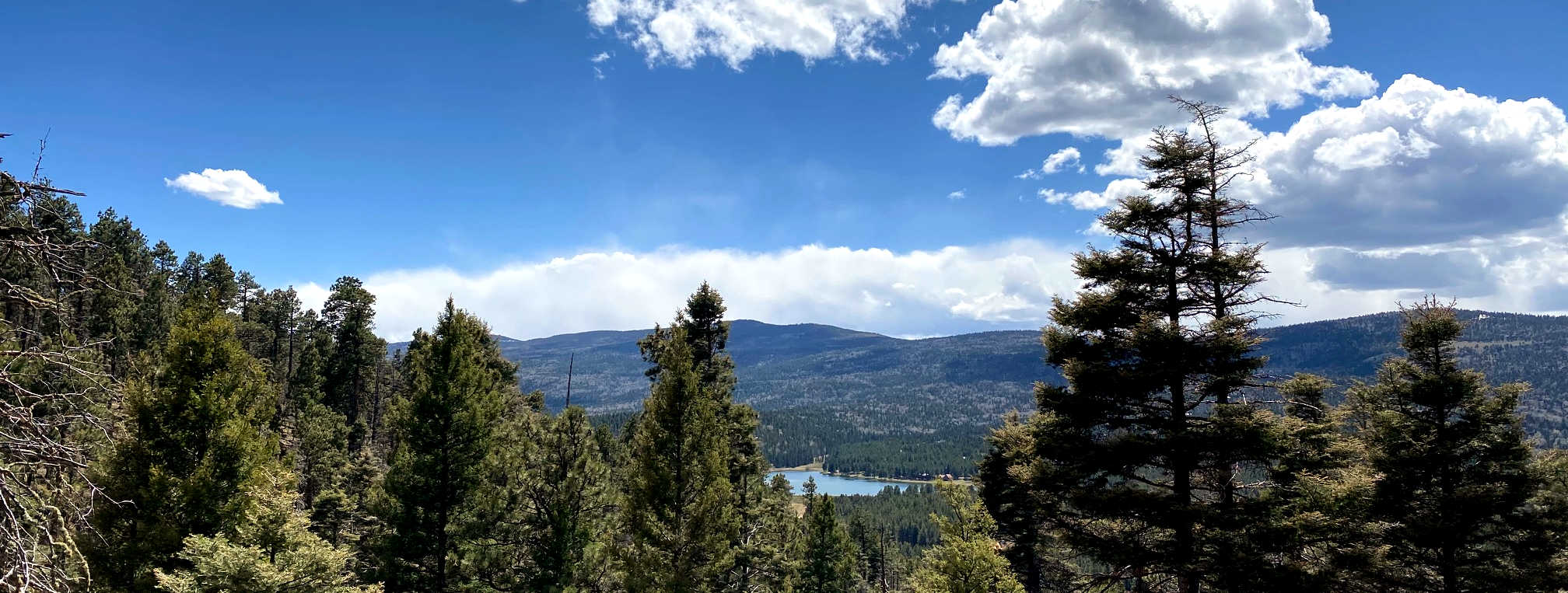 October 26, 2021
October 26, 2021The Trio of Doom: Walkabouts and Wanderlust
If you think that RV life is extraordinarily social, you may be surprised to hear that it’s often solitary. It makes sense, if you think about it. People in RVs are frequently on the move, and your neighbors may be here today and gone tomorrow. Or, you may be the one here today and gone tomorrow. Or, you may not have any neighbors at all. It happens.
Fellow travelers often share cursory nods, greetings, or acknowledgements when they see each other. These are generally polite interactions and not a gateway for further communication. But there are situations where substantial conversation becomes more likely. Namely, someone needs help, or someone is curious. It was a combination of these two circumstances that led me to meet the Trio of Doom.
I was camped at an RV park in northern New Mexico, where I planned to work on my next book and see the mountains. Crash and I were out for our morning constitutional when one of my neighbors approached me, a man who wanted to borrow one of my several cans of WD-40. I couldn’t tell whether the man was frazzled or frustrated as he explained that he couldn’t get his fifth wheel camper unhitched from his truck. He thought that maybe the hitch lock was rusty, thus his search for WD-40.
This seemed a strange problem to me, especially since he’d only hitched the camper to the truck the day before. The hitch lock wasn’t rusty then. And if there was a problem with his hitch, how did he get it connected in the first place? Normally, if you can hitch it, you can unhitch it. However, I know that when it comes to RVs, anything is possible. I acknowledged his statement with my best concerned look and told him it sounded stressful.
“Sure,” he said, “but that’s not the worst part. When I pulled it up from Texas yesterday, the fresh water tank fell off.”
“Excuse me? Did you say it fell off? When you were driving down the road?”
“Yes, it fell off when we were driving down the road.” He studied my face as he nodded silently, apparently realizing that I needed time to integrate this information into my world view.
If you aren’t familiar with RVs, the fresh water tank holds clean water to supply your sink, shower, and toilet when you aren’t connected to a continuous water supply. It is an integral part of the RV, connected to your plumbing with an array of tubes, valves, and a water pump. The tank itself is likely to be installed on the underside of your RV close to the front of the camper. These tanks are prone to leak or crack, but they aren’t generally prone to fall off when you are going down the road.
But while it’s unlikely, it’s not impossible. It can’t be, because it happened to my neighbor. He was driving down the highway, at highway speeds, when the fresh water tank fell off, hit the pavement, and rolled down the underbelly of his camper, smashing into the other tanks, water lines, propane lines, sewage lines, both axles, and everything else on the underside of his camper. All I could do was shake my head in sympathetic dismay as he told me that he had no idea how much damage his camper sustained, but in the spirit of tackling one problem at a time, he was focusing on getting it unhitched first. I watched him set off with my can of WD-40, and I went about my day.
Hours later, Crash and I walked over to his campsite, to collect our WD-40 and check on his progress. The camper was unhitched, but apparently, my WD-40 was not part of the solution. No, this man had bigger problems than a little rust. It seems that the lever on his hitch that locked the camper to the truck was installed backwards. Thus, he couldn’t unhitch the camper because when he thought he was unlocking the connection, he was actually locking it.
Now, if you follow the logic here, you might guess that the inverse was also true—when he thought he was locking his camper to the truck to safely pull it down the road, he was actually unlocking it. I don’t know if my neighbor was lucky or unlucky that it was merely his water tank that fell off instead of the entire camper, but at this point I’d like to remind you, dear reader, that it is never a good idea to tailgate anyone pulling a trailer.
My neighbor explained that he’d spent the last several hours disassembling the entire hitch, piece by piece until he could finally disconnect his camper. That was how he discovered that the locking lever was installed backwards.
“It wasn’t me,” he assured me quickly, apparently concerned that I might judge his competence. “No, I’m not nearly foolish enough to do something like this. I lent this hitch to a friend of mine three years ago, and when I told him I needed it back, he installed it in my truck. He must have put the lever on backwards.”
“I see,” I said. “So, it’s your first time out in three years?”
“No,” he says, “we go camping all the time. I was using a different hitch. I liked the other one better, but it wouldn’t fit in my new truck.”
“I see,” I said again, trying to focus on the positive. “Congratulations on your new truck!”
“Thanks,” he said, with forlorn hesitation. “I liked my old truck better, but I had to get a new one when it got struck by lightning.”
“Lightning?” I ask.
“Yes,” he replies, “it was totaled.”
I was lost for words. While I tried to conjure a response, I could feel my eyes darting right and left, instinctively scanning the horizons for any signs of swarming locusts, or perhaps a freak avalanche coming down from the mountain. I wondered if lightning could strike when the sky was perfectly clear, and then I realized I had more pertinent questions.
“What did you say your name was again?” I asked. “And exactly where and when do you think you’ll be traveling?”
That’s how I met Stan and his wife Ann. They have a son named… Wait for it… Dan. What are the odds of all three of their names rhyming? Well, I suppose they’re better than the odds of a fresh water tank falling off an RV while it’s going down the road, so why not? I said a little prayer over my can of WD-40 as Crash and I returned to our own camper, hoping to free it from any bad luck that may have rubbed off throughout the day.
Early the next morning, the Trio of Doom pulled their camper into the storage area of the RV park and took off in their new truck. As the day passed, and I began to believe I might be out of the blast radius of their bad luck, all seemed right with world once more. I silently wished them better fortune, and I haven’t crossed paths with them since. I’m okay with that.
-
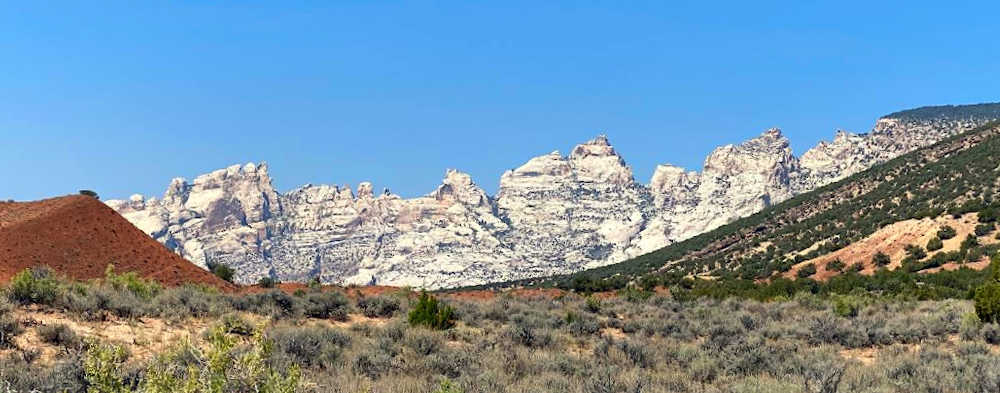 October 4, 2021
October 4, 2021The Homestead of Josie Bassett: Legends and Folklore
“Well-behaved women seldom make history.” I’m sure you’ve heard the saying, and it seems true enough. Earlier this summer while traveling through Utah, I encountered a woman history remembers, an unforgettable woman who, by the standard of her time, was definitely not well-behaved. Let me tell you about her, so you can remember her, too.
Have you heard of Josie Bassett, or perhaps the Bassett sisters—Josie and Anne? If you are a student of history, you may know that the Bassett sisters were closely connected to Butch Cassidy and the Wild Bunch. In fact, if you search for Josie Bassett on Google, you will see many pictures of Butch Cassidy, or even Josie’s sister Anne, but few of Josie herself. What a shame.
Josie was born in Arkansas in 1874, but when she was just a few years old, her parents moved to Brown’s Park, a mountain valley that spanned northeastern Utah and northwestern Colorado. Her little sister Anne came along in 1878 and was the first white child born in northwestern Colorado. Their mother, Elizabeth Bassett, was fiercely free-spirited, and both girls learned to ride horses and run cattle and rope as good, if not better, than any man.
Everyone was welcome at the Basset family ranch, saint and sinner alike, and it was a favorite stopover for all sorts of travelers. Herb Bassett, the girls’ father, did regular business with outlaws, selling them beef and horses, and perhaps this is how Anne became involved with Butch Cassidy when she was 15.
Both Josie and Anne had relationships with Butch Cassidy at different times, as well as other members of the Wild Bunch. But unforgettable women are not defined by the men in their lives—they play the lead in their own stories. The Bassett sisters were far more than embellishments in Butch Cassidy’s story.
Before you make assumptions about Josie or Anne, know that they were both well-educated. They attended a prestigious East coast boarding school and spent many hours in their father’s extensive library. And they were both considered stunning beauties, although they had different builds and features. These two sisters were just as elegant as they were fierce and independent, and they both chose ranch life over lives that might be characterized as more civilized.
Josie Bassett was married five times. She divorced four husbands and survived one. It’s not entirely clear whether that husband died of alcoholism or if Josie poisoned him, but she was acquitted of the charges at trial. She ran her father’s cattle ranch for many years, while her sister Anne ran her own cattle ranch. Then in 1913, at the age of 39, Josie left her father’s ranch and established her own homestead in northeastern Utah. One of her two sons helped her build a cabin on the land, and she spent the next 50 years living there alone.
Josie was a bootlegger during the Depression, as well as a skilled deer hunter, although technically some of the deer were poached. She was accused of stealing cattle, although she convinced the court that she was framed for that. She made her own clothes and her own soap and grew most of her own food. She lived on her homestead until she was 89, when she broke a hip tending to a horse. She was hospitalized and died a few months later at the age of 90.
Josie’s homestead is now part of the Dinosaur National Monument, and you can still see her cabin, her orchard, and the box canyon where she kept animals. It’s not a place you’ll happen upon by accident, so if you want to see it, you’ll have to go on purpose. Enter the park from the Utah side, not the Colorado side. Then drive past the visitor center and the quarry hall, past the petroglyphs and nature hikes. When you pass Turtle Rock and cross the Green River, the pavement will end, but keep going. It’s a pretty drive, so enjoy the scenery. The further you go, the narrower the road gets, but don’t give up. Josie’s place is at the end, the cabin where she lived with no electricity or running water until 1963.
So, why did I visit her old homestead? I was curious, I suppose. When I saw her cabin on the park map, I did some quick research and was surprised at what I found—a kindred spirit. I, too, have made choices that some people envy and other people don’t understand. I, too, seem brave and fearless to some, incomprehensible to others.
I walked around Josie’s homestead, thinking about the years she spent there living alone, tending animals and a garden, chopping firewood, canning food, making clothes and soap, and doing the myriad of activities required to survive in a place like northeast Utah. I wondered if perhaps Josie felt the same way I feel about some of my choices—I haven’t chosen the easiest path, but I’ve chosen the only one I can bear.
Do you think I’m a woman who is wild and free, who lives life on her own terms? If your answer is “yes,” you aren’t wrong. I go where I want, when I want. I spend my time the way I want, writing books and blogs. I meet interesting people and do interesting things. It’s all true, but it’s not the complete story. In the unabridged version, “wild and free” often translates into “misunderstood and alone.” “Untethered” becomes “adrift,” and “independent” becomes “overwhelmed.” If you think it’s rainbows and roses, don’t forget that rainbows follow storms, and roses have thorns.
We all have blessings, and we all have mountains to climb. That’s as true for me as it is for anyone. I won’t assume that I understand Josie Bassett’s blessings, or her challenges, because I know too well that many of the assumptions people make about independent women are wrong. But today I raise my glass to Josie Bassett, to her memory and her legacy and to every ounce of inspiration we can take from her life, whether she intended to inspire us or not. Thank you, Josie, and cheers!
Josie Bassett’s Homestead -
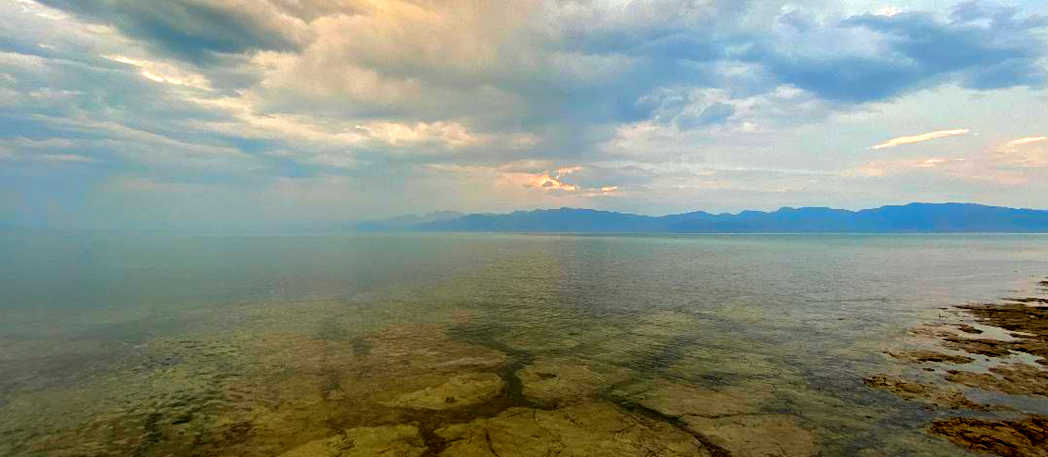 August 31, 2021
August 31, 2021The Stone Mother at Pyramid Lake: Legends and Folklore
Pyramid Lake sits in northwestern Nevada, north of Lake Tahoe. It is clear and deep, blue in some places and turquoise in others. It is surrounded by tufa rock formations, created long ago by calcium carbonate that settled out of the lake water. It is home to many birds and some really big fish.
Crash and I camping at Pyramid Lake Today, the land surrounding the lake is mostly desert, but tens of thousands of years ago, it was covered by the water of Lake Lahontan. At its fullest, Lake Lahontan covered over 8,500 square miles, plunging to a depth of 900 feet in the place where Pyramid Lake remains. Most of Lake Lahontan evaporated as the climate warmed, and Pyramid Lake is its largest remnant.
People have lived along the lake for thousands of years, but there is one resident in particular you should know—the Stone Mother. Do you want to meet her? Let me tell you her story as I heard it, from the Pyramid Lake Paiute Tribe, whose tribal land encircles the lake.
Long ago, the mother of all mothers had four young children, two boys and two girls. She and her husband lived happily with the small children, teaching them how to live well and rightly in the world. But as the children grew, they began to quarrel. The mother tried to help her children resolve their differences, but the more they grew, the more they quarreled. She counseled them, pled with them, and eventually admonished that they must get along if they were to all live together. But the quarreling continued.
One day the mother realized that her children could not live together in peace, so she gathered them before her and sent them away. She sent two of the children north, the other two south. She told them to light a fire each night, to signal that they were well as they journeyed to find new homes. The children set out, two north and two south, and she waited and watched for their fires.
On the first night, she looked to the south and saw a fire, rejoicing that two of her children were well. But when she looked to the north, she saw no fire. She watched and waited, but saw only darkness in the northern sky. On the second night, she looked to the south and saw a fire, but the northern sky was barren. She watched and waited, but no fire appeared. On the third night, she looked again to the south and saw a fire, but once more, there was no fire to the north. She watched and waited through the night, but the sky remained dark, unbroken by any flame of hope.
On the morning of the fourth day, she started to cry. She cried and cried, inconsolable as only a mother with lost children can be. Her heart grew colder with every tear that fell, until it grew so cold that she turned to stone sitting next to her pool of tears that we now call Pyramid Lake. Here the Stone Mother remains, sitting beside her basket in the place where she watched and waited for her children’s fires. What remains of her grief stretches eight miles wide and nearly thirty miles long. It is over 350 feet deep and contains more than 7 trillion gallons of water.
Pyramid Lake, Nevada Do you doubt that a mother’s tears could run so freely, her grief so deeply? I don’t doubt it. In fact, I believe the Stone Mother still cries, even though her stone eyes shed no tears. She has many reasons to cry, for if she is the mother of mothers, aren’t we all her children? Haven’t we all taken the life she gives and given no assurances in return? Haven’t we been hateful to each other, coming together in strife instead of kinship? Haven’t we forgotten how to live well and rightly in the world? Wouldn’t any mother cry?
I arrived at Pyramid Lake on a Friday afternoon and stayed until Monday morning. It was an amazing place to work on my next book, but the most amazing thing I witnessed was how dramatically life around the lake changed over the course of three days. Friday and Saturday, the shores were packed with campers. Boats and jet skis zoomed across the water, pulling skiers and tubes and rafts. People swam and paddled and floated and played. Engines roared, and music blared. Campfires and fireworks vanquished darkness. Food was grilled, drinks were poured, and laughter was shared by many late into the night.
Then on Sunday morning, the campers went home, leaving only a few tire tracks and trash they should have taken with them but didn’t. The spirit of the lake emerged, no longer encumbered by the turbulence we insist upon overlaying on the world. Waves lapped against the shore, and a damp morning breeze blew blissfully across my face. Rabbits hopped between bushes, and birds floated on the water and the wind.
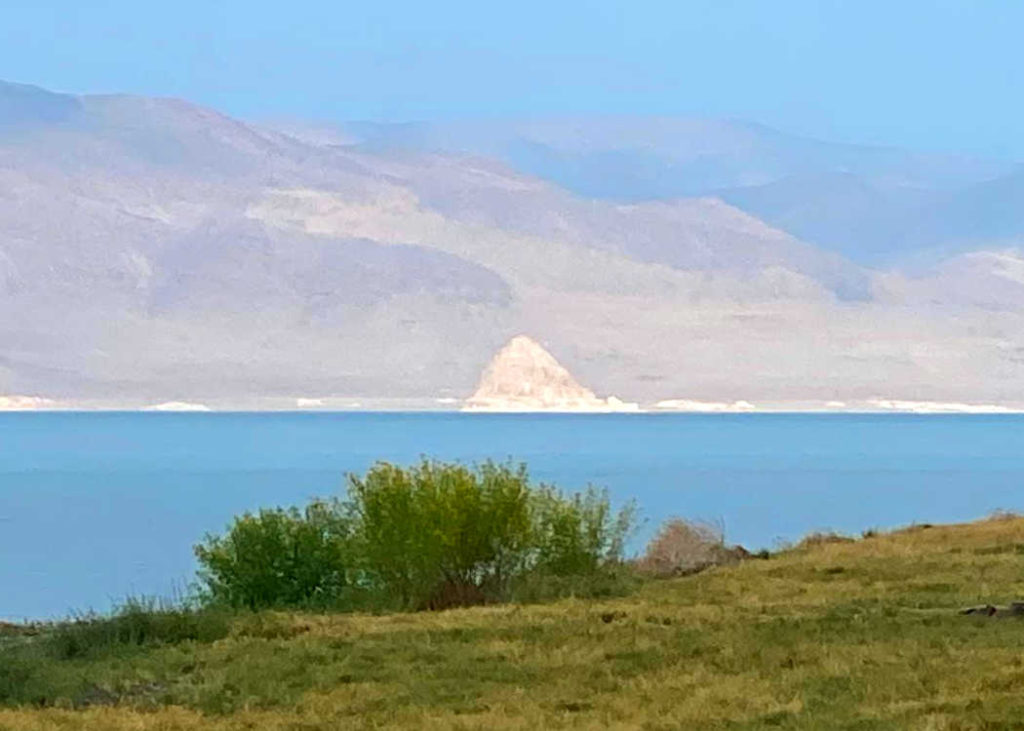
The place across the lake, where the Stone Mother sits, in a beam of sunlight I swam in the lake of the Stone Mother’s tears, moving through ribbons of cool and warm water that swirled together like conflicting emotions. I didn’t get to visit the Stone Mother, herself—the area has been closed to the public for years. But she had her own way of saying hello. As I immersed myself in the lake, a ray of sunshine broke through a cloudy sky and beamed down upon the place where the Stone Mother sits, bathing her in golden light I could see across the water.
When the sun set behind the mountains, bats began to playfully dart around me like butterflies of the night. Darkness enveloped the sky, interrupted only by a single bolt of lightning I saw to the east. I began to wonder—have I overlaid my own peace with chaos, or do the trappings of my life merely hide a lonely void where peace cannot reside?
I have a lifetime to ponder such things, but I had only one more night to spend at Pyramid Lake. So I deferred my questions, choosing instead to hear the lapping of the waves, to feel the cool evening breeze. Then, on the morning the fourth day, I left the Stone Mother to her vigil as she watches and waits for her children in the north to light their fire.
-
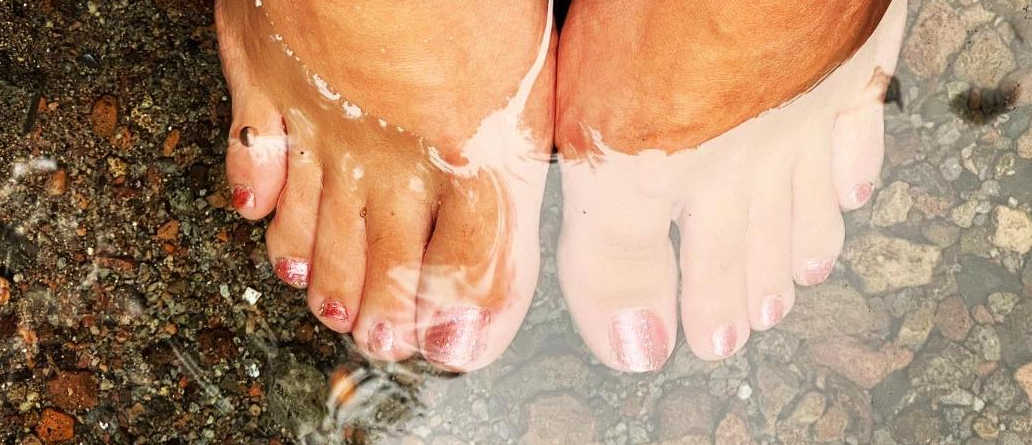 July 25, 2021
July 25, 2021Mountains and Trees: Walkabouts and Wanderlust
Hello, friends. Are you wondering where I’ve been? I am here, in northern California at the base of Mount Shasta, although I’ve been many places since I last wrote to you from Presidio, Texas.
I spent the spring watching the mountains come alive at Eagle Nest Lake in New Mexico. I watched the sage grow, wildflowers bud, and snow melt off the mountaintops only to reappear with early spring storms. I watched the water run down, letting the earth claim what it needed before flowing into the lake. It was messy—muddy, stormy, windy, and often cold, but I suppose the circle of life isn’t always neat, that cycle of sleep and wakefulness that envelopes us all.
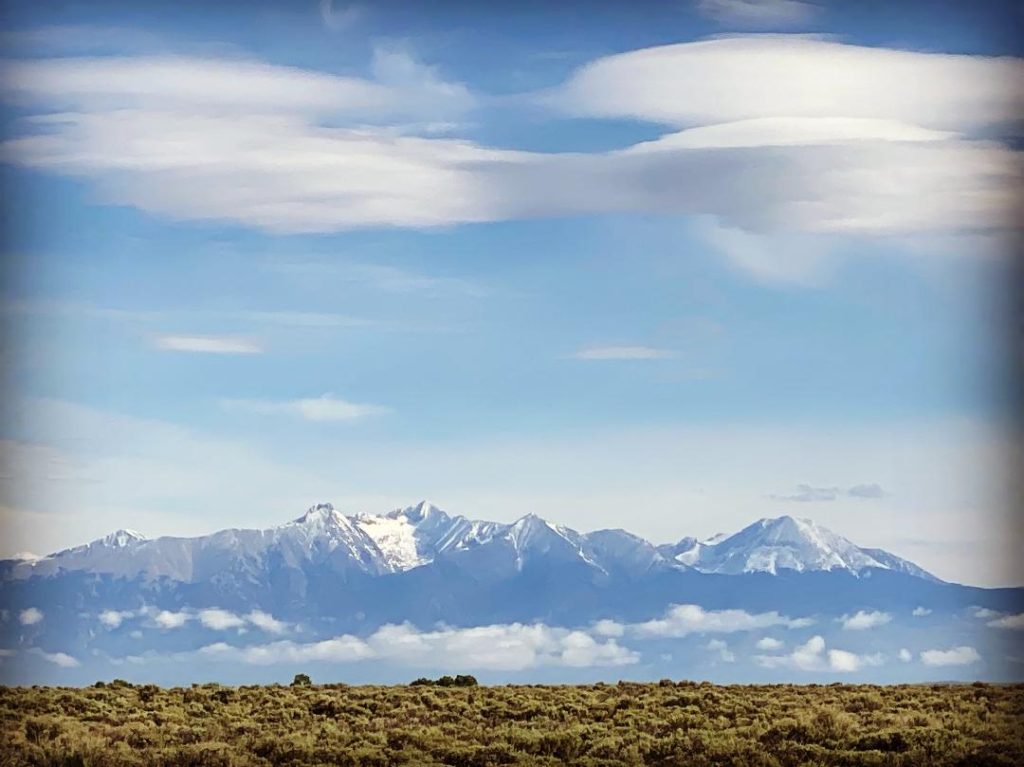
Sangre de Cristo Mountains The mountains were as magical as I let them be. Sometimes they floated down from the heavens, while other times they jutted up from the earth. They were always vast, filled with a lifetime of trails to walk, rivers to fish, and lakes to explore. Only the sky was bigger, filled with light and clouds that took my breath away.
The mountains were quick to remind me that no matter how highly I think of myself, I am smaller than the world, just a single cell within a vast organism. Insignificant? Perhaps, but this doesn’t have to be a bad thing. Isn’t there freedom in insignificance? Doesn’t insignificance allow me to be who I am instead of who the world claims to need?
I didn’t mind feeling small, because I was never alone. The rugged terrain teems with life. I was especially fond of the ravens, and I believe they were fond of me. But I appreciated everyone living in the mountains—the deer, the elk, the fish, the hawks, the cougars, the badgers, and of course the prairie dogs. I have no doubt that the Eagle Nest prairie dog population rivals any major American city, and I wonder what secrets their underground cities might hold. Of course, if I knew, they wouldn’t be secrets, would they?
Eagle Nest, New Mexico 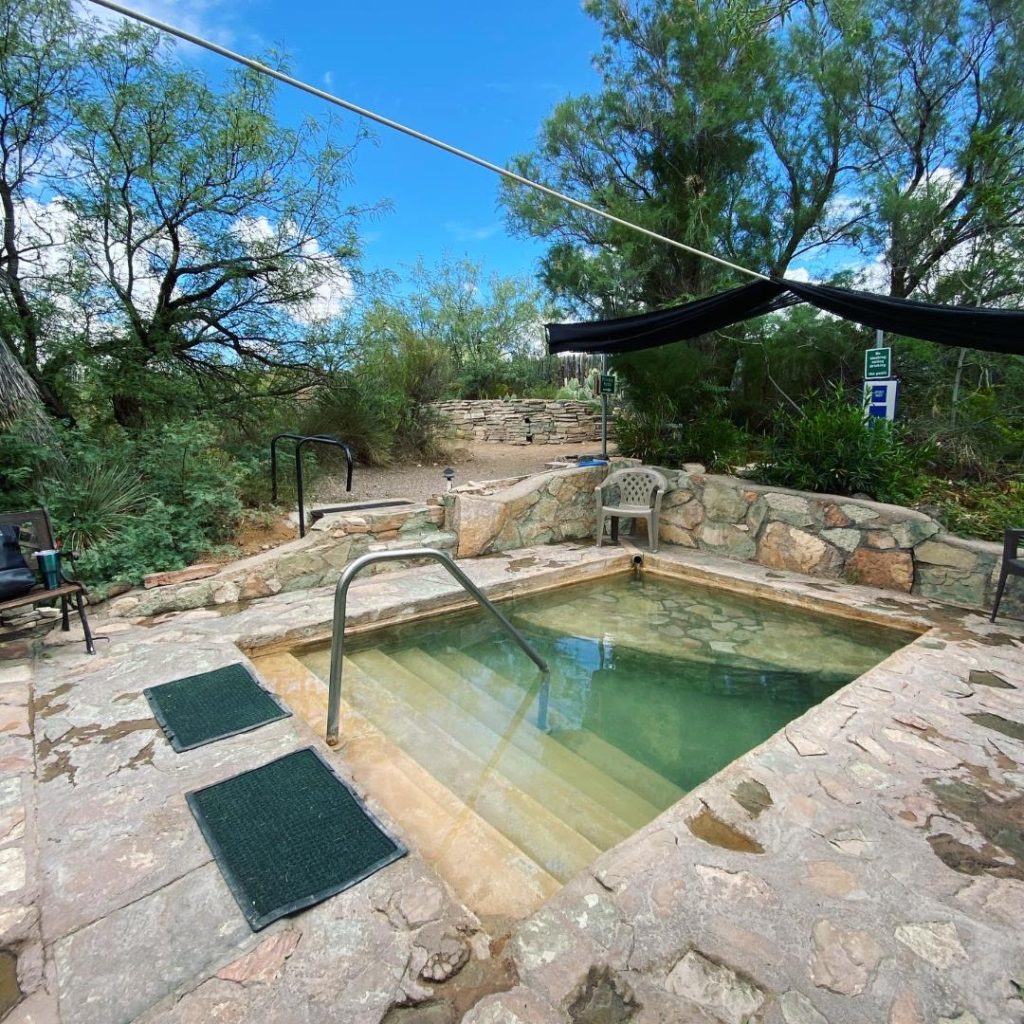
Faywood Hot Springs When it was time to move on, Crash and I ventured south to the Faywood Hot Springs Resort for two weeks, outside of Silver City, New Mexico. That, too, was a magical place, although the magic lived in sand and stone instead of rivers and lakes. The lizards escorted us along the trails by day, the tarantulas by night. And we had the privilege of watching a slew of baby peacocks learning the gifts and limits of their wings as their beautifully plumed parents watched from a distance. The hot springs were healing in ways I cannot describe. All I can say is that I sat in them for hours each day, and the rest of the time I spent working on the sequel to Evolving Elizah: Initiatum.
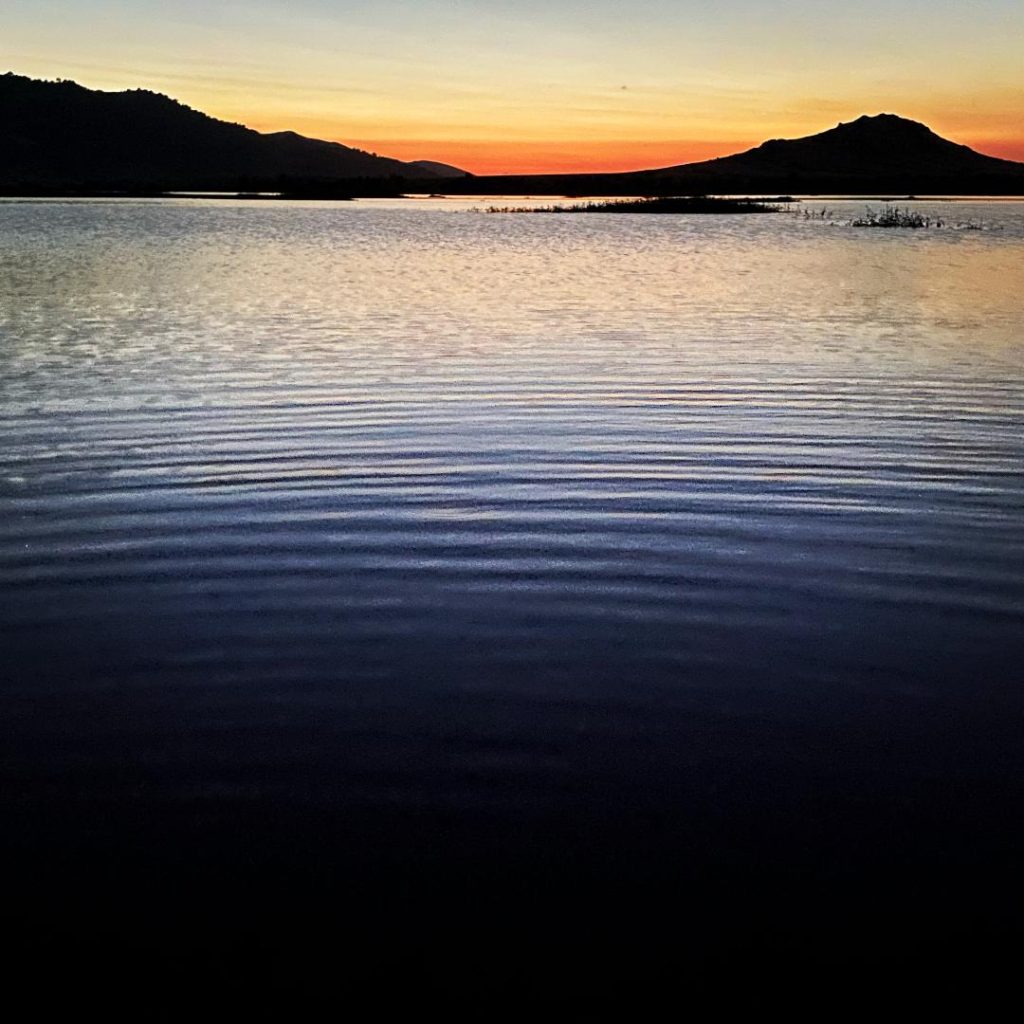
Success Lake Then it was time to travel again. Restored and revitalized, we pointed west and made a mad dash toward the tall, tall trees, stopping to sleep outside of Flagstaff, Arizona in a beautifully peaceful forest. We arrived in Porterville, California, the following day, where we stayed at Success Lake for two nights—long enough for me to spend a day finding what remains of the giant sequoia trees in the Sequoia National Forest.
You may know that some of the groves burned in the Castle fire last year, but thankfully the Trail of 100 Giants remains. I drove through miles and miles of narrow, winding, scorched mountain roads to see them, praying at each turn that I wouldn’t fall off the side of the mountain. The trees seemed almost as big as the mountains, making me once again realize how very small I am, just a flash in the pan compared to these gentle giants who have been rooted in the same spot for nearly 2,000 years.
Trail of 100 Giants 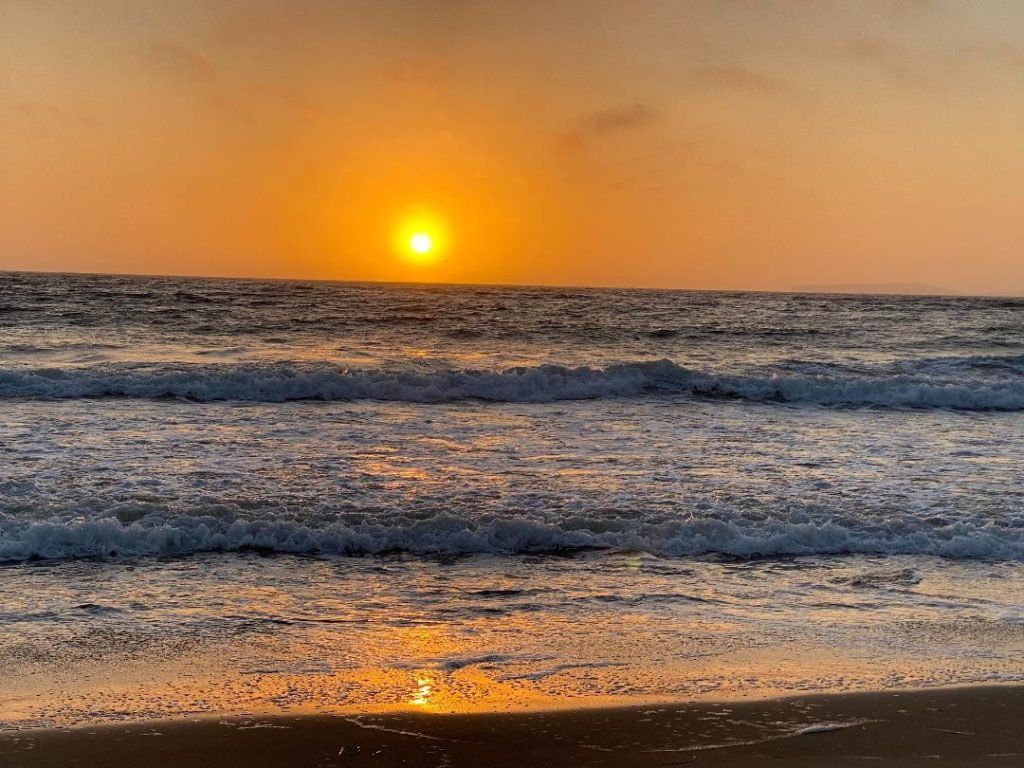
Dillon Beach, CA It was hot in Porterville, about 104 degrees Fahrenheit, and Crash was content to wait in the air-conditioned camper while I ventured out alone. But relief was forthcoming, as the temperature dropped almost 40 degrees when we headed north to Dillon Beach, California. We had a nice time camping on the beach, just behind the dunes and surrounded by joyful people enjoying the sand and the waves.
One day, I ventured down toward San Francisco, to Muir Woods in search of giant redwoods. I walked eight miles in the park, among the huge trees that once again reminded me just how small I am in this world. Of everything in the grove, I would most like to remember how it smelled. The dry, clean scent of evergreen trees is a quiet melody on an otherwise blank sheet of music, playing in my memory as I think of visiting the trees with my grandmother when I was a child.
Muir Woods Now I am here, at the base of Mount Shasta, which looms over me as if I’ve forgotten that I am but a speck on the fabric of time and space, a small segment of a long thread woven into the cloth. I haven’t forgotten. The message echoes clearly in the chasm of my thoughts, the void where my heart has been hiding recently. This is partly why I haven’t written to you—my thoughts reach out, searching for a message to give you, a story with meaning. But I can’t seem to reach beyond the world’s whisper, which repeats on an endless loop. “Don’t you know how many writers there are? How can you dream of succeeding among so many?”
I don’t know if I can succeed among so many, but I know this—each of the 2,000-year-old sequoia trees, which stand over 200 feet tall, started from a seed even smaller than me. If fear and doubt can grow in a void, can a writer’s identity also grow? Can hope echo as loudly as condemnation? What difference does it make, anyway, if I succeed or fail? All I can do is plant myself and reach for the sun.
-
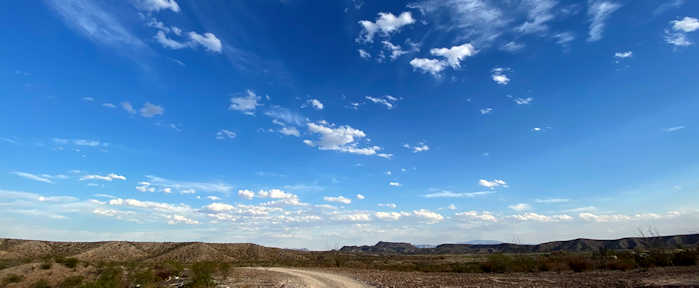 April 20, 2021
April 20, 2021A Desert Epistle: Walkabouts and Wanderlust
Why the desert? It’s a question I’ve received more than a handful of times when telling people about my travels. The desert is an amazing place, if you allow yourself to see it. I came to the desert to write. And I’ve been so busy writing the sequel to Evolving Elizah: Initiatum that I haven’t given enough care and thought to how to share my love of this place with you. So, on one of my many walks, I asked the desert for inspiration, and this is what she told me for the asking.
Hello, dear child. I’ve been waiting for you. What have you come to find? Speak plainly, because you will answer for all you say and do. You’re seeking truth, you say? Are you sure you want to know the truth? It’s such a common thing to say, but uncommon to mean.
I have gifts for you. Are you willing to receive them? Come, let me embrace you. Tell me your stories, and I will tell you mine. Come home, my child, at least for a little while.
Can you hear the song I sing for you? You’ve been away too long—you must remember how to hear it. Purify yourself as you walk on hot dry sand. Let the wind winnow the chaff of days past. Let the sun burn away the nonessential. Did you think it would be easy? No child, there are no shortcuts here, but I waste nothing—not even your suffering.
Do not undertake this journey lightly, or I will bring you to your knees. I will deconstruct your world in a tempest gale, transform everything you know into a suffocating slurry of sand and air. I will relegate you to the blinding sameness of everything unmanifested. I will not suffer insubordination, and if you try to command me, I will break you. I will burn you with heat and flame. I will transform the very air you breathe into lightning, striking terror in your fearless heart.
Do you think this means I don’t love you? Oh child, I love you dearly. I love all of my children. So, if you want to be the favorite, you must earn that favor with all who live under the sun. I only want you to hear my song. Don’t you want to hear it?
You come here seeking truth. But your ears are too full of lies to hear my whisper, your sight too clouded to see the path I lay before you. You must see that which needs to be seen. Hear that which needs to be heard. The sun, the moon, the stars—they all wait for you. They all wish to commune with your heart.
See the path I laid for you. Walk it with adoration for all it shows you. Leave your delusions behind or watch them wither—I will not sustain them. You may be weary, but you’ve come too far to turn back now. Did you think your decision had no consequence, that your desire had no cost? You said you wanted to know the truth.
Take the space I freely offer and learn to sing. Listen for the melody as doves cry, hawks scream, and coyotes howl. Hear the wind whistle as a river burbles over sunbaked rocks, butterfly wings fluttering in time to the beat of your heart. Do you hear your place in the ensemble? It’s there, between the notes, in the deafening silence that only your voice can fill.
Comprehend the beauty all around you, and when you love it as much as I do, you will know the truth. Offer me a most cherished sacrifice–your tears–and you will hear my song. Did you forget that the most precious notes are written in the language of water? Those blessed drops, infused with my love, yield the greatest gift of all—life.
Receive my gifts, and we will all celebrate you. Flowers will bloom and angels sing as we welcome you home, dancing in the rain of my own joyous tears. Come, my child. Dance with me, and stay awhile.
Presidio, Texas -
 March 21, 2021
March 21, 2021Desert Vibes: Walkabouts and Wanderlust
Welcome to Presidio, Texas. Where, you ask? It’s a small border town–the only border crossing for hundreds of miles between El Paso and Del Rio. The temperature today is a cool 82 degrees Fahrenheit, the skies are blue, the sun is bright, and the humidity is low.
If you think this part of Texas is barren, you might be surprised at how much you can see and do. You can check out the art scene in Alpine or hike a canyon trail in the Big Bend state or federal park. You can visit the McDonald Observatory and drive through the Davis Mountains. Or, if you’d rather go east, take a scenic drive down Highway 170 towards Terlingua. Be sure to stop in Lajitas where the mayor is always eager to see you–pay no heed to the fact that he’s a goat.
I, however, spend most of my days at the RV park. It’s a nice place filled with nice people. I peck away at my stories and work on new marketing plans for my novel Evolving Elizah: Initiatum. I walk with Crash on desert trails, and some days I ride my bike to a nearby wetland to watch the sun go down. I’m not entirely sure if it’s birds or angels singing and dancing across the golden water, but I’m pretty sure it’s angels.
Instead of going and doing, I choose to be at peace, and it’s easy enough to find. I hear it in the melody of the mourning doves, and I feel it in the desert breeze that blows blissfully across my sun-warmed face. I see it in Orion’s Belt, the Big Dipper, and Cassiopeia as I study the night sky, wrapped in a cloak of darkness that hides all I am and all I’ll never be.
Most days, it’s enough for me. But occasionally I feel the need to go and do, to overwrite old memories with new ones. You see, I’ve been here before. I have clear memories of this place, even though nearly four decades have passed.
I was about seven when my family traveled from Odessa to camp at Big Bend. We had a solid history of miserable family vacations, and in that sense, our visit to Big Bend was typical. What made this trip different is that we weren’t alone–my paternal grandma and her husband Frank flew out to Odessa from San Francisco to go with us.
Six of us squeezed into dad’s company car–a gold Chevrolet Caprice Classic. Mom, grandma, and my sister rode in the back seat. As the smallest and youngest person, I had a dubious seat of honor in the front, wedged between dad and Frank.
I imagine that car ride is the closest I will come to knowing how an ant feels, just before combusting under a magnifying glass on a sunny day. In the Davis Mountains temperatures hovered around 100 degrees Fahrenheit. Beyond the mountains, temperatures soared to 120 degrees. Frank, a heavy drinker with no heat tolerance, sweated puddles as the sun shone through the windshield. Dad blasted the air conditioner to no avail, aiming all the vents at Frank while the rest of us roasted.
To further complicate matters, we also had to stop for groceries along the way. Mom and grandma clashed over food purchases just like the archenemies they were, a reminder of how much they despised each other. I don’t recall how they both survived the conflict, but somehow we continued our journey, dad’s car drooping under the added weight of groceries and animosity.
I thought my senses were fully engaged as we drove along the vast empty stretch of road that would take us to the other side of nowhere. My eyes and nose were fully consumed by Frank liquifying next to me, and mom’s strident and angry voice kept my ears fully engaged. But then I perceived something else–a clanging vibration of a piece of road debris dad tried to straddle, something metal that rolled and ripped its way down the underbelly of our sagging car. It didn’t take long to figure out that whatever he hit had punched a hole in the gas tank.
If we had known how to harness the power of my mother’s explosive fury, I have no doubt that the car could have run forever. But short of that, all we could do was keep going, watch the fuel level drop, and hope we made it to the next town–Alpine. Dad kept driving. Frank kept sweating. Mom alternated verbal floggings between dad (for his obviously inept driving) and grandma (whose excessive grocery purchase clearly weighed down the car too much to clear the debris.) I existed as quietly and unobtrusively as possible, waiting helplessly to see how it would all unfold.
We didn’t make it to Alpine, but we got close. Everyone except Frank, who was in the final stages of transforming into a human puddle, helped push the car over the crest of the last hill and into a filling station on the outskirts of town. Dad found an epoxy kit to patch the gas tank, and the rest of us found shade and cold drinks. We took to the road once more and found Big Bend, and now I’m here again.
My experience is much more pleasant this time. Instead of berating and abusing each other, Crash and I are kind. He waits patiently for me to wake up in the morning, and I wait patiently as his nose explores the vast mysteries of our desert trails.
My heart is different, too. The consequences of my life choices make my heart both sink in despair and soar on wings of victory, but at least they were my choices. I didn’t have real choices the last time I was here. Back then, my heart was filled with fear and anger–shame for my mom’s cruel nature and grief that no one would rescue me from it.
Now the desert feels like a different place–a more beautiful place, even though I know I’m the one who has changed. I try not to dwell on memories of our trip and what they mean, because there’s a real chance they don’t mean anything. Sure, I learned and grew through the hardship I experienced, but there are other ways to learn and grow–better ways. And so, I will add new memories to the old, and maybe even overwrite them–with desert winds and starry skies, a loving dog, and the singing of angels as the sun sets.
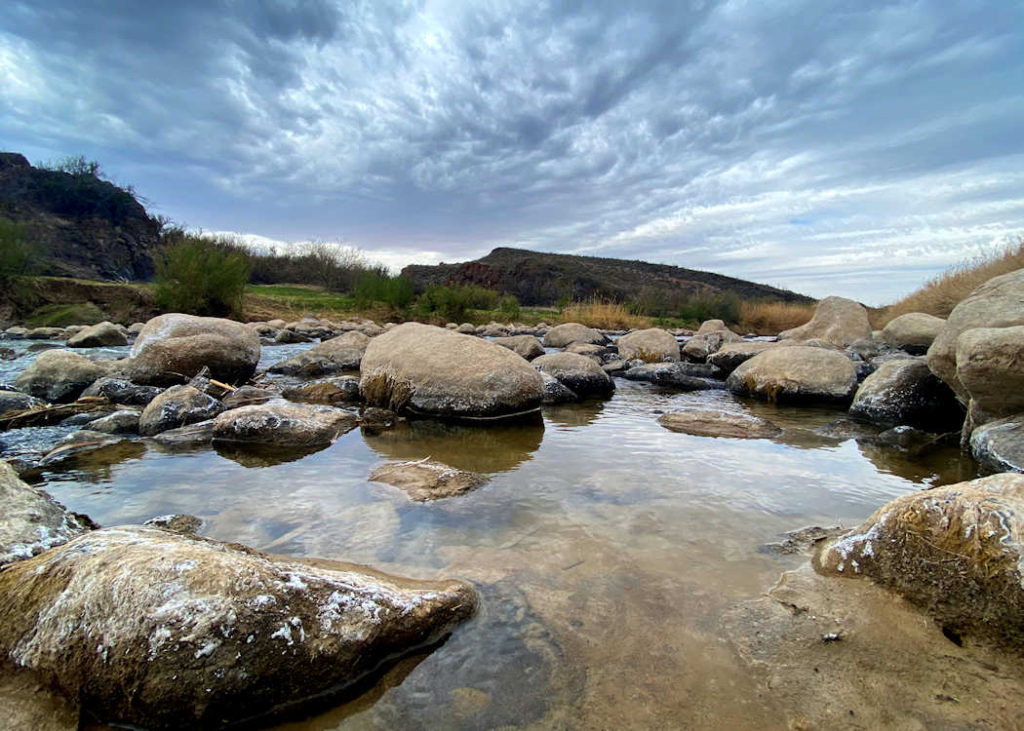
The Rio Grande at Big Bend Ranch State Park 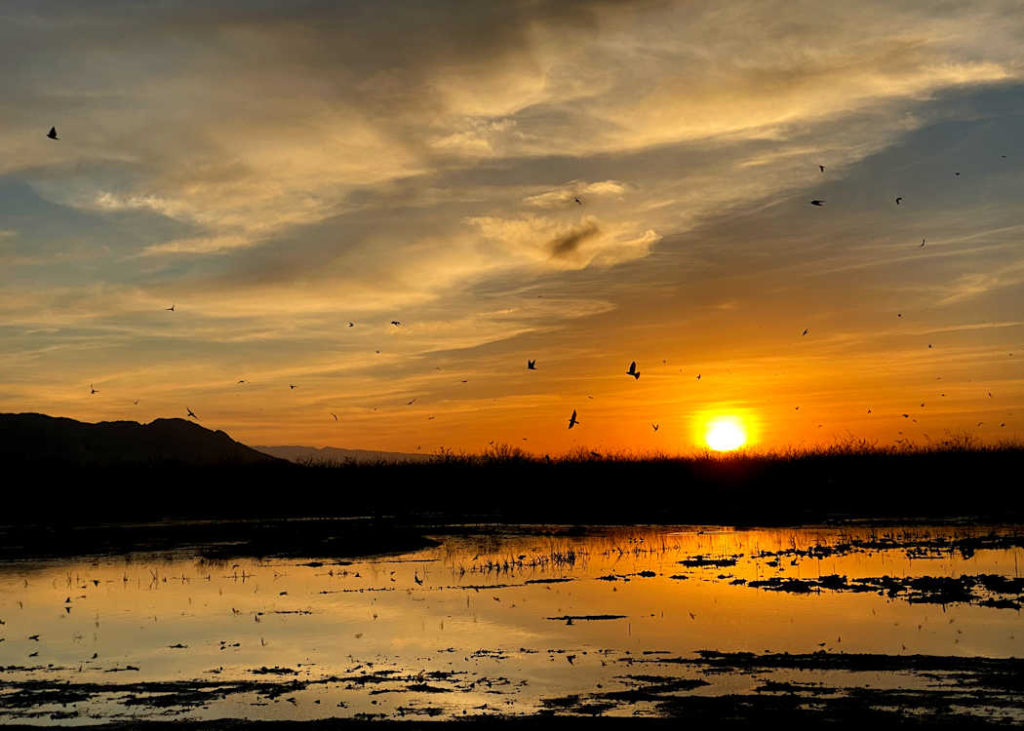
B.J. Bishop Wetland, Presidio, TX 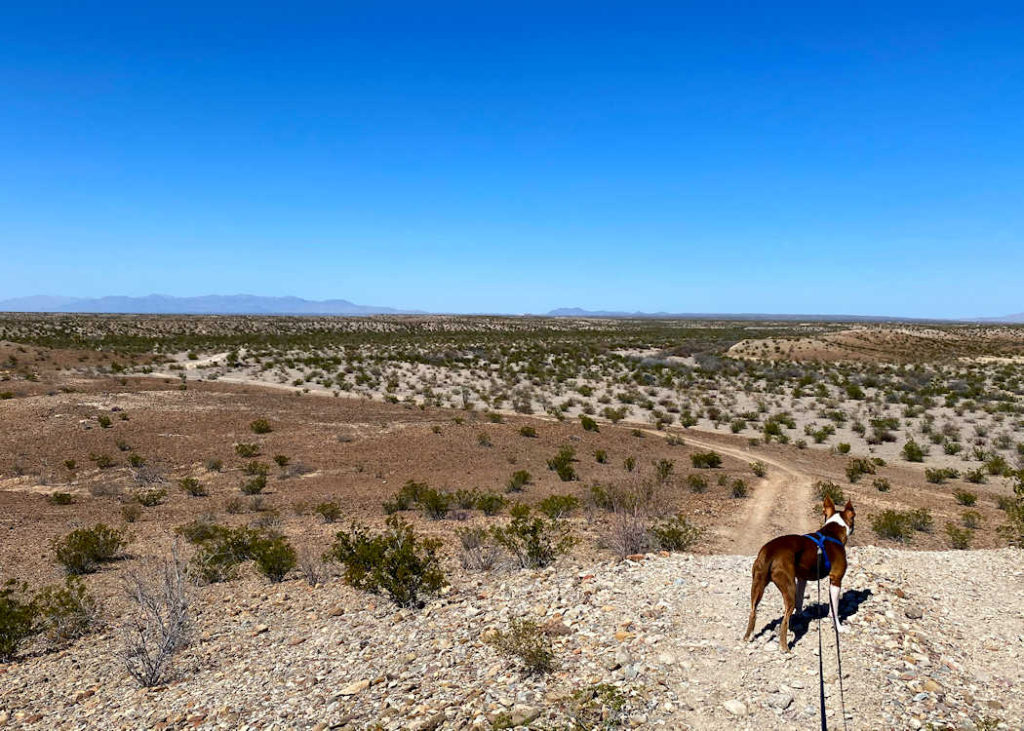
Crash assessing the desert -
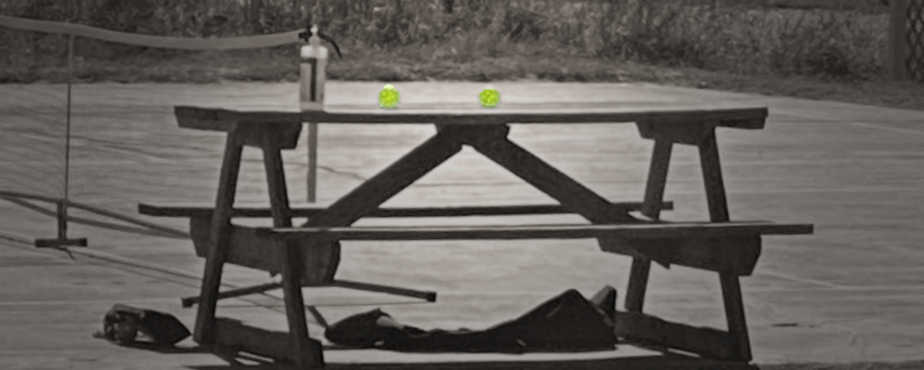 February 11, 2021
February 11, 2021Two doors down from pickleball
It’s a Thursday afternoon, the sun is shining, and you can find me at the RV park two doors down from the pickleball court. Can you see me? Look toward the ground, for two legs clad in Victoria’s Secret sweat pants sticking out from beneath a tall gray truck. Look for my striped socks and slide-on sandals. Classy, I know.
This is where Crash and I live, at least for a few more weeks. It’s a nice spot because each morning I am bathed in sounds of joy–laughter and cheers tucked between thwacks as pickleball players chase a green ball with their paddles across the painted court. Enjoyment seems so elusive these days, and it comforts me to know that I can witness it each morning as enthusiastic people show up with their gear to partake in the game.
By the time you find me under my truck, however, the pickleball court is empty. The excitement has transitioned two doors down, to my spot in the RV park.
What’s going on, you wonder? Two things.
First, I am installing steps on my truck. Steps are important because my truck is tall. Getting in and out of it can be a bit hazardous, and these steps have become a key part of my plan to living a long and healthy life.
Second, I am providing intrigue and entertainment to all of my RV park neighbors. The excitement has been building for two days, ever since I came back from the post office with very long box hanging over the tailgate of my truck. My neighbors have been passing by–on foot, in golf carts, or even in their own big trucks to take a closer look and to speculate about what I might be planning.
What’s in the box? They want to know. Is it for the truck or the RV? Could those be truck steps? Might they be the electronic kind that retract when the truck starts? Who will put them on the truck? They will approach me gradually, as they believe the time is right, seeking answers to their questions.
The first question came Wednesday afternoon as I sat at my picnic table appraising the myriad of parts that came in the box. It was a forthright “what are you doing?” from a man at least five spaces down.
“Steps,” I told him, pointing to the truck. He asked me if I had all the tools I needed and seemed surprised to learn that I did.
“You must be one of those mechanical girls,” he said, proceeding to offer up his best suggestions for how I might tackle the job. I thanked him for his good advice, and he laughed. “I rarely give good advice,” he responded, “but I take it even less than I give it!”
By Thursday morning I realized that I needed to stop trying to prepare and just do it. My neatly folded instruction manual offered no insight as I turned it this way and that, eyes searching fruitlessly for step one. I looked past the manual to the neat rows of plastic bags that segregated the parts. The sheer number of bolts, nuts, brackets, and washers overwhelmed me, each of them clamoring for my attention the way I’d love people to clamor for my newly published book, Evolving Elizah: Initiatum. All I could do was take my best guess and start bolting on parts.
Sooner, rather than later, it began to make sense.
Now I can see which pieces fit together, and when I realize I’ve used locking washers where I should have used plain washers, I take it all apart and start again. Why not? The sun is shining, there is a nice breeze, and I want to do the job properly.
Neighbors pass by, asking their questions and offering words of encouragement. I slide out from under my truck to retrieve a fresh batch of parts and comment to the latest passerby, “This might take me all day, but I’m going to get these steps on my truck.” He laughs and replies, “Well, what else do you have to do? If you were further north, you’d be shoveling snow.” Indeed.
I am struck with a realization. No one is judging me. I’ve received no criticism, no condescension–only words of encouragement. Perhaps my neighbors are skeptical of berating a woman with a socket wrench in her hand (especially one with striped socks and sandals,) but what difference does it make? They have offered me kindness and support, and I choose to accept it.
I take a moment to breathe in deeply, closing my eyes to feel the sun on my face, and then I check the ratchet on my wrench and slide back underneath my truck. Enjoyment seems so elusive these days, so I grab it by the tail and revel in satisfaction as my two hands make it all come together. I am pleased to spend my time this way, and isn’t that what it’s about? Indeed.
Time is one of the few things we all have in common.
We may live different ways in different places. We may speak different languages and want different things, but we all receive the same gift each moment we are here–time. The gift comes with a choice. How will you choose to use your time? How will I choose to use mine?
As my time on South Padre Island winds down, I find myself reflecting on choices I’ve made about how to spend my time. Some of my choices made me happy, others made me miserable, but I think the only time I truly wasted was the time I spent believing I had no choice in the matter.
I know now that we don’t have to make time for things we love. The time is already there, a gift we’ve been given so freely. All we have to do is choose how to use it. Enjoyment seems so elusive these days, but it doesn’t have to be. Not if we can be honest with ourselves about who we are and what we need and want out of all of this.
I open the door to my truck and gloriously place my foot on the new step, loving the ease I find as I climb up and then climb back down. Another neighbor passes by, checking my progress with a nod and a smile, and I conclude an afternoon well spent.
-
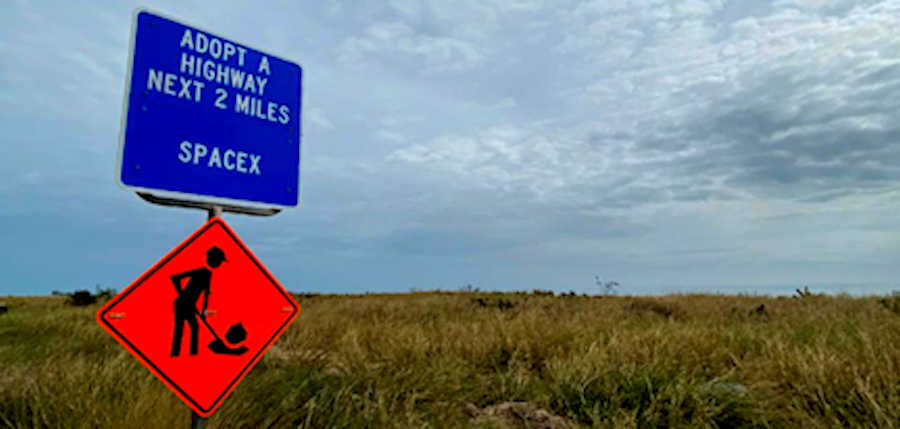 January 4, 2021
January 4, 2021Wildlife and rocket parts
On New Year’s Day of 2021, Crash and I ventured out with my sister to Boca Chica, Texas, to see the SpaceX Launch Facility. What dystopian science fiction author wouldn’t want to see this place of dreams, right down Highway 4? Besides, it was as good a way as any to put 2020 in our rear view mirror and start new chapters in our lives.
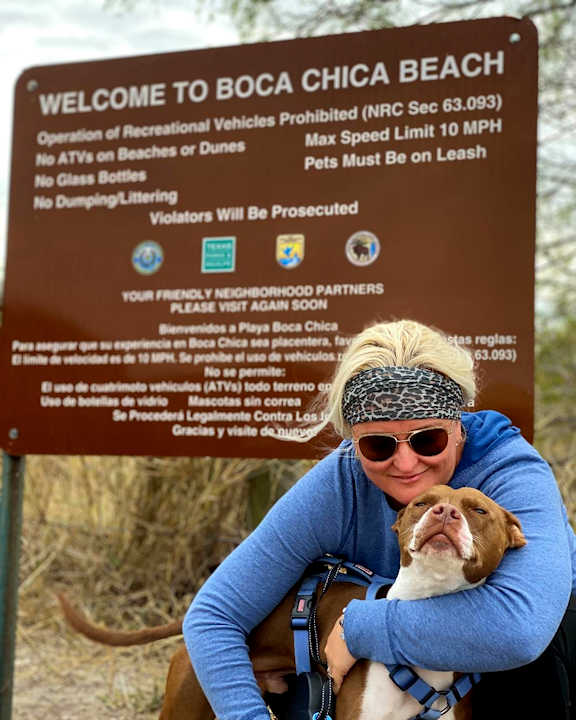
Crash and me Boca Chica is only about five miles down the coast from South Padre Island. But the journey by car spans 40 miles, circumnavigating the bridgeless Verdolaga Lake and the Brownsville Ship Channel. The drive may seem barren to the casual observer, and in the most obvious sense, there is nothing on the road to Boca Chica. But I encourage you to be more than a casual observer. Look beyond the obvious, and if you aren’t in a hurry, the land will reveal many seasons that have come and gone here–seasons not just of nature but of people, with all their hopes and dreams, fears and worries.
For instance, during the Mexican-American War, Boca Chica was the site of Camp Belknap, a staging point for over 7,000 volunteer forces. The men suffered an array of manmade problems (the war, overcrowding, and unsanitary conditions) as well as the habitat’s flora and fauna that sting, stab, and bite human bodies and souls.
It is also considered by many to be the site of the last Civil War battle. A full month after the Confederacy surrendered at Appomattox Courthouse, fighting erupted at Palmito Ranch between Union and Confederate troops. Both sides knew the war was over, so best anyone can guess, the fighting was about pride, money, or possibly resources like horses and cotton. If the commanders offered any explanations, they’ve been lost in the wind..
Even today, conflict continues in the area, but it’s a different kind of fighting–a fight for survival. Boca Chica serves as a wildlife refuge for sea turtles and a variety of birds, including endangered aplomado falcons and piping plovers. It is also home to one of only two known breeding groups of ocelots, wild cats who live in the thorn forests and mangrove marshes.
SpaceX rocket Painted on the backdrop of this conflict is a new plot twist for Boca Chica–a quest for the treasure of knowledge as man seeks to overcome the universe in Boca Chica Village. The settlement consists of a small collection of buildings and bears no city limit sign or population count. Instead, visitors are greeted by what might be an old propane tank, neatly painted in welcome. I have no doubt that the population is negligible, unless you count dreams and rocket parts. If you do that, the population is booming.
All humans are dreamers, but some of us dream bigger and louder than others. Elon Musk dreams so big and so loud that the world cannot help but notice, and those of us who hear the sound cannot help but respond to the call.
I responded to the call, driving down Highway 4 to see the rockets and the hangars that house them. They stand tall against the vast landscape, right next to the road like grain silos in America’s farmland. But instead of corn or wheat, these silos store knowledge–knowledge seeded by dreams, watered with perseverance, and harvested with rocket fuel.
Those who come stop along the road to witness and photograph the buildings and rockets that sit only yards away from the pavement. It’s all anyone can do since there are no tours or exhibits. I suppose that makes sense–we all want to share in the dream, but this is a place to test rockets, not entertain the public. Security officers are present but unobtrusive, gracious enough–at least for now–to those of us who creep down the shoulder of the road, yard by yard, pointing our cameras in awe at the future this place promises.
From the road, I see a new rocket standing tall, next to the debris of the last rocket that exploded short weeks ago. I am struck by the realization that this is the way of dreams. They aren’t all sunshine and roses, but there are no casualties–only lessons learned. What appears to be wreckage is not a failure, but only a spent piece of a larger dream, a stepping stone to move forward. This insight gives me hope as I look into my own winding, often-foggy dreamscape. I take comfort knowing that my imagination is interwoven with everything I see, for the dreams of science and science-fiction are hopelessly intertwined–feeding and inspiring each other, and holding each other to account.
I breathe in the excitement of Boca Chica and exhale slowly, sketching out the sequel to Evolving Elizah: Initiatum, and I allow myself to wonder. Perhaps someday… After the rockets are perfected, of course, and after Mars is or is not colonized… Perhaps that day, Elon–or someone like him–will dream of a space farm, similar to the Green Grow 3. Perhaps he will find it a worthy solution to the problems of the world, and perhaps he will take the words from my pages and mold them into something tangible.
Stranger things have happened, so I cannot discount the possibility that it will happen. Until then, I will keep writing.
SpaceX Launch Facility
Boca Chica, Texas -
 December 31, 2020
December 31, 2020There is no place like home…
I wait, I write, and I wait some more. There seems to be a lot of waiting in this writing game. Waiting for what, you wonder? Book reviews, I suppose. And maybe some sales reports, too—whatever is supposed to happen after launching Evolving Elizah: Initiatum on December 1. Do I even know why I wait? I toy with the possibility that I’m not actually waiting, but perhaps instead just wanting things to move faster, even though it’s all unfolding just fine.
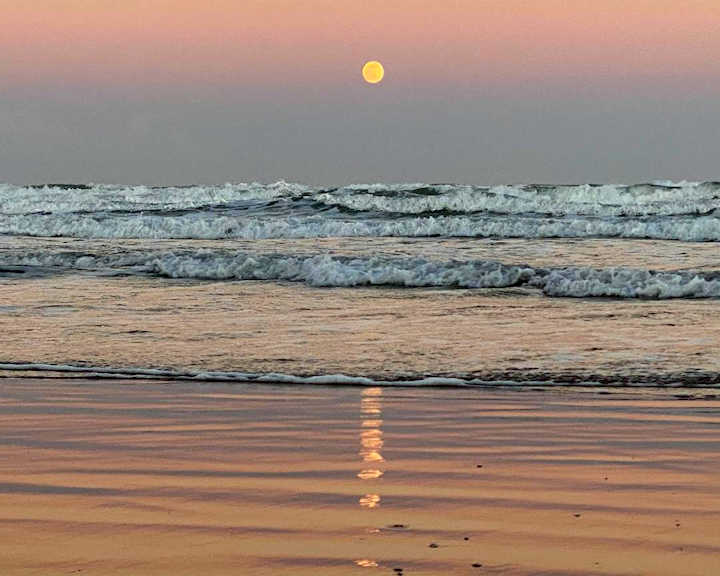
Full moon rising over the Gulf of Mexico 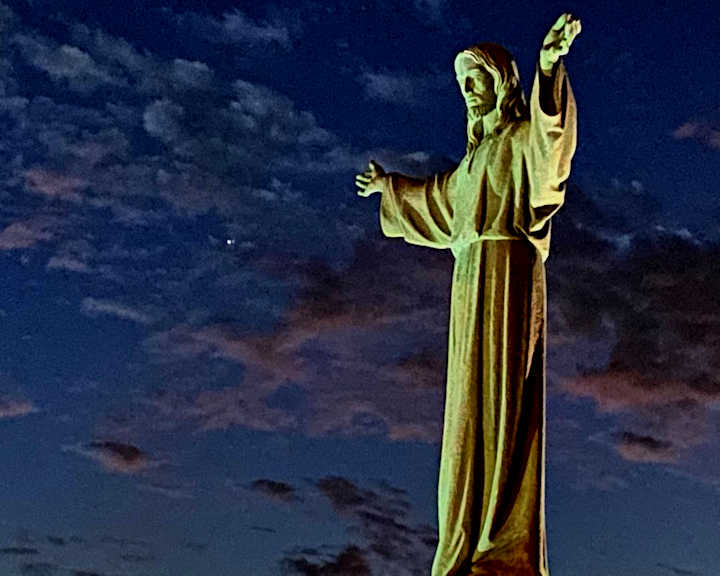
Cristo de los Pescadores at Isla Blanca 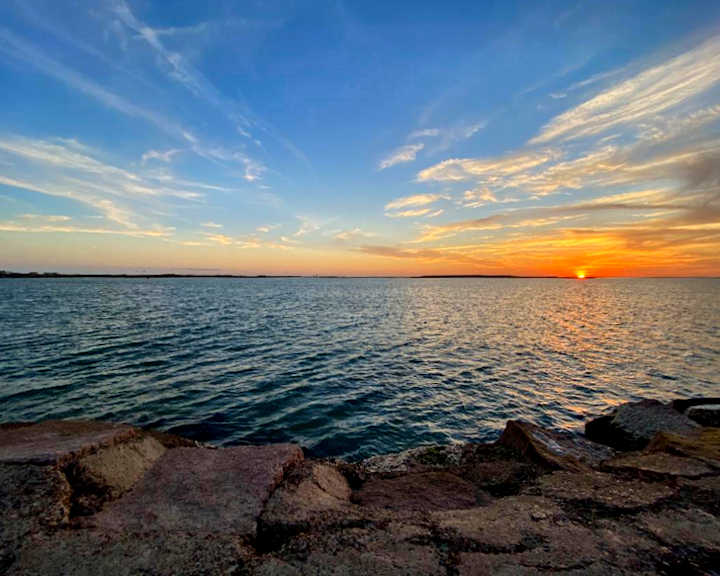
Sunset on the Laguna Madre
South Padre Island, Texas This is a way of being I know well—yearning to move faster, even when life becomes a blur. My heart is reluctant to race to the finish line, but my mind struggles forward, pushing harder and faster. Perhaps this is why I need to be here on South Padre Island—to learn how to slow my roll. I am trying. I try, I learn, and then I try again.
We are all moving. Even the ocean is in motion, and this is what I tell Crash as the tide steals away the shells he chases in the surf. But as the moon and the waves crescendo to a velocity that makes my head spin, I am reminded that everything comes in degrees, even in this magical place connected to the rest of the world by the Queen Isabella Causeway. Sometimes more can be overwhelming.
I first visited South Padre Island as a child, but I was so young that all I have are wispy memories of sand and surf. Besides, that was over 40 years ago—I doubt it is the same place even if I could remember with perfect clarity. And so I felt like I was seeing it for the first time when I drove across the 2-mile causeway two short months ago. The profoundly healing beauty of the Laguna Madre—the Mother Lagoon—birthed new life in me as I crossed to the other side.
As I struggle with my “waiting,” the island teaches me that the most magnificent sights can be seen by standing still. The sun goes up, and then it goes down. It commands witnesses, and I stand still to answer the call. The moon dances around the sky, waltzing amongst the stars. I quiet my mind and hear the perfect trinity of beats in each measure, the universe steadily keeping time as the veil dissolves between surf and sand. The water rushes in to find me, lapping around my feet and my knees, and then it recedes, luring me further into its depths—a siren’s song asking me to stay, beckoning me to make this place home.
But what makes a home? Is it the people? Is it the land? Is it merely a dream of a dream? Is it love? I don’t know. I have come to love this place, and yet, it’s not my home—it’s my teacher, and I still have lessons to learn.
-
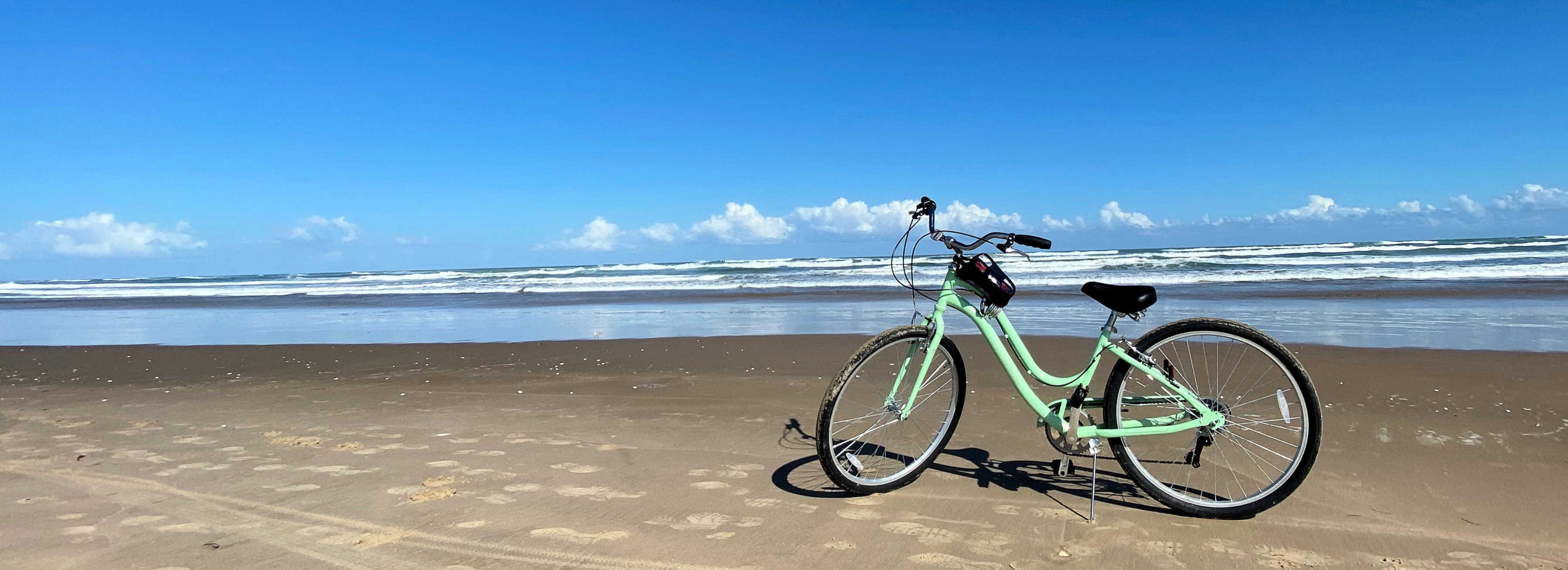 November 7, 2020
November 7, 2020This is Adventure
I wanted new wheels, but funds are limited until the sale of my house in Maryland is complete. So instead of buying a house on wheels or a new truck to pull a house on wheels, I bought a bike. Now when the tide goes out in the middle of the day here on South Padre Island, Texas, I pedal up and down the beach on the packed sand. In these moments I realize that I didn’t just buy a bike–I bought freedom on two wheels.
I’ve learned things about the island while riding my bike. I’ve learned that north is uphill, and south is downhill. Also, the wind usually blows from north to south. So when I pedal up the beach, the forces of nature are aligned against me. When I pedal down the beach, I feel like I am floating on the wind. On any given ride, I have to do both.
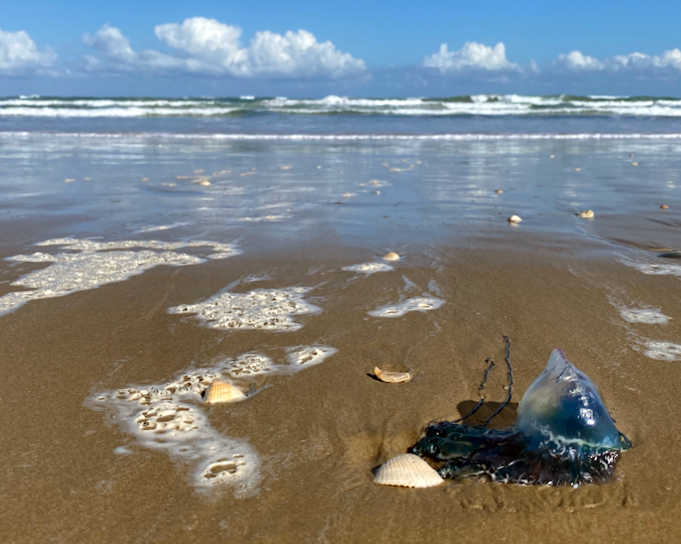
This is adventure, and I love it.
The weather is nice, the beach is peaceful, and my friends are jealous. I write until I lose momentum, and then I ride my bike on the beach. It’s not a bad way to spend the days–not at all. Getting here from Maryland, however, wasn’t all sunshine and rainbows.
I think back to a particular stretch of Interstate 10 in Louisiana–the Atchafalaya Basin Bridge. Eighteen miles of no shoulders, no exits, and extra wide trailers attempting to pass at the speed of light as I chug along in my 15-year old GMC Sierra pulling a U-Haul trailer.
My truck is a beast, and it has carried me through both heaven and hell in our travels together. It runs like a top, but it’s 15 years old. I don’t worry about the engine–I worry about whatever ancillary system might fail next. Like when the brake lines corroded and snapped. Or that time the front wheel bearing gave out, and the wheel caught on fire partway through Virginia. I’ve replaced a lot of parts on this truck. In fact, days before I started this drive, I replaced the power steering pump and an axle boot. But, there are still many parts that could need replacing.
At this point in the trip, I already know I need a new air conditioner–it wails like a banshee, echoing off the jersey walls of the 18-mile Atchafalaya Basin Bridge. Who knew I was supposed to shut off the air conditioning when towing my little U-Haul trailer uphill? Now I know.
Plus, the last time I stopped for gas and started the truck, I was greeted with an ominous red warning flashing across the dash–“Service 4WD Now.” But I already did the 4WD service, and I’m pretty sure the dealer told me that if I got an error message, it was probably just a faulty switch–nothing serious. Dr. Google advised me to shut the truck off for ten minutes, and that seems to have worked. The warning message went away, and I was certain it was fine to continue.
Okay, “certain” may be too strong of a word, but as I ride across the bridge, I can hear the steady hum of the motor–a soothing layer of sound beneath the wailing air conditioner that is strong and reassuring. I begin to dismiss the question of what happens if a vehicle breaks down on this shoulderless bridge where the trucks fly past using their lane and half of mine. My confidence slowly grows that I will survive this part of the drive.
I begin to find my peaceful center, and even the blown air conditioner seems to find peace as it settles into a barely perceptible whine. Wind whips through both open windows as another semi passes me–a short rig with no trailer attached. The truck lurches forward as it pulls into my lane, the driver determined to keep pace with the other trucks flying across the bridge at 80 miles per hour.
As soon as it pulls in front of me, billows of black smoke begin to pour out of the two exhaust pipes that jut up from the rig, making it hard to see. Ashy, crusty debris begins to fly in my open windows. I squint to see the road through the opaque cloud of black smoke, and I see orange flames leaping out the top of the exhaust pipes.
Crash (my semi-willing canine adventure partner) becomes concerned that the whole truck might explode, so I slow down to try and put some distance between us. The truck ahead of me slows down too, still belching black clouds of opaque smoke and flames. Other trucks are passing us, and I hope they are hailing this guy (or gal) on their radios and giving him (or her) good advice. I’ll never know. The smoke continues to billow, the flames continue to dance, and a scratchy piece of the crusty ash lands in my eye.
Eventually we come upon an exit, and the truck pulls to the side. I gratefully pass the smoking, flaming rig only to see it pull back on the highway behind me and accelerate again. But we are across the 18-mile bridge. We are further on our journey, and Crash settles back into his shotgun seat to contemplate what kind of therapy he might need when we finally get to the beach.
I guess this is adventure, too.
-
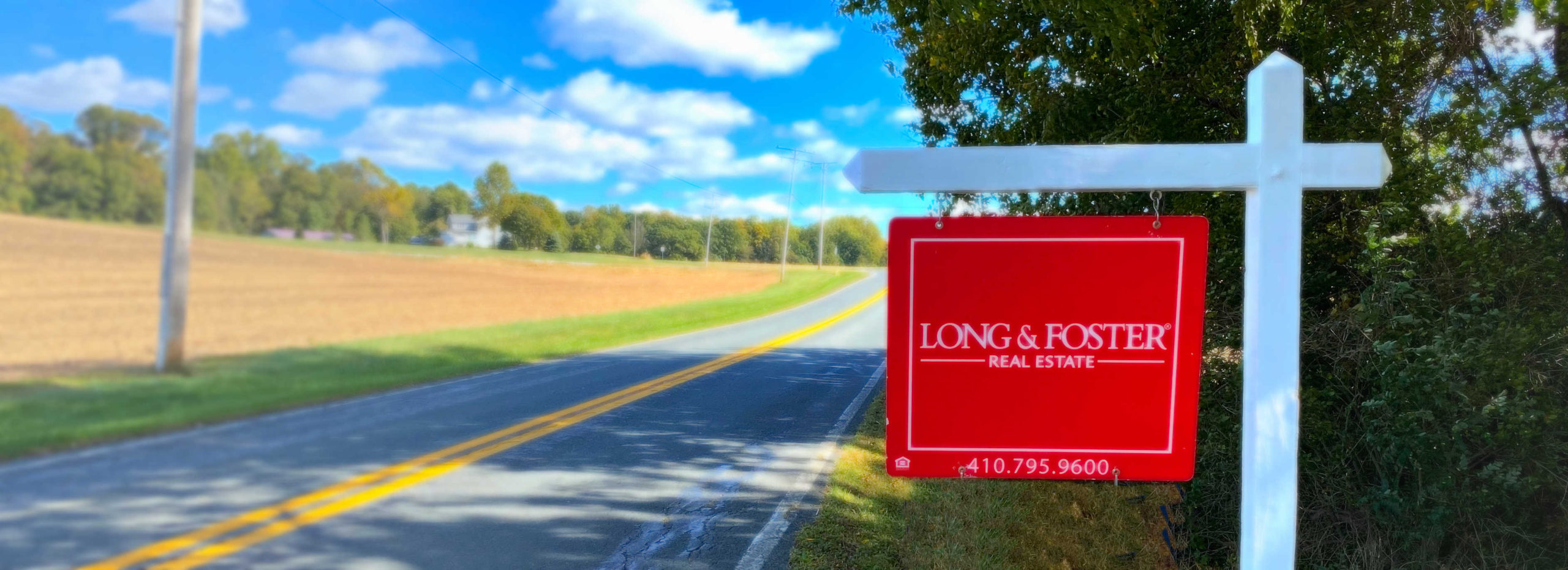 October 25, 2020
October 25, 2020I think it’s time to go home now.
A lady always knows when to leave.
Sipsey, Fried Green TomatoesI sit, watching Fall come to Maryland, watching the trees get sleepy as they prepare for a long winter slumber. I see the beauty of the leaves–yellow, orange, and of course my favorite–flaming red. I’ve lived here for twenty years–a Fall, Winter, Spring, and Summer for each finger and each toe.
I think it’s time to go home now.
Where does a person go when she wants to go home? Where should I go? I don’t quite know. I’ve tried it all–I’ve looked for home as a place, home as a person, home as a feeling. I haven’t quite found it yet, or maybe I did find it and it just didn’t last. Is it meant to last?
I came here twenty years ago, following a job and a dream, and I’m so glad I did. I have loved the people and the places, but like the seasons, they come and go. I love this house that I turned into a home, a place I thought I would stay until I die.
Maybe I did stay until I died. Maybe I have been reborn, into a dream of my own conception. This place has been a dream come true, but also a place of dreaming new dreams. A memory of me will linger here, sitting by the fireplace or curled up on the back porch with a notebook and pen, just as a memory of this place will linger in me.
So where will I go? Perhaps I will follow the wind. Or the sun. Or a road I’ve never taken before. Stay tuned–it will be an adventure.
-
 September 10, 2020
September 10, 2020COVID Contemplations
These days, when my mind summons the word “normal,” all I get is a cloudy haze of what used to be and doubts about the road ahead. But, the local movie theater re-opened last Friday, and I was joyful beyond words to go and once again do something I so enjoy — something I would refer to as “normal.”
Who would have guessed I’d miss the sound of other people crunching popcorn, slurping drinks, and exchanging whispered comments and snickers? It was tremendous, even with only three of us in the theater. It was tremendous to do something besides *wait* and make the best of a bad situation.
I feel like I’ve been doing a lot of *waiting* recently, especially since my novel is currently in copy editing. But isn’t that what many of us are doing? Waiting. Wondering. Hoping. Laughing, perhaps, when we think back to “two weeks to flatten the curve” — not a jolly ha-ha laugh, but the edge-of-sanity cackle that questions whether it would have been better or worse to know the truth from the beginning.
It’s easy to get caught up in the present moment, especially since the present is all we really have. But, when the present moment becomes fearful, it might help to add perspective. COVID-19 is certainly a novel situation, but I’ve lived through other novel times. I’m sure you have as well.
I was born in the 1970s, so let’s fast forward to times I remember clearly. The 1980s brought the AIDS epidemic, ongoing fear of Mutually Assured Destruction in the Cold War, the war on drugs, and a recession. The 1990s brought the Gulf War, the dot-com bubble, the Oklahoma City bombing, and then Y2K. The 2000s brought a collapse of the housing market, 9/11, and the war on terror.
Even some advancements and breakthroughs were pretty scary in the moment. Consider the creation of personal computers, mobile phones, the Internet, and artificial intelligence. Advancing medical knowledge brought serious and frightening possibilities, including DNA analysis, cloning, and mapping the human genome.
Your own list of novel situations may be longer, shorter, or different than mine, but I’m certain we all have one. I’m also certain they will change over time. I hope my own list will continue to anchor me, as we all continue to be inundated with messages about social distancing, infection rates, restrictions, and everyone’s judgements about what everyone else is doing.
Is this the “new normal” we’ve been hearing about? I certainly hope not, but only time will tell. In the meantime, I’m trying to make the most of whatever I have, and I’m thankful to be able to add a visit to the movies to that list.
-
 August 8, 2020
August 8, 2020What’s a girl like me doing in a genre like this?
That’s what fiction is for. It’s for getting at the truth when the truth isn’t sufficient for the truth.
Tim O’Brien“You’re going to write a dystopian science fiction novel, and it’s going to be amazing.” This is now-me, whispering in the ear of me-ten-years ago. Then-me laughs until she cries. And yet, here I am.
Now-me knows something then-me doesn’t. Science fiction, including the dystopian variety, is not defined by the stereotypes many of us hold. You know the ones — technology, aliens, endless techno-babble, ultra-modern societies, more aliens, more technology… But we aren’t all H.G. Wells or Isaac Asimov. Indeed, we are not.
Just because a story is set in the future, or in space, or in an alien land, doesn’t mean that the story itself is about the setting. Evolving Elizah: Initiatum isn’t a story about technology or outer space — that’s simply the setting. No, this is a story about life and death, love and adventure. It’s a story of friends and enemies and family. Most importantly, it’s a story of possibility and imagination, and it happens in an ultra-cool setting.
So why write it that way? Why not write it in the here and now, somewhere and sometime you can already relate to? Maybe I don’t want you to relate — not yet. Maybe, instead, I want you to suspend belief for a little while — belief about how the world works and what it means to live in the midst of the present.
This is the value of fiction as a truth-telling tool. You don’t have to be weighed down by the convictions of your beliefs. Instead, you are free to experience a different reality, a reality that may seem completely irrelevant to the world you live in, until you realize it actually couldn’t be more relevant.
I’m an avid reader, across a wide array of styles and genres. And yet, it’s fiction that gives me hope. It’s fiction that carries me through my toughest times, and it’s fiction that inspires me to be more and do more. Fiction is where I hide when I need to process the world, where I go for comfort and solace. It’s where I look for heroes.
By suspending belief in the world around you, I believe you can see your own world more clearly. Indeed, I have written a dystopian science fiction novel, and it is amazing. I believe this story will mean something to you, just as it means something to me. I don’t yet have a final publication date, but it’s coming. Expect great things, my friends — it’s coming.
-
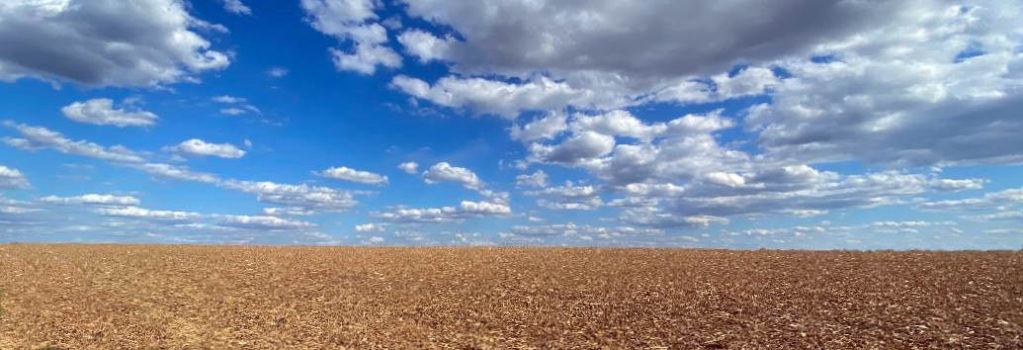 May 13, 2020
May 13, 2020Memoirs with Mom: The COVID-19 Sh*t Show
If COVID-19 has accomplished anything, it has lifted the veil on our domestic situations. In some cases, said lifting has been as pleasant as a duct tape band-aid.
If your household is functional, happy, and loving, you are likely coping from a place of strength, even if you have substantial challenges to overcome. If your household is dysfunctional, abusive, or unhappy, you are probably in hell.
What about my own domestic situation? Well, it needed some tending, for sure. Almost a year and a half ago, I opened my home to an old friend and her two children in an attempt to help her improve her life, an effort that definitely put my own well-being in a precarious situation. When a stay-at-home order was issued in my state, I could no longer deny the pitfalls of gambling my peaceful home for the sake of helping someone else. I stuck it out for about a month before it became completely untenable, and two weeks later we parted ways — ideally forever.
Now I once again have a peaceful home, and my new challenge is to manage the isolation. Ironically, I feel less isolated living alone than when I shared my home with others, but I didn’t have the bandwidth to focus on feeling isolated then. I was too busy trying to survive the dysfunction. Now it creeps up on me, especially in the mornings. And so, like many of you, I do what I can to stay busy.
Since my novel Evolving Elizah is currently undergoing an editorial assessment, I’ve turned my attention to another project — a memoir about my relationship with my mother. I anticipate working on it between other projects, so I don’t expect it to come together quickly. But I know there is no better time to start writing it, because this emotionally and psychologically tumultuous pandemic is the exact same roller coaster I rode in my relationship with my mother.
There’s something oddly harmonious about contemplating her while I struggle with isolation. She isolated herself for much of her life, and she certainly isolated her children. In fact, as I struggled to first understand the reality of stay-at-home during COVID-19, my first terrible thoughts were memories of isolation as a child, and a teenager, and even a young adult — helpless, scary, dangerous isolation.
However, I know that my struggle with isolation now is not the same struggle I survived as a child — because I am a different person. I have a different array of choices, and I have no fear of choosing something that serves me. In fact, COVID-19 gave me an opportunity to prove that I could and would choose something that served me as I dealt with the toxicity of my housemates. It wasn’t easy, but I did it.
I certainly have a lot to consider as I begin to sketch out what my mother meant to me, and what it meant to be raised by a woman who was clearly mentally ill, although undiagnosed. No doubt, this memoir will be a doozie. But hey, I have survived — my mother, this bizarre pandemic, sixteen months of toxic housemates, and so much more! So, why not? I’m ready.
-

I took a deep breath and listened to the old bray of my heart. I am. I am. I am.
Sylvia PlathMomentum builds exponentially, taking me faster and faster, until I’m moving too fast to even be scared anymore. After all, who can be fearful with the wind in her hair and the sun on her face as she flies into the unknown?
Nine years ago, a question wriggled into my brain. Why my brain? Well, it’s an odd brain with odd machinations, and it was ripe for the wriggling. You see, my mind didn’t actually create the idea — not this one, anyway. This one existed in its own right, wanting so desperately to be brought to life that it cast itself onto the winds of the universe to find the right place — the right mind — to settle in and grow. Sometimes the idea chooses us, and this idea chose me.
Like any blossoming idea, it grew in the land of “what if.” In this particular case, the “what if” involved an article I read about Earth’s magnetic field. Did you know that birds can actually see Earth’s magnetic field, and they use what they see as a compass to migrate? What more intimate connection could a being have to the planet? And what about us humans? How are we tied to the planet? The seed of the idea settled into my mind like this — “What if our souls are just as intimately connected to the planet as a bird’s migration pattern? If humans left the Earth forever, would they still have souls?”
And so, that’s how it started — a vision of a woman leaving Earth forever. Who is this woman, and why is she leaving? And most importantly, what happens next? The story began to unfold, which is how it must work since the idea chose me. I began to write — slowly at first because I had many other commitments.
The more I wrote, the more I wanted to write. I used every tool in my toolbox to help this story come to life. Then, when I ran out of tools, I discovered new ones and kept on. By the time I left my 21-year career in civil service, I thought the story was almost finished. I thought it was almost ready to breathe its first breath and enchant you with all its wonders. How could it not be ready? I’d given it so much of me for so many years.
I was riding the wave of the story’s momentum, and it was exhilarating. And yet, I realized rather abruptly that my work had only just begun. I hadn’t yet written the story. This wasn’t failure — just misunderstanding. I’d built a strong foundation to write the story, but the story still needed writing. And so, that’s what I’ve been doing. Fast and furiously, the story has poured out of me at an unprecedented rate — a rate equal to nine years of building momentum. And I think I’m almost done.
I still expect to publish my novel this summer, and I still expect it will be titled Evolving Elizah: Initiatum. Even though I believe the story is written, I still have a lot of work to do between now and then. Proofreading, copy editing, type setting. Publication. Social media platforms. A brand new website. I can’t wait to share all of this with you.
I want you to witness the birth of this story, to feel the rush of air as it takes its first breath and greets the world. I can’t wait for you to meet the characters, especially the main character Liz. She is worth knowing, and you are worth knowing her. I am privileged to tell her story, and honored that she chose me to tell it. She’s as real as anyone else in my life, and in your life she will be as real as you want her to be, or as real as you let her be. I hope you’ll let her be real.
Stay the course, and I will tell you a story — a story of life and death and love and adventure, a story of friends and enemies and family, a story of possibility and imagination. Stay tuned, my friends. There is so much more to come.
-
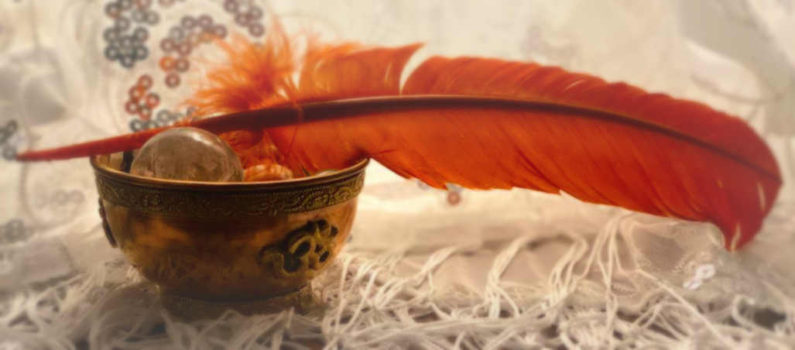 December 3, 2019
December 3, 2019The Genre Club: Trials and Tribulations of a New Author
The outcome cannot matter.
Elizabeth Gilbert, Big MagicI am doggedly slogging toward a 2020 publication of my debut novel, currently titled Evolving Elizah: Initiatum. My biggest obstacle? Me.
I recently shared a complete draft of the manuscript with a couple of industry experts — an editor and a marketing advisor. I need their help, you see. I want my novel to launch like a rocket — better yet, like the space-farm turned deep-space-voyager where Evolving Elizah unfolds. I know I can’t do that alone.
I expected to feel nervous as I wait for their feedback. It’s tough to offer up the work of my heart for critique by strangers, knowing they don’t love it the same way I do. For me, this story is essential, and my heart now beats in time to the rhythmic melody of keystrokes as we bring each other to life. Of course, it’s good that these consultants don’t love it like I do. That’s why I asked for their help, right?
Here’s the part I didn’t expect — a whirlwind of anxiety chased by a monsoon of fear, all unleashed by a simple and relatively inconsequential question.
“What genre is this?”
Oh, dear.
I thought I knew. I thought I’d settled on Young Adult. But, is that right? Science Fiction, maybe? Dystopian? Dystopian Young Adult Science Fiction? Is that a thing? What if I get it wrong?
All of a sudden, I’m back in high school. Did I dress for volleyball when I should have been planning for chess club? Can I go home now?
For whatever reason, life’s stressful moments often transport me back to some terrible childhood experience.
In this case, it isn’t a question of volleyball or chess club — I did neither in high school. In this particular case, I’m standing in a high school classroom holding a brown jumbo-sized well-used plastic margarine container. Well-used? Oh yes.
The bowl retained enough identifiable print to confirm it’s initial purpose of storing margarine. The lid, which at one point fit the bowl like a glove and matched the design, could now only be identified as belonging by the same brown color. As was typical in our household, it was warped, contorted, and worn by repeated exposure to harsh circumstances it was never intended to endure.
What was in the bowl?
Prior to entering a room full of my peers, I would have been proud to tell you. It contained my own recipe, one we ate at home several times. It was a goulash-like invention, the tangible conclusion of hours I spent in the kitchen trying to create enjoyable fare using nothing more than my own creativity and whatever my non-cooking mother happened to have on hand in the pantry.
I was proud of my effort. I found it substantially better than anything my mother would have prepared — the microwaved scrambled eggs, which somehow always ended up cornflower blue, or the broiled meat patties, prepared on a baking sheet in the oven. It was better than Hamburger Helper, or the alternative she’d make when it was time for “something different” — Tuna Helper.
So what’s the problem? I did great, didn’t I?
My mother hated cooking and loved overused, exhausted, tormented plastic food containers. These were minor eccentricities in my highly eccentric family. Despite these problems and despite my age, experience, and lack of control over my environment, I discovered a way to make something good.
I could have had a good laugh with my classmates about that pathetic bowl. Guessing the number of times the poor thing had been microwaved, dishwashed, and refrigerated would have made an awesome party game. I could have recounted my adventure, scrounging for ingredients and experimenting in the kitchen. But my levity had long-since absconded with my composure.
My anxiety mounted and then surged as I had another realization. Next to everyone else’s tiramisu, cookies, pastries, hors d’oeuvres, anitpasti, and other sophisticated snacks, my goulash bore a shocking resemblance to regurgitated dog food. No one said anything about it, but no one had to.
To me it was obvious. They were normal. I was a fraud trying to pass for normal.
My family was about as far from normal as a person could imagine. My mom was certainly mentally ill, although never diagnosed. My father was prosperous, but most of my clothes were hand-me-downs. My sister and I shared shoes that were either too small for her or too large for me because we didn’t wear the same size.
We didn’t need to save old margarine containers, or microwave and dishwash them until they melted into toxic waste. Yet, it’s what we did. We hoarded them. One tug on the wrong cabinet door and a sea of old plastic food containers promised to spill out, just like our family’s secret dysfunction.
Standing there with my peers, I had just tugged that cabinet door, and I was ankle deep in the refuse of my desire to fit in.
I tried to hold back tears. I tried to dissolve into the nothingness of some dark abyss. I don’t think I was successful on either account, but truthfully I don’t remember. The part I remember clearly was vowing I would never humiliate myself like that again. I would never let my peers see how strangely different from them I was. I would never let them see how inadequate I was. I wouldn’t let them see me as a fraud.
So what genre is my novel?
Does it even matter? The part of me that stood humiliated with my goulash — my goulash that no one criticized except me — thinks I should simply throw the whole thing away. It’s too risky. Forget about this crazy authoring scheme. Get another office job. There is so little vulnerability in a job like that.
Luckily that wounded part of me has no control over my motor skills, nor does it know any of my passwords to traditional online hiring platforms. My novel is safe, and I’m simply going to have to wait this one out.
I belong somewhere. My work belongs somewhere.
It’s a matter of finding the right label. That’s all it is — a label to help me connect with the specific readers who will love my book. It’s simple enough, but it sure isn’t easy.
Michele Laine once told me that we never truly conquer our fears, but we can get better at dealing with them. It’s clear to me that my fear of belonging nowhere remains unconquered. I struggle with my different-ness. I struggle to appreciate my talents. I struggle to love myself. Some battles I win, others I lose. Right now I feel like I’m losing.
And yet, my heart still beats in time to the rhythm of my keystrokes.
In the grand scheme of things, finding my genre is fairly inconsequential. The process continues. My writing continues. The outcome doesn’t matter, even though I know it will be great. Keep moving, people. Keep moving when you’re afraid and when you feel ridiculous. Most importantly, keep moving when you are vulnerable. I’ll do the same, and we’ll just see…
-
 October 1, 2019
October 1, 2019A circle of life, in the ago
I had heard the old Indian legend about the red fern. How a little Indian boy and girl were lost in a blizzard and had frozen to death. In the spring, when they were found, a beautiful red fern had grown up between their two bodies. The story went on to say that only an angel could plant the seeds of a red fern, and that they never died; where one grew, that spot was sacred.
Wilson Rawls, Where the Red Fern GrowsShe and I, her and me — never her and I, or she and me. Always us. She was a retired English teacher. I was a West Texas girl — 7, then 8, then 9 years old. She happened to be my grandmother, but that wasn’t all she was to me.
She was a goddess, a larger than life being who descended upon me wrapped in a veil of wonder. Although, technically she didn’t descend. She never descended. I ascended to meet her — high above the clouds on man-made wings.
Who knew San Francisco was a backdrop for idyllic childhood summers?
My sister and I visited her for a month each summer. Far away in that mystical land called San Francisco, we saw and experienced things beyond our wildest imagination: the ballet, China Town, wine country, hair salons, chop sticks, the Golden Gate Bridge, the Presidio.
We worked in her medical office for an hourly wage, filing folders, cleaning, making copies, and developing x-rays. We saved our pay for things we wanted to have or do. She taught us about money and poker and cooking. She shared her love — love of food, adventure, friends, entertaining, flowers, gardening. She shared her love of us as well — to us, for us, with us, about us. Her love was different from any I’d ever known.
She knew the richness of words and language and stories, and she read to us every night. My sister and I would nestle in our bunk beds while she read a chapter from a book she chose. I remember Where the Red Fern Grows most clearly.
She taught me how to type and also helped me get my first typewriter. “You pay half, and I’ll pay half,” she said. With those seven words, she transformed the impossible into possibility.
She taught me about gardening — how to grow and tend other living things, to help them find their place and become something beautiful, something useful and nourishing.
So, what do you get when you drop West Texas children into the heart of San Francisco?
It’s an adventure, but it ain’t always rosy. Except… “Ain’t ain’t a word, and I ain’t going to say it.” That’s what she’d say. That’s what she’d make us say whenever we used “ain’t.” We recited that sentence a lot, my sister and I.
Poor grammar wasn’t the only difference between San Francisco and two West Texas girls. We froze in the cool summer temperatures, wearing our heaviest coats while the natives tromped around in shorts and flip flops. She would chide us for fighting, for the way we spoke, for our lack of gentility. Her friends would laugh at our thick accents, which they found cute but impossible to understand.
She tried to improve us, teach us the details of table manners and place settings. She exposed us to cultures we never knew — cultures of time, geography, and affluence. She tried to help me understand that how a word is spelled is often an indicator of how it should be pronounced. She tried to help us align ourselves to success in a world even more immense than the vast nothingness we knew as home.
She was a gardener, not just of plants but a tender of souls.
She took her seeds, wrapped in hope, and nestled them deeply into my being. She planted whispers of possibility in me, ideas and experiences that could and would lead me far beyond what I might have otherwise been. Yet, at least one of the seeds grew into a suspicion, and then a notion, and then a belief that my sister and I weren’t good enough. We were backward in her eyes, but — at least at that time — we were the only grandchildren she had. So she kept working on us.
Each summer ended. Each visit closed. Each seed grew, and the family grew as well. New children eventually came, and just as quickly as their doors opened, ours closed.
It was hard to be overlooked by someone who meant so much — someone to whom I thought I meant so much. But her new grandchildren were bright and new. Their gardens needed planting, their souls tending. I knew that she loved us still — her first grandchildren — but as grandmother, she was gone. I went my own way, with everything she had infused in me as a touchstone for my own dreams.
She became someone else’s grandmother, but I never let go of the line that connected my heart to hers.
Sad? I used to think so. I didn’t see the gift in this for another twenty-five years. It was a slow blooming gift, but more beautiful for the wait. You see, in relinquishing her role as grandmother, yet loving me still, she opened a new door — a place where we could meet not as a grand-mother/child but as two women.
Apart from her personal pain-body, every woman has her share in what could be described as the collective female pain-body… This consists of accumulated pain suffered by women partly through male subjugation of the female, through slavery, exploitation, rape, childbirth, child loss, and so on, over thousands of years.
Eckhart Tolle, The New EarthIt took time for me to understand that the knowing and affirmation she gave me as a woman was even more powerful than tending my garden-soul as a child. Yes, she planted seeds of strength and possibility in my childhood. Yes, those seeds grew into a forest canopy under which I sought refuge from the worst storms in my life. Yes, it was a forest of strength, fortitude, and belief.
But as a woman, she allowed me to see a lifetime of pain that she never belabored, and would never share with a child.
She weathered her own storms, many of them fierce. She survived a marriage to a man who disgraced her again and again, and another to an alcoholic whose affliction was ultimately his demise. She survived a divorce in a time and place where it wasn’t widely accepted. She raised four children, planting them into this world with roots that only she could give them, tending their souls amidst her own chaos. She stood firm again and again, rejecting what was unacceptable and embracing what was love. She made her decisions and walked in them with her head high.
When times were hard, she’d say, “It is what it is.” When the difficulty passed, she’d say, “It’s in the ago,” to remind you that it was gone. She carried her body of pain with grace, acceptance, and determination. By sharing her experiences and wisdom with me, she showed me that I could do the same. The seeds that she planted so long ago are now nourished by the light of her wisdom.
At the end of her life, I’m not sure she was ready to let go.
Her mind and soul seemed ready and eager to keep breathing and learning and doing this adventure called life. But her body failed her. I believe she knew she had nothing to fear. I believe she knew the parts of us that matter are eternal. The rest is a brief flash of color, and then in the ago. It is what it is, right?
The day that she died, a beautiful baby girl came into the world. A good friend of mine became a grandmother to this baby. One thing ends, another begins — because it never *really* ends, it just keeps going.
I know my grandma isn’t gone. She’s just in the next place, breathing and learning and doing the adventure that comes wherever we go next, and possibly — just possibly — planting some red ferns in this one.
I know she’s keeping a close eye on all of us.
In a few weeks, I will converge with friends and family to celebrate her together one last time. I know she’ll be pleased with such a good party. At some point, my own spirit will retreat to deal with its sadness, under the forest canopy she helped me plant where I’ve weathered so many storms. I know she’ll see that too, and I believe she will understand.
When I emerge again, I’ll make my decisions and walk in them with my head high. I’ll stand firm, dismissing what is unacceptable and embracing love. I’ll continue breathing and learning and doing the adventure called life, and I’ll be grateful for everything she gave me. The rest will be in the ago.
-
 September 2, 2019
September 2, 2019Walkabouts and wanderlust: Part 1
How frail the human heart must be — a mirrored pool of thought.
Sylvia PlathAfter almost 22 years of service, my last day at work was anticlimactic. The tasks that needed doing were done, and the only thing that remained was turning in my identification and equipment. It was over.
I chose this path. I resigned. I could have made other choices. I knew this path was the right one for me — necessary, but “right” choices can be the hardest of all.
My heart was a sea of pandemonium, ragged with the chaos of too many battling emotions.
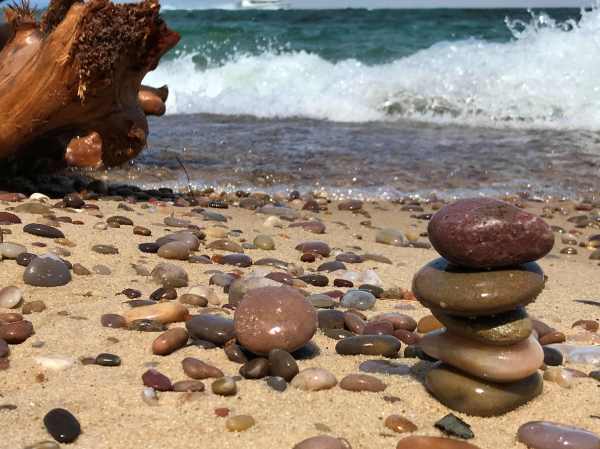
Lake Superior, Michigan I felt it coming — the struggle against fatigue, depression, and anxiety. So… I did what I do. I planned an adventure.
I’ve read about this thing called green therapy, but for me (and I’m sure many others) it’s instinctual. I retreat somewhere wild when I experience life events that require processing. As a child, I climbed trees, visited animals, or — if I was fortunate to be somewhere dripping with beauty — sit quietly and take it all in. Now, as an adult with the power to choose my surroundings, this need to retreat manifests into travel.
I spent the remainder of that Friday — my last official day of work — loading up the car. Being a free-spirited adventurer, I sometimes find myself lacking travel companions. Not this time. I was blessed with the company of my sweet Crash, the most well-traveled dog rescued from the streets of Baltimore I know. We started driving at 2:30 a.m. the following morning.
Destination: Northern Michigan
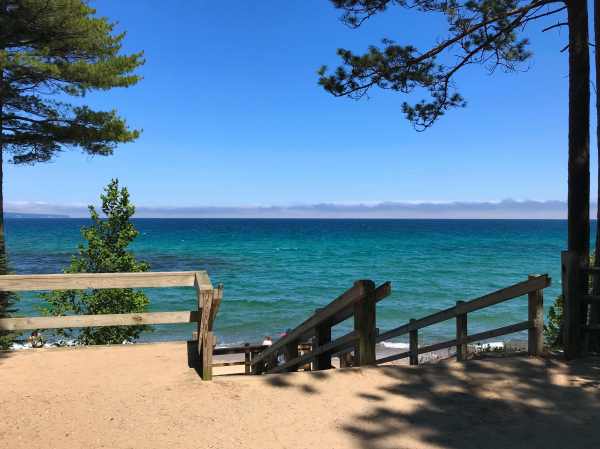
Pictured Rocks National Lakeshore, Michigan I drove and drove (over 1,100 miles) to a campsite reserved in my name outside Munising, Michigan.
Realities I discovered on Day 1:
- Crash is not meant for the backseat. He rides shotgun.
- I am amazingly efficient at setting up a campsite by myself. No one can prove otherwise.
- The welcome wagon in Northern Michigan (the Upper Peninsula, or U.P.) consists of a crushing horde of large mosquitoes.
- The Great Lakes are breathtakingly beautiful. I find them as beautiful (although not nearly as warm) as any Caribbean water.
- The U.P. is an excellent place to unplug from technology. In fact, it’s not a choice. Obtaining a cell signal is the exception, not the rule.
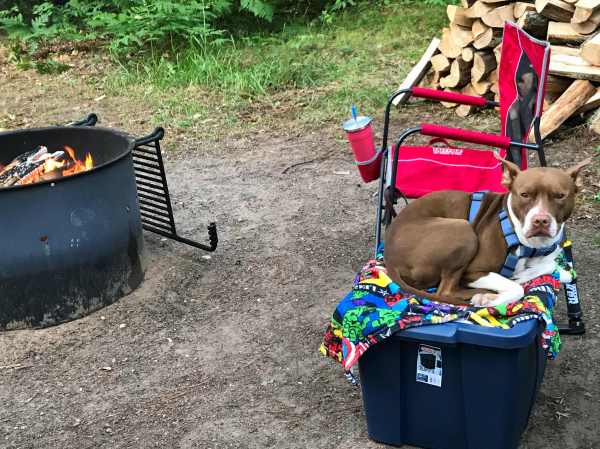
Crash does not rest in the dirt. Period. We stayed three nights at our campsite, pondering life by the fire at night, touring the National Lakeshore by day, and exploring water.
Water knows no bounds in the U.P. It falls from the sky… and the rocks… and the trees. It wanders between streams, marshes, and ponds, oblivious to anyone’s expectation of where it belongs. It seeks its own company, flowing to the Great Lakes as it chases the echo of water that came before. It dominates the landscape, and yet it’s also hidden — beneath tall grass and among the looming trees of the thick forests.
The symbolism of water is hard to ignore, especially on a trip like this.
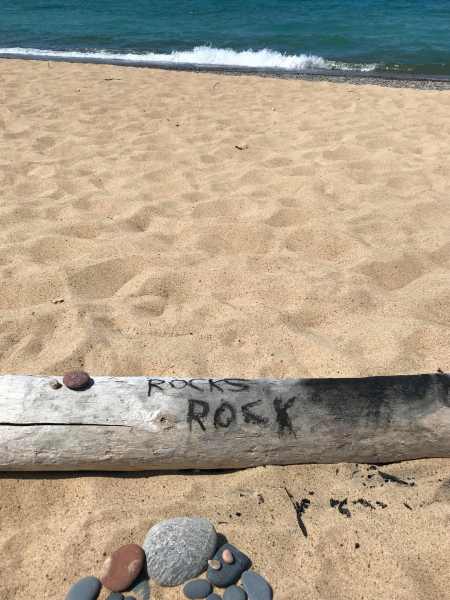
Words of wisdom, from travelers before Water cleanses. The repetition of its dripping, lapping, and bubbling can soothe us, if we let it. Water embraces and envelops us instantly, transforming our world from an empty air-filled experience to a thick, wet, wonderful but potentially suffocating cradle. It’s beautiful, restorative, and potentially deadly all at the same time.
What else can do all of this besides water? No wonder Crash is afraid when he gets too close to the waves. Perhaps he is awestruck by the gravity of what all this means. I’m not ready to think about what it means. I’m only capable of losing myself in the present moment. The bigger picture is too much to bear.
These observations remind me that life is a journey. It can’t be seen or known by a passing glance. It must be explored, discovered, and observed. It must be done so with reverence, or the meaning will be lost. It can be messy, tiring, and frustrating at times. But, the *knowing* is achieved through *doing,* which isn’t easy.
One night, we returned to the shore of Lake Superior, hoping to see the Northern Lights.
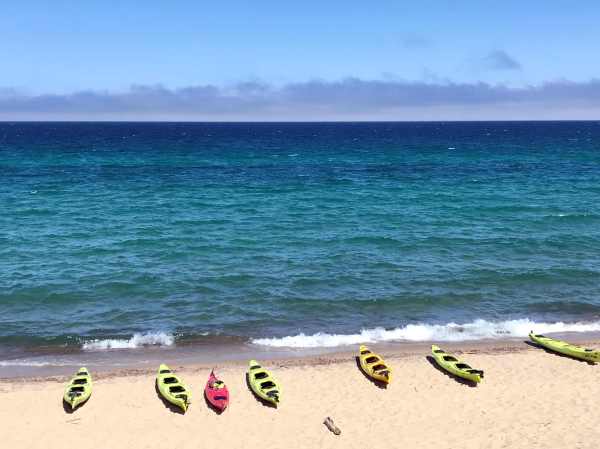
Ocean kayaks, ready to brave Lake Superior The sun didn’t begin to set until well after 9 p.m., but I waited on the sand — wondering if I would get to check the Northern Lights off my bucket list. I hadn’t come for that purpose — I didn’t think it was possible that time of year, but a woman in town hinted that they might be visible, even in the summer. So I waited with hope and growing expectation.
By 12:30 a.m., I decided to call it a night. Crash had long since given up and complained so much about the sand and the water — and the cold breeze — that I took him back to the car to rest in solitude until my waiting and wondering came to a conclusion.
I did not see the Northern Lights, but don’t interpret that as disappointment.
My eyes, and my mind, were inundated. Blinking satellites slid smoothly and rhythmically across the sky. Meteor showers burst across the sky in fits and starts. Then there were the stars, ever-present behind it all. I was reminded that there are exponentially more stars in the sky than problems in my life.
Like many good things, all these stars are outside the scope of my vision most days. Sometimes I can’t see them; they are obscured by light that is closer and more intense. Other times I choose not to see them; I’m not looking up. But at all times, I must gather strength from the knowledge that they are there. Some circumstances can only be endured by knowing that there is much than we can see in the moment.
We returned to our campsite for one final sleep before packing up and moving on.
What happens next?
South Dakota happens next, which is another story for another time. South Dakota — although permeated by an impossibly sweet and intoxicating smell — is not saturated with water. I’m not quite ready to move on from the water yet.
It’s true that water cleanses us, sometimes by washing away and sometimes by dissolving. I wish it were as simple as jumping into the water and coming out clean — refreshed. If that were the case, I would dive into Lake Superior head first, welcoming the shock of the cold water, which I expect would be agonizing until my body started to lose feeling.
Yet, I continue to discover that deeply rooted beliefs and problems cannot simply be rinsed away. Twenty-two years of repressing, resenting, and enduring, as well as rejoicing, achieving, and celebrating, cannot be spontaneously washed away. I must dive into the water again and again, each time coming up a smidge less varnished, a little less entangled with that image of who I am supposed to be instead of who I am. I must purify, forgive, and accept — and then do it again and again and again. I must be patient with myself. I must have faith that I will get where I need to go, not only with my life and my heart but also my understanding. I’m working on it.
-
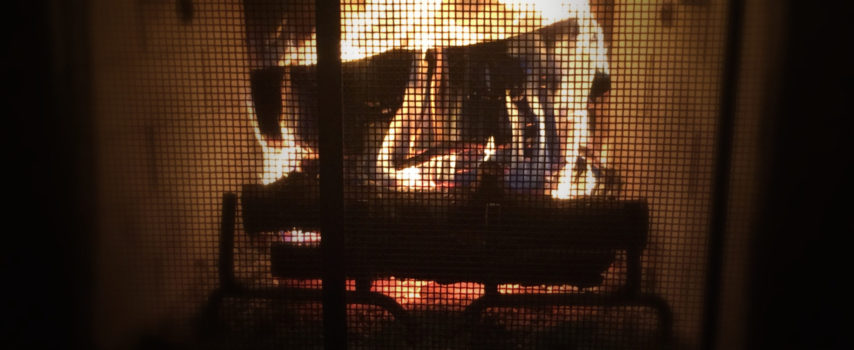 January 17, 2019
January 17, 2019Reflections and memories of snow
It snowed a few days ago. I sat and watched it in my warm, cozy, comfortable house, drinking coffee in front of a warm fire. It was beautiful, peaceful. I live in the woods — amongst the huge pines I love. Gazing out on the snow covered trees, I could convince myself I was just about anywhere. But I don’t need to. I’m happy here. I have come to love the snow. However, it hasn’t always been that way. The memorable snows in my life are memorable for so many different reasons.
Until the 1980s
As a child in West Texas, we never expected snow. In fact, I wasn’t sure if winter with snow was a real thing. It seemed like a fairy tale to me. But I do remember one time when it snowed, and my sister and I couldn’t wait to play in it.
It was only a couple of inches, but we tried to build a snowman. We gathered and rolled up all the snow from across the yard picking up sticks and grass and everything on the ground below to get every piece of snow we could for our snowman, which turned out to be rather small given what we had to work with. We would get cold and go inside, and each time I was convinced that we were in for the night. It was time to get cozy and warm, so I would run a warm bath and get nice and cozy in my pajamas until my sister inspired me to go outside again. Eventually my mom got quite irritated with the number of baths I was racking up that day, and so the fun ended. Rather abruptly, as was her style.
Snow was more than a one-time wonder in my childhood, however. We used to drive from West Texas up through the panhandles of Texas and Oklahoma, and to a small Kansas town where my mother’s parents lived. The car trip felt interminable as a child, but we went for Thanksgiving and Christmas several years. Some of those years involved snow, more snow than I’d ever seen. More than enough snow to make a snowman. My sister and I would go out and play, and my grandmother would fit us with plastic bread sacks over our shoes held up with rubber bands close to our knees to keep our feet dry. She was a Depression-era woman, and let’s just say she was very resourceful.
Fast forward through time and space… (1993-1994)
I’m a woman. I’m a child. I’m an 18-year old married woman-child. My man-child husband and I travel north, to Missouri, where he is stationed at Whiteman Air Force Base. Missouri was so beautiful during the fall, but then the winter came. The possibility seems increasingly likely that I have unknowingly died and gone straight to hell — a frozen, never ending, subzero hell. I have never been so cold in my life. The only thing more inhospitable than the Missouri winter is my ill-fated marriage.
In the present moment
I can appreciate how the snow makes everything beautiful. It glistens in the air like glitter. It covers the frozen sleeping trees and earth under a mystical blanket. It is cleansing — cathartic. The cold air freezes impurities in the air, as well as the overpopulated insects. It gives me a chance to make a fire in my fireplace and bask in the heat of the glow as my mind and body slip into some level of hibernation.
Kansas City, Missouri (1996)
In the years I lived in Missouri, I never got accustomed to the snow. Of course, there was more to it than just snow. Midwest winters are rough. There is at least as much ice as there is snow, the temperature fluctuates insanely, and the wind can be so fierce it literally knocks you off your feet. I struggled against it as I struggled against so many other things in my life.
I see myself driving the treacherous roads to get to a job I can’t afford to lose. I see myself walking to college classes when I am eight months pregnant. I see myself frustrated and angry when I get stuck on the road at the bottom of my apartment complex and I have to wade through the drifts with my big pregnant belly to get to my apartment. I finally make it home and throw myself on the bed crying, not sure how I’ll get my truck up the road or how I will raise a baby, fathered by a man I barely know that I met a only a few weeks before I got pregnant.
In the present, with all that behind me…
I have learned a lot about snow. I can predict with fair accuracy whether the accumulation will stick or melt. I know it insulates itself against the sun and the heat, so well in fact that huge piles of snow will last for months. I know that dry snow blows around quite a bit but isn’t as slippery as the wet snow. It’s good for skiing and playing with puppy dogs but not so much for snowballs or snowman. I have learned that man-made snow isn’t really like snow at all. It’s more like shaved ice.
I know that most snows can be overcome with 4-wheel drive, and that anything less than 6 to 8 inches is not worth the effort to get the snowblower out. I know that the process of clearing snow should be done with the understanding that refreeze is so much harder to navigate and clear than the original snow.
Baltimore, Maryland (February 2003)
My parents come to visit for Valentine’s Day and get snowed in — for a week. Over 2 feet of snow falls from the sky. We learn together that cities were not built for snow — at least not this one. There is nowhere to put it. The city literally has to bring in huge dump trucks and truck the snow out to a location where it can be piled or melted.
I am living with my 6-year old son Austin in a row home I bought renovated. It is a quaint and beautiful home, just across the street from Patterson Park, and it works well with my quaint and picturesque life. In our unanticipated family retreat time, we all trek down to the park with Austin bundled up in his warmest clothes and hunter’s cap to sled down the tall hill with the pagoda on the top. All the neighborhood kids are there. Austin has a plastic snow saucer.
Unbeknownst to me, my mother has sprayed the bottom thoroughly with Pam cooking spray, and with a slight push from her Austin takes off at rocket speed down the hill flying off a snow ramp, separating from his snow saucer onto his own flight path, into the snow where he gets the wind knocked out of him. He later reports thinking he was dead. He’s now scared to sled again, and although I’m peeved at my mother for her part in this, it’s a wonderful day — forever burned in my memory with me standing at the top of the hill by the pagoda watching Austin fly down like a rocket with the ear flaps of his hunter’s cap flapping furiously like wings.
Now (not then)
I love the seasons in Maryland — we get all of them. Summer, Fall, Winter, Spring. Early spring, late spring, late summer, early fall. The winters can be snowy and every 3-5 years we get at least one big snow storm. When I turned 40 I learned to snow ski, and I’ve found that to be challenging but tremendous fun.
I’ve learned a few things about staying warm in the snow, all rooted in staying dry and layered. To the extent possible, I’ve found natural fibers to be the best — wool, cotton, down. More important than the thickness of your coat is how many layers and air pockets in your clothes do you have to retain your body heat? Can your skin breathe so you can be comfortable if and when you start to sweat?
Manchester, Maryland (February 2010)
Snowmageddon! A winter storm dumps over 2 feet of snow on us, and the wind blows it in even bigger drifts across the driveway. Austin is 13, and we live in an old country farm house on 3 acres. It’s a sturdy house, about 100 years old, but not exactly conducive to modern living. We freeze all winter, lucky if we can maintain a 55 degree temperature inside, and I wake up extra cold one morning to discover that the front door has blown open. The wood floor in the living room is frozen and covered in a large pile of snow. Austin gets up, and we do our best to get the snow out of the house. The old thin door has swollen in the moisture, and I have to beat it with a hammer to get it closed.
Later Austin and I start clearing the driveway with snow shovels. It’s all we have to work with, except each other and a frozen swollen front door. It’s a tremendous amount of work, tiresome, frustrating, and meant for a snowblower or plow — not 2 shovels. But it’s still good, partly for what we have — a roof over our heads, warm clothes, two snow shovels — and partly for what we don’t have, which is anyone else there to hurt us. We got rid of those people already, for what I hoped was the last time.
Outside Westminster, Maryland (now)
I have two covered porches, and I use them all year round. The porches are high on the long list of things I love about this house. After almost 20 years of living in Maryland, I have adapted to the cold. I bundle up in a blanket (no heavy Arctic gear required) and sit on the outdoor sofa, either watching the snow fall or looking out to where it has fallen. I see deer and cardinals going about their business in the snow. They are beautiful, and I hope they are happy. I am. I am wiser. I am stronger. I am more capable than ever. Whether I sit alone or whether I have the company of friends or family, I am at peace.
